RESOURCE TYPE
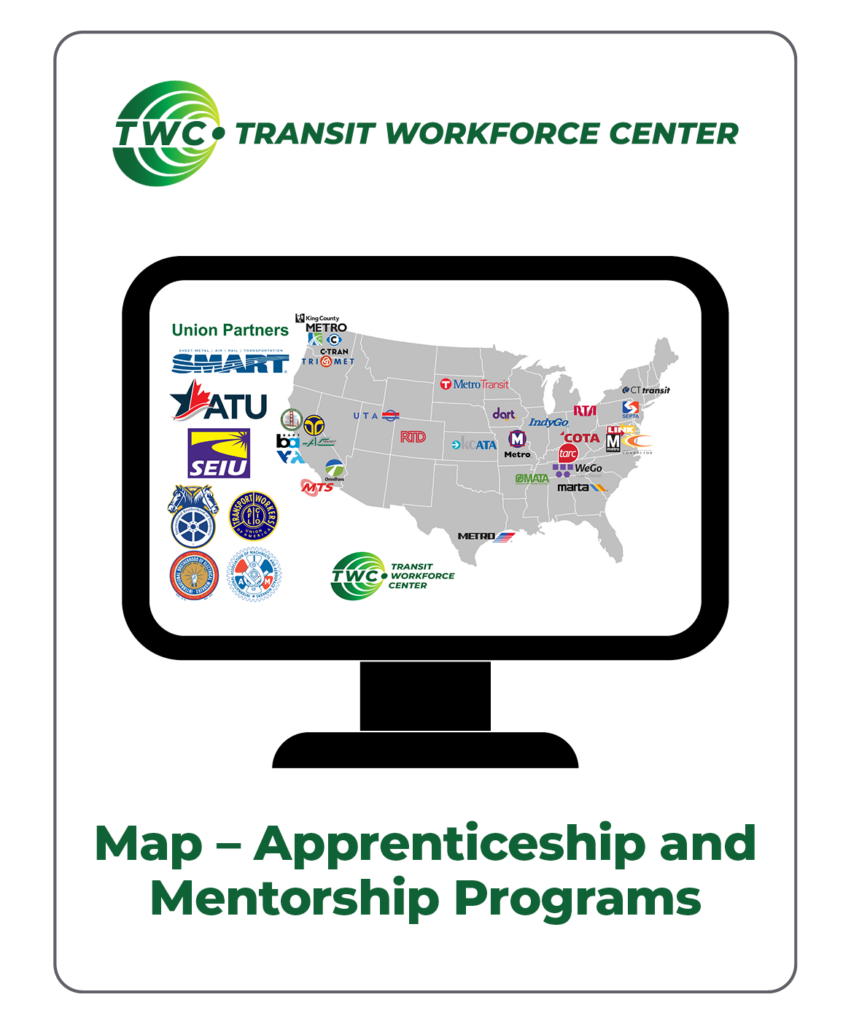
Map – Apprenticeship and Mentorship Programs
Visualizing the Growing Trend of Registered Apprenticeship in U.S. Transit Agencies
Over the past 10 years, the U.S. Department of Labor (DOL) and other federal agencies have invested heavily in promoting and supporting registered apprenticeship, resulting in a significant expansion of registered apprentice programs across the country. Likewise, the use of registered apprenticeship for frontline public transit occupations has increased significantly, with many transit agencies and their corresponding unions jointly adopting labor-management standards that create a framework for apprenticeship. Only five transit agencies had a registered apprenticeship program in 2013, compared with 30 transit agencies in 2023.
This map displays transit locations with registered apprenticeship or mentorship programs. Users can reveal information about the active apprenticeship/mentorship programs at each agency, the agency’s workforce-related statistics (such as wage, employee count, labor hours, and ridership), and links to Standards of Apprenticeship, which include details about qualifications, wages, hours, and training schedules.
Transit Workforce Center
September 2024

Public Transportation Agency Safety Plan (PTASP) Technical Assistance Center (TAC)
Federal Transit Administration
August 2024
TOPICS: Policy and Planning , Safety and Health
The Public Transportation Agency Safety Plans (PTASP) Technical Assistance Center (TAC) provides comprehensive technical assistance to help the transit industry meet PTASP regulation requirements, as outlined in 49 CFR part 673.
The TAC:
- Provides one-on-one technical assistance
- Facilitates training and peer-sharing via live webinars and roundtables
- Conducts voluntary technical reviews of draft Agency Safety Plans
- Maintains a resource library with technical assistance tools.
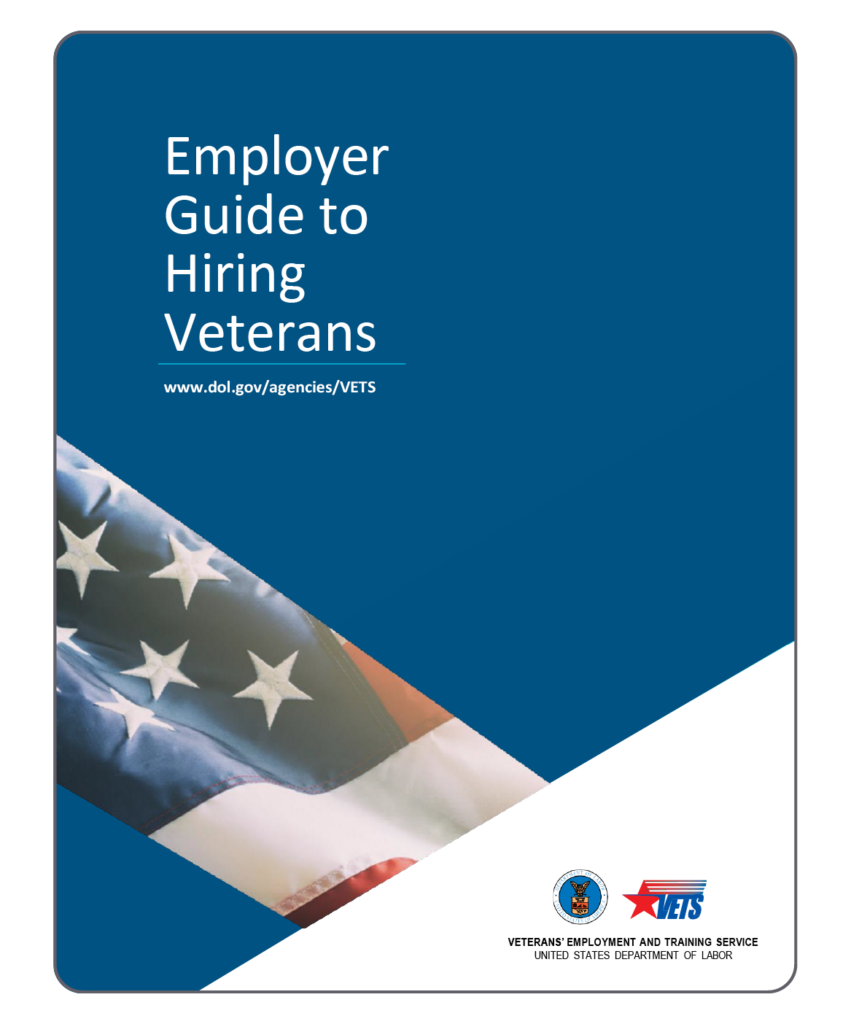
Employer Guide to Hiring Veterans
Employers recognize the value veterans bring to the workplace but often find it challenging to connect with separating service members and veterans seeking employment. Veterans are in high demand, so it requires dedicated efforts by employers to find and hire veterans.
This guide intends to:
• Provide accurate information about service member and veteran demographics.
• Share federal, state, and other resources with employers to facilitate veteran employment; and
• Make recommendations on how to attract, train, and retain veterans.
United States Department of Labor
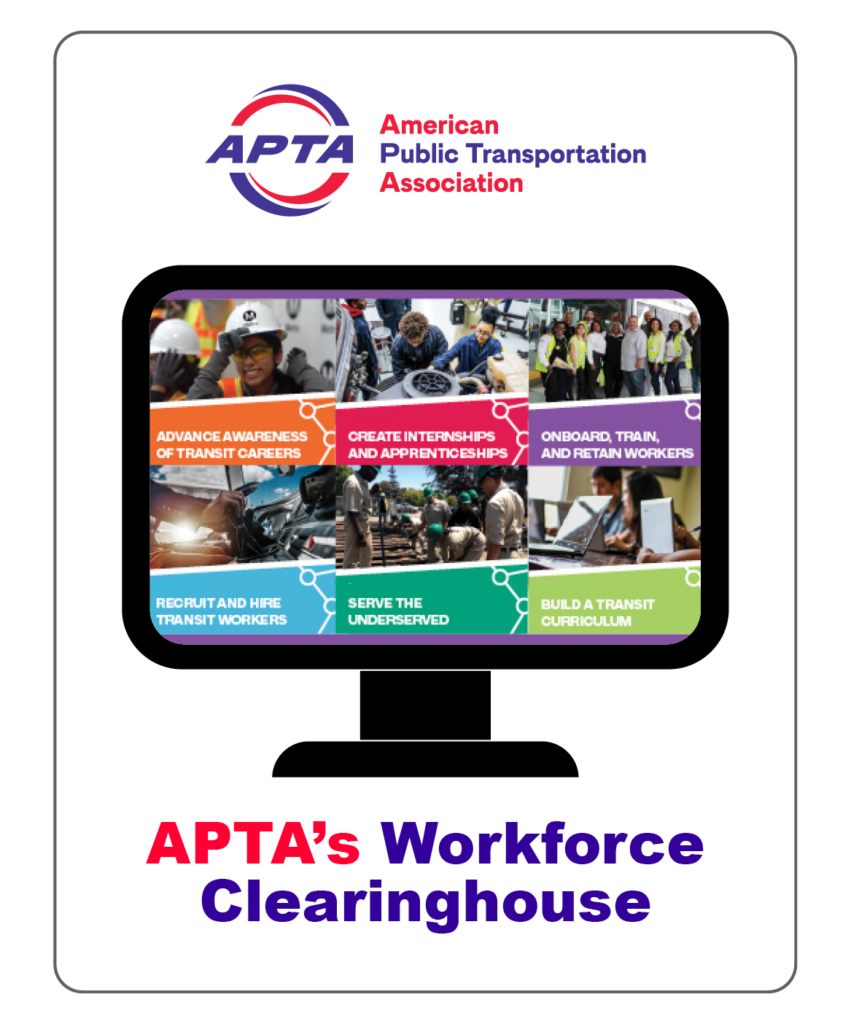
APTA’s Workforce Clearinghouse
APTA’s Workforce Clearinghouse connects users with convenient access to industry materials, stories, and recommended practices. Use the search bar or choose a categorical grouping to find resources from APTA’s six ‘Workforce Mini Guides’ as well as selected examples from the initial workforce volume – APTA’s Transit Workforce Readiness Guide.
American Public Transportation Association (APTA)
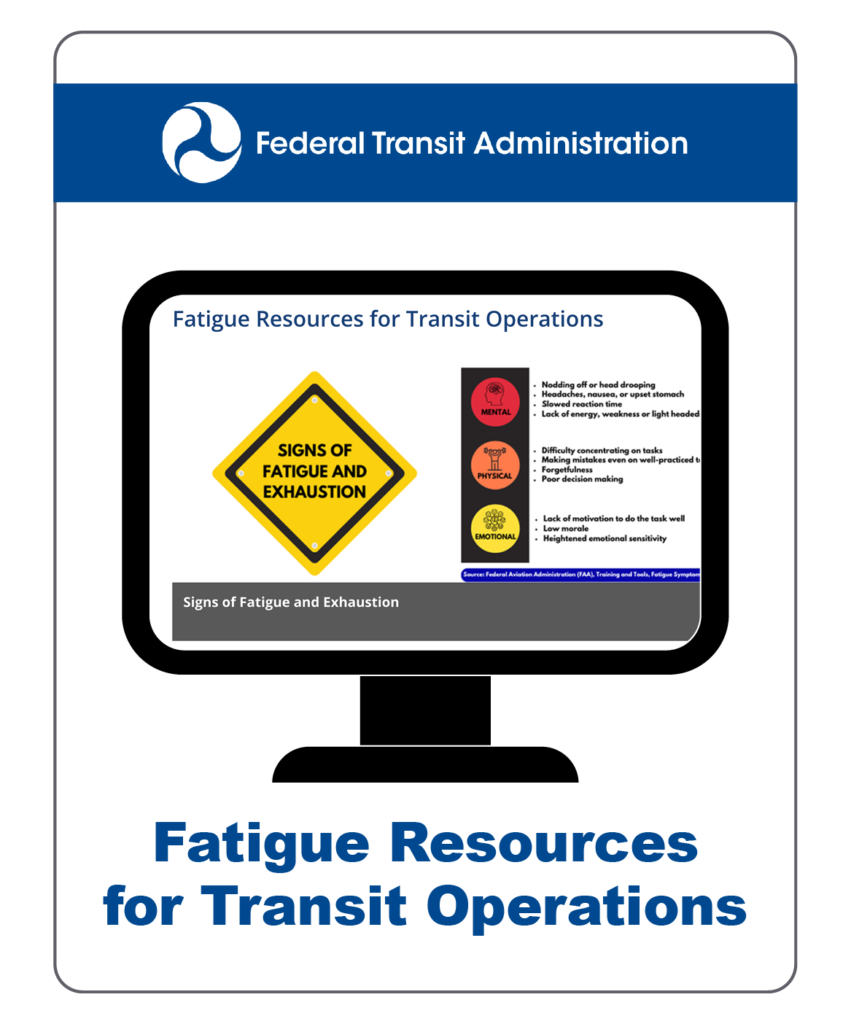
Fatigue Resources for Transit Operations
To support the transit industry, FTA has compiled resources that can be used to better understand fatigue and fatigue-related issues in the workplace. The site includes resources about understanding sleep, causes of fatigue, symptoms and warning signs, effects, relevance to transit workers and agencies, and fatigue risk management systems.
Federal Transit Administration
TOPICS: Policy and Planning , Safety and Health , Training
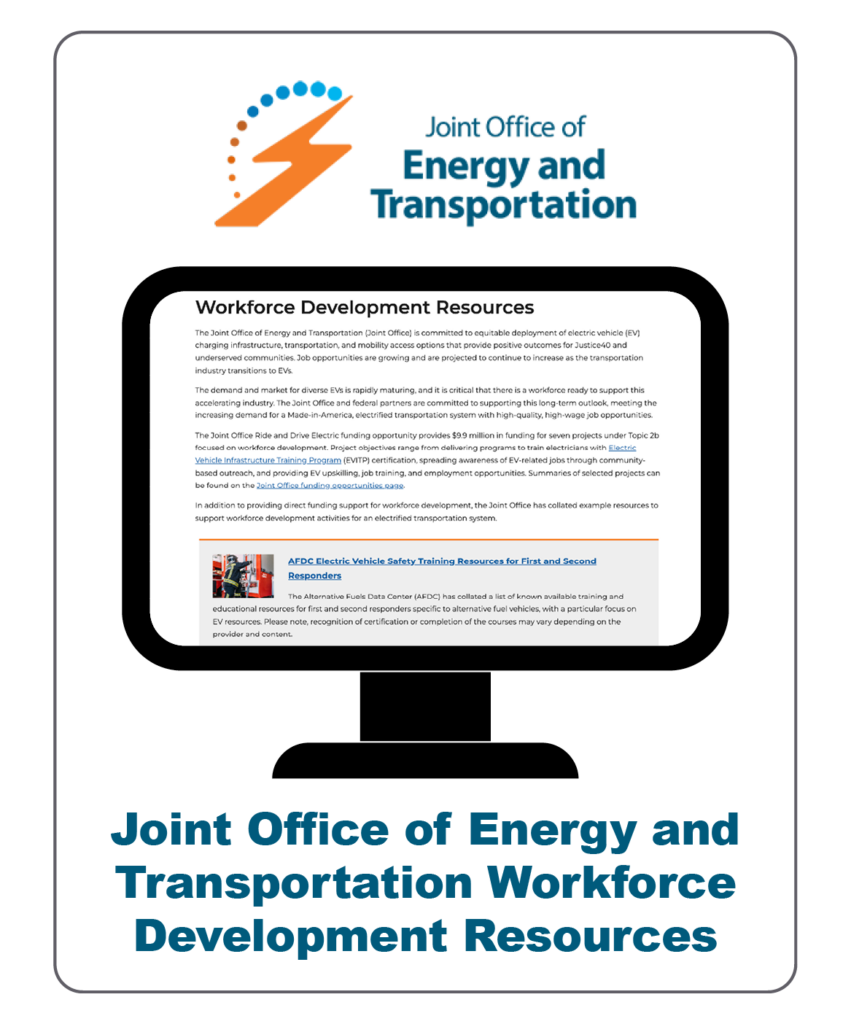
Joint Office of Energy and Transportation Workforce Development Resources
The Joint Office of Energy and Transportation (Joint Office) supports the deployment of zero-emission, convenient, accessible, and equitable transportation infrastructure. In addition to providing direct funding support for workforce development, the Joint Office has collated example resources to support workforce development activities for an electrified transportation system.
Joint Office of Energy and Transportation
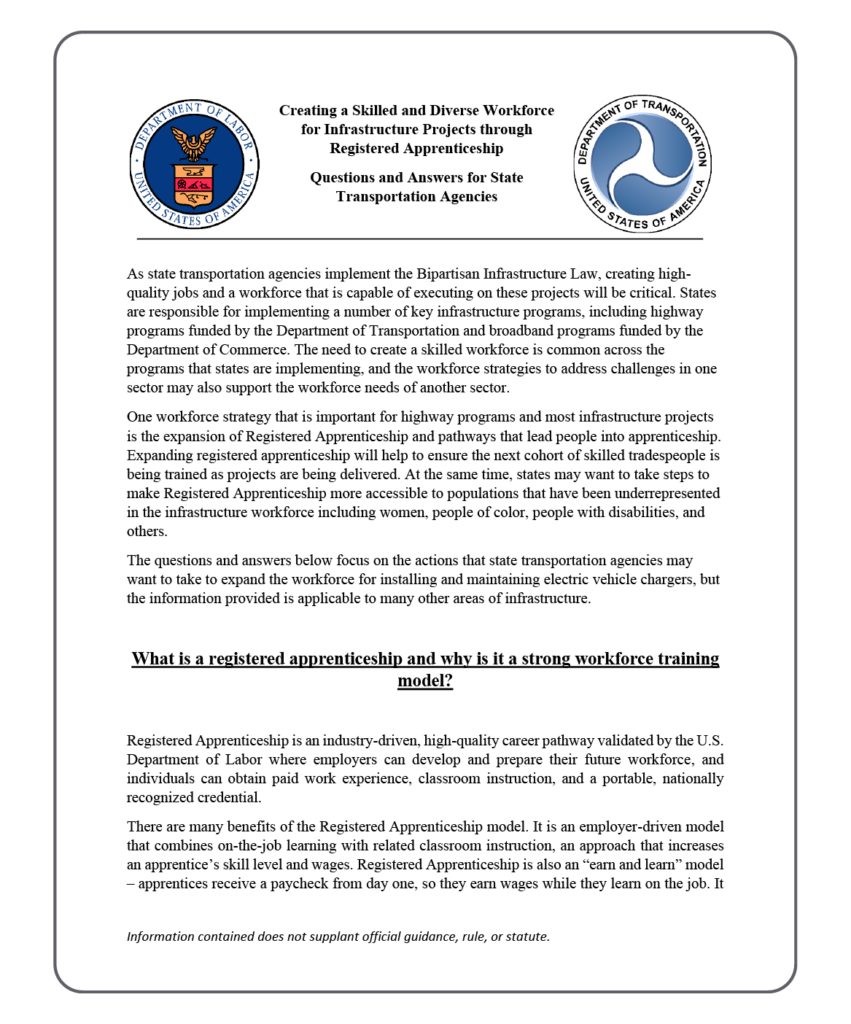
Creating a Skilled and Diverse Workforce for Infrastructure Projects through Registered Apprenticeship
The expansion of Registered Apprenticeship and pathways that lead people into apprenticeship is an important workforce strategy for many infrastructure projects. Agencies can take steps to make Registered Apprenticeship more accessible to populations that have been underrepresented in the infrastructure workforce including women, people of color, people with disabilities, and others.
The questions and answers in this resource focus on expanding the workforce for installing and maintaining electric vehicle chargers, but the information provided is applicable to many other areas of infrastructure and transportation.
Department of Labor, Department of Transportation
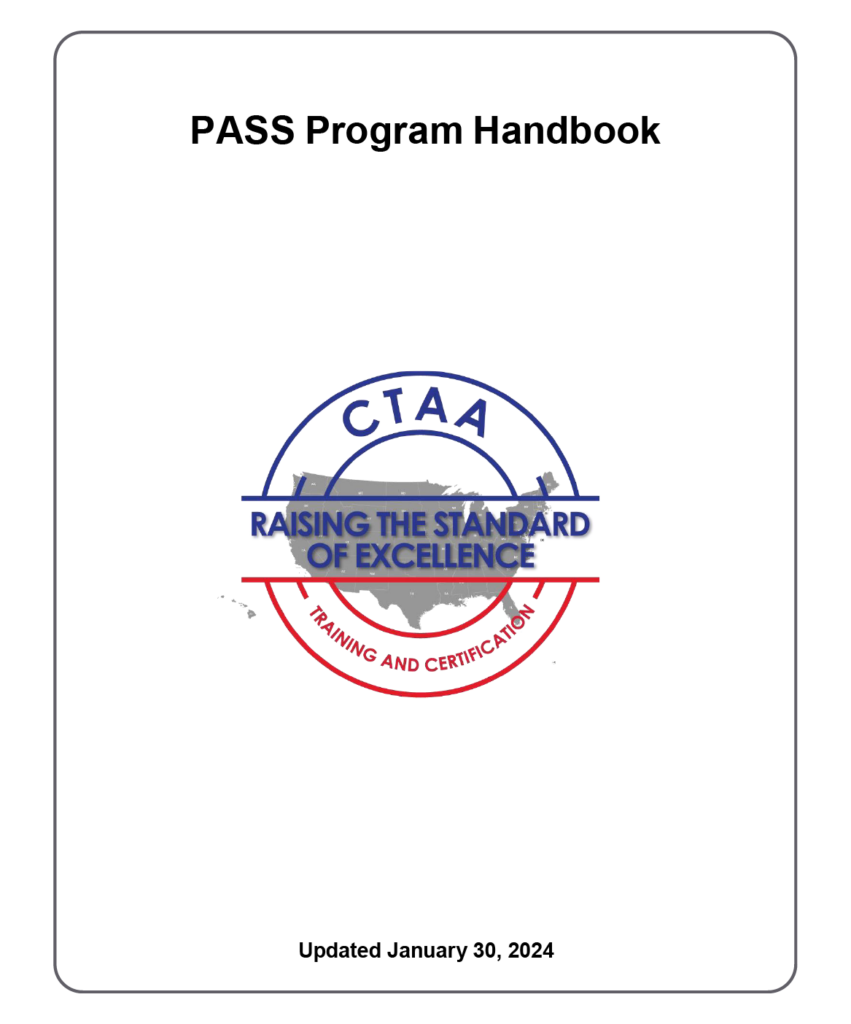
Passenger Assistance, Safety And Sensitivity (PASS) Program Handbook
CTAA’s Passenger Assistance, Safety and Sensitivity (PASS) driver training program provides resources and standards for operators to transport passengers in the most safe, sensitive and careful manner possible. PASS is ideal for non-emergency medical transportation (NEMT) trips, for ADA paratransit services, for specialized transit for older passengers, for human and social service riders — really any transportation operation where the passengers require extra care.
Community Transportation Association of America
January 2024
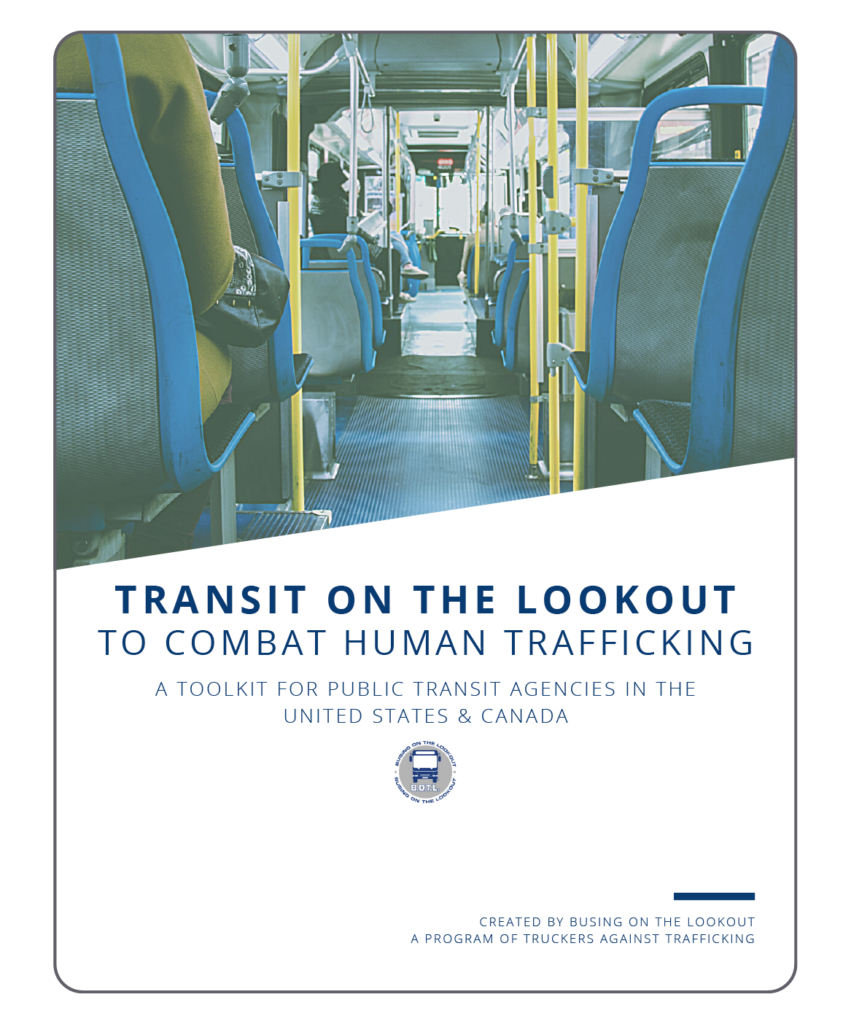
Human Trafficking: Awareness to Action
This webinar reviews the anti-trafficking resources available to transit agencies, shares success stories from the transit industry, and highlights a newly developed template for implementing human trafficking response protocols, which are vital to effective anti-trafficking initiatives. The accompanying toolkit guides transit agencies on steps they can take to help combat human trafficking, including how they can partner with Busing on the Lookout (BOTL) to implement anti-human trafficking training and policies in their operations.
Presenters:
- Jodi Godrey, Center For Urban Transportation Research
- Lexi Higgins, Busing on the Lookout (BOTL) at Truckers Against Trafficking
American Public Transportation Association
January 2024
TOPICS: Safety and Health
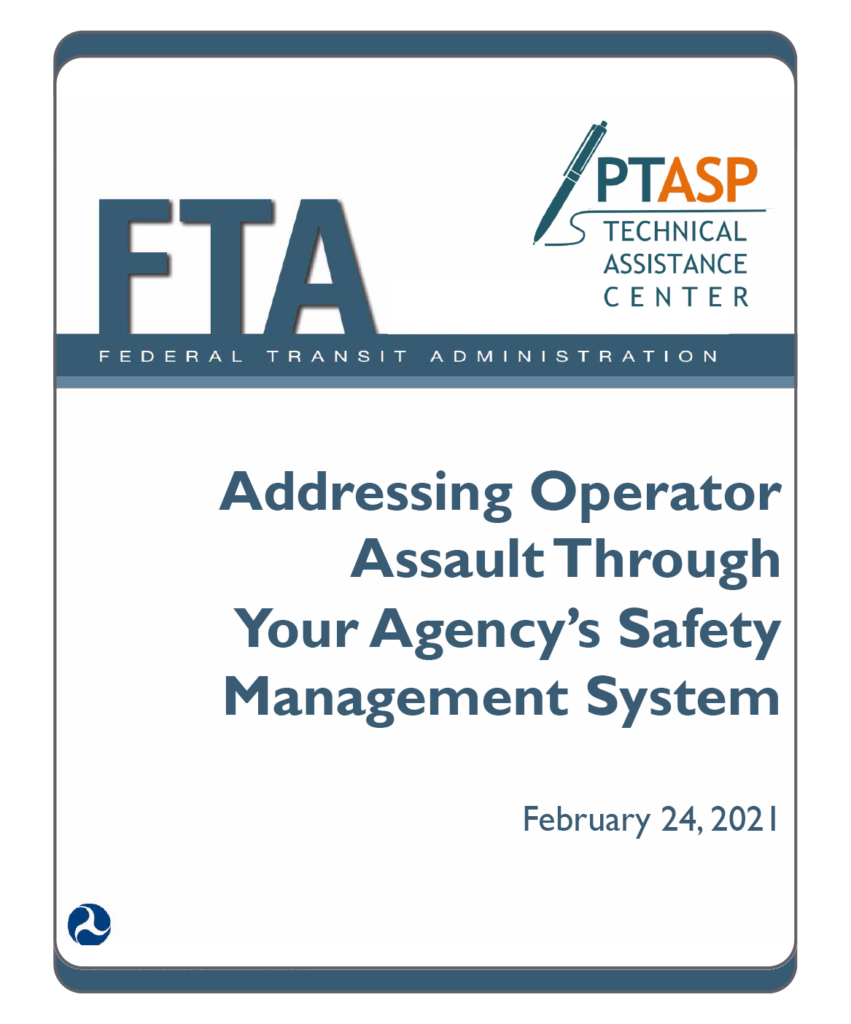
Using Your Safety Management System (SMS) to Protect Transit Workers from Assaults
FTA is working with transit agencies to address the ongoing risk of assaults on transit workers using Safety Management System principles and methods, which FTA adopted as the basis of its Public Transportation Safety Program and Public Transportation Agency Safety Plans (PTASP) regulation.
FTA has developed technical assistance resources to help transit agencies conduct safety risk assessments related to assaults on transit workers and develop safety risk mitigations.
Check out FTA’s full page of crime prevention assistance resources.
Federal Transit Administration
December 2023
TOPICS: Policy and Planning , Safety and Health
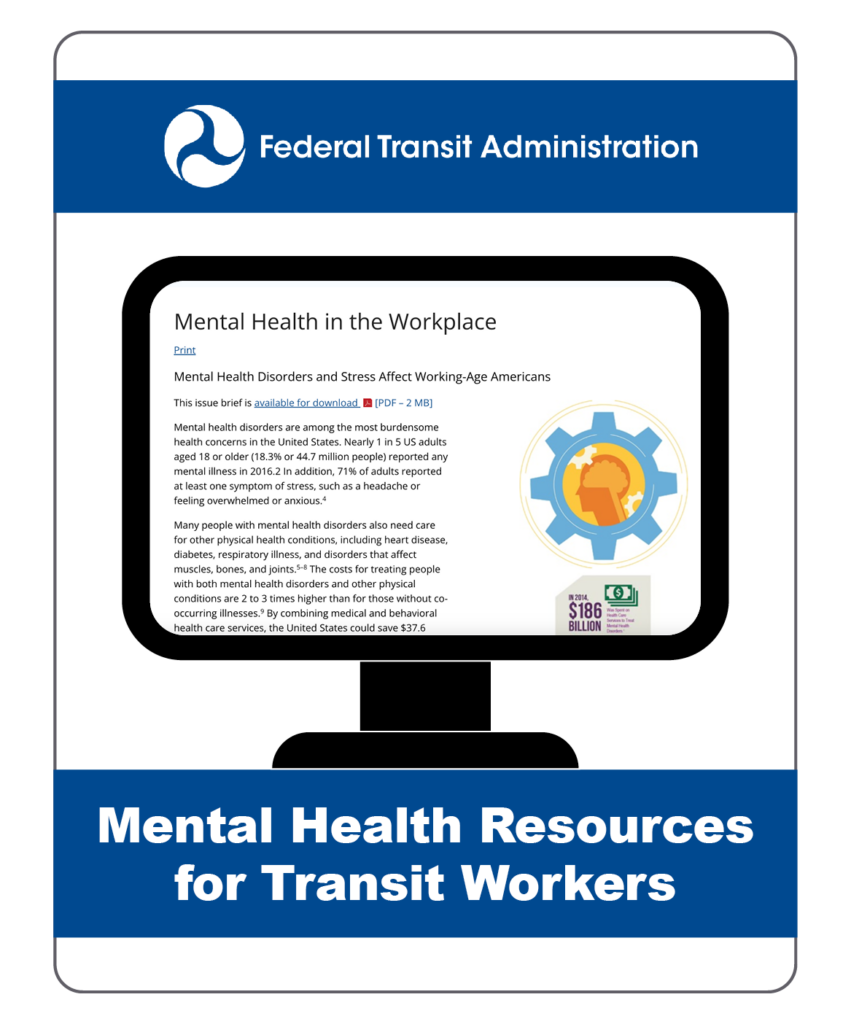
Mental Health Resources for Transit Workers
The Federal Transit Administration has aggregated the mental health resources to support transit industry workers during challenging times. Topics include suicide prevention, active shooter preparedness, mental health first aid, and more.
U.S. Department of Tranportation, Federal Transit Administration
December 2023
TOPICS: Safety and Health
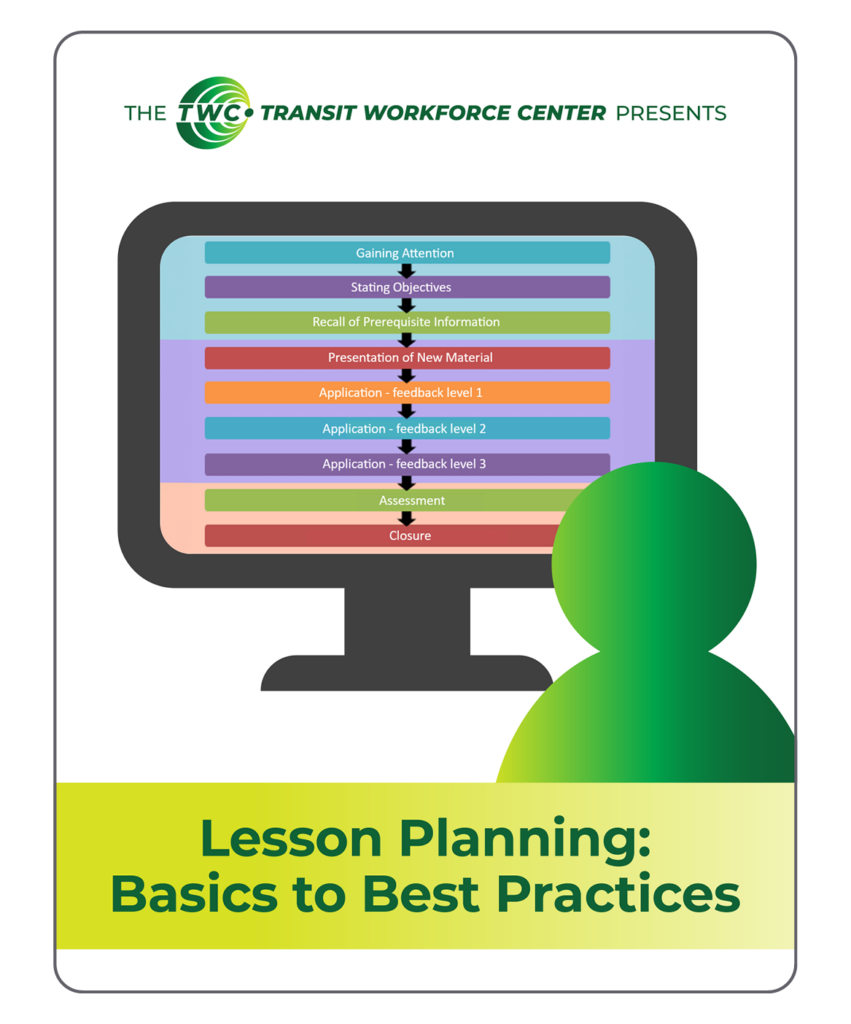
Lesson Planning Webinar: Basics to Best Practices
Have you ever been tasked with developing or delivering a class and didn’t know where to start? Do you have a class that isn’t engaging learners and you don’t know why? On September 26, 2023, TWC hosted an informative webinar on Lesson Planning basics and best practices with award winning author and advisor on all things training, Dr. Chuck Hodell. We took a high-level look at Lesson Planning for those new to training, as well as discussed how to overcome inherent challenges and best practices for transit trainers.
Transit Workforce Center
September 2023
TOPICS: Trainer and Mentor Development , Training
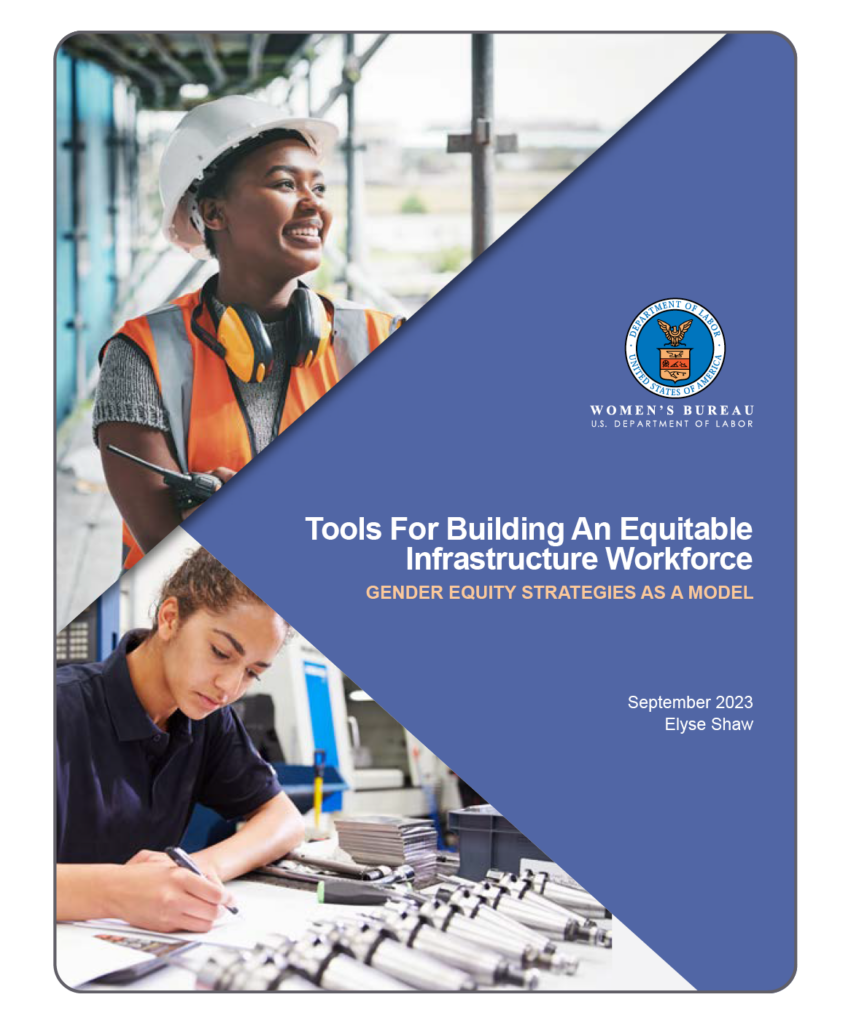
Tools for Building an Equitable Infrastructure Workforce
Department of Labor
September 2023
This toolkit provides guidance on strategies and best practices for recruiting and retaining women in construction, manufacturing, and clean energy jobs. The strategies describe how to make the intentional choice to build a diverse workforce, create targeted recruitment, address barriers of entry, and retain a diverse workforce.
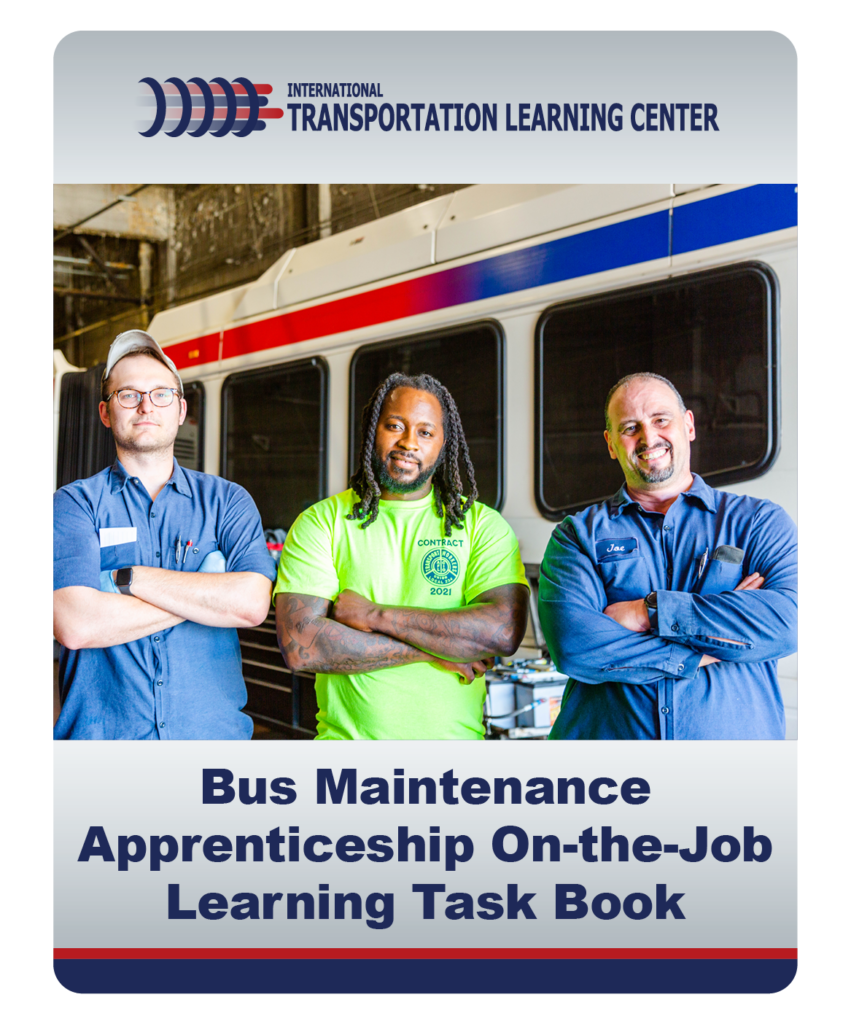
Bus Maintenance Apprenticeship On-the-Job Learning Task Book
International Transportation Learning Center
July 2023
TOPICS: Apprenticeship , Mentorship , Trainer and Mentor Development , Training
The Bus Maintenance Apprenticeship On-the-Job Learning (OJL) Task Book allows mentors and apprentices to track competency. The Task Book contains individual job tasks in 10 job functions (e.g., Electrical & Electronic, Steering & Suspension, etc.). Once the mentor and apprentice both agree that the apprentice is competent in a specific task (e.g., can test, adjust or replace a voltage regulator), each signs-off on that task.
Like the Apprenticeship Framework, the Task Book is aligned with the Automotive Service Excellence (ASE) task list and APTA training standards. Under the Contract/Agreement established by each agency’s Joint Apprenticeship Committee (JAC), however, each agency is free to add, delete or modify tasks to suit their unique operating conditions and bus equipment. The Task Book serves as a useful checklist to make certain that mentors have provided adequate OJL for each job task, and apprentices can demonstrate they are capable of performing those tasks safely and effectively on their own. The use and preservation of the Job Book are the responsibility of both parties.
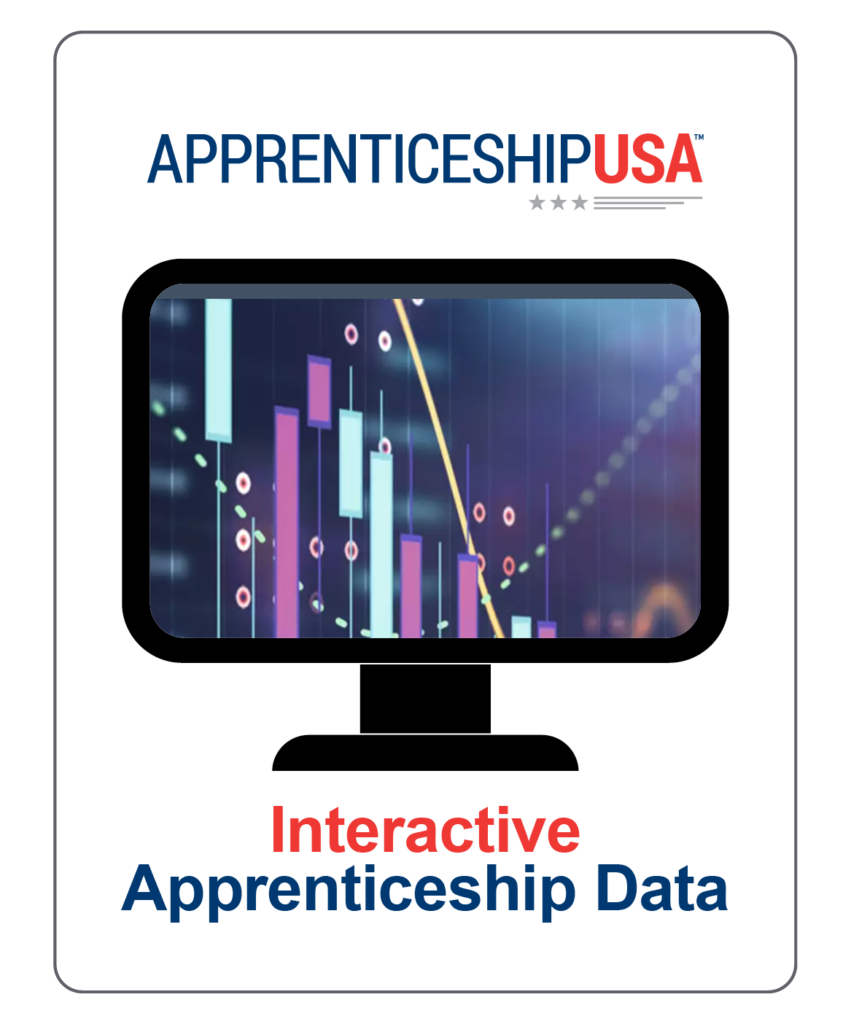
Interactive Apprenticeship Data
This dashboard provides key statistics on apprentices by fiscal year (FY) (October through September), including state and national program data entered or uploaded into the Registered Apprenticeship Partners Information Database System (RAPIDS).
Apprenticeship USA
June 2023
TOPICS: Apprenticeship
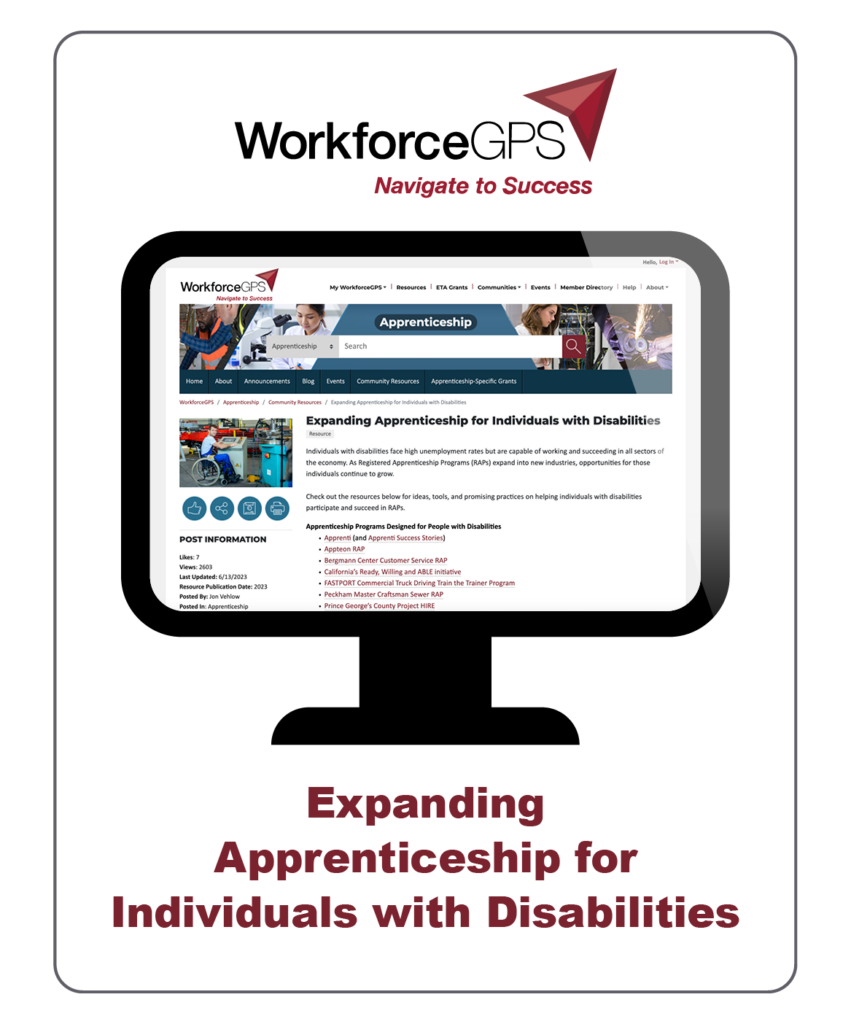
Expanding Apprenticeship for Individuals with Disabilities
This landing page features a variety of resources aimed at providing information, ideas, tools, and practices for supporting individuals with disabilities in apprenticeship programs. The resources include specific programs, toolkits and guides, outreach and background materials, and research.
WorkforceGPS
June 2023
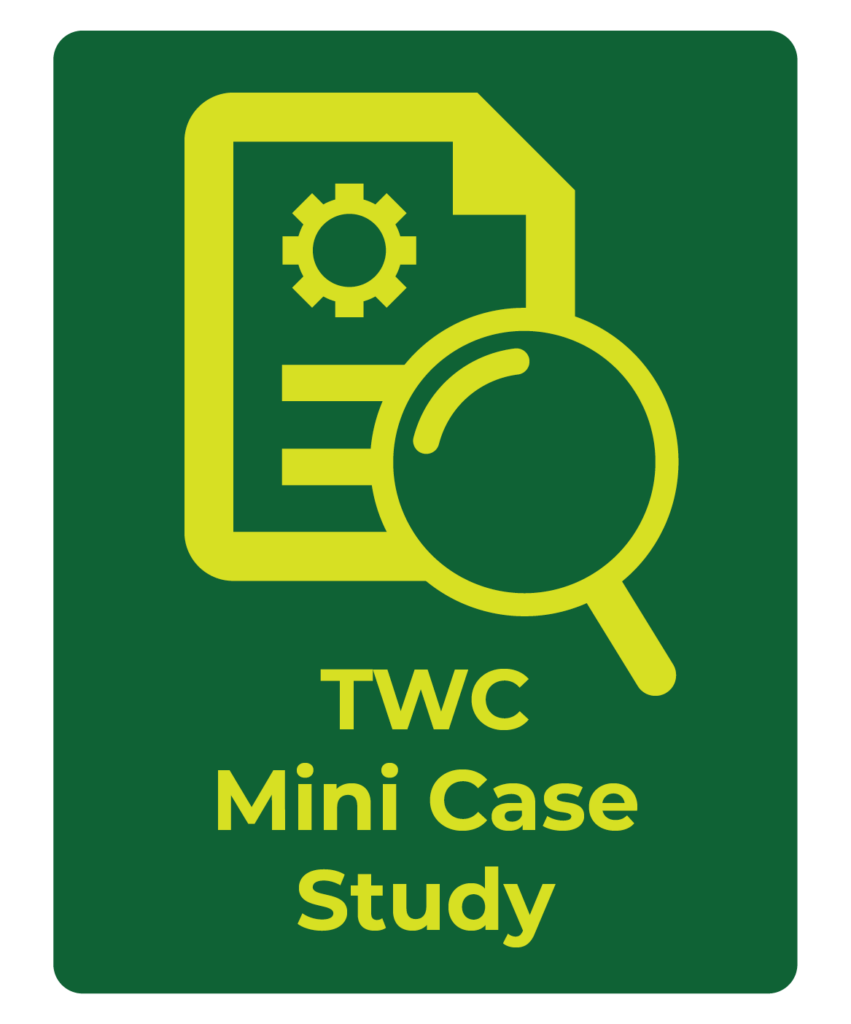
Transit Mentorship Metrics: Positive Signs for Retention, Attendance, and Additional Outcomes
Transit Workforce Center
June 2023
TOPICS: Apprenticeship , Mentorship , Policy and Planning , Retention , Training
This fact sheet provides overviews of four of the country’s most robust bus operator mentoring programs and preliminary data on the success of these programs (as of Spring 2023). Operator mentorship programs pair seasoned bus operators with new ones for technical skill instruction and/or individualized coaching and support to help mentees be successful in their new positions. They leverage institutional knowledge and incumbent workers’ expertise to improve training and support for new workers. The Mentoring Fact Sheet provides insight into the role mentorship programs can play in improving retention rates of workers, decrease unexcused absences, reduce rates of recorded violations, and lower complaints.
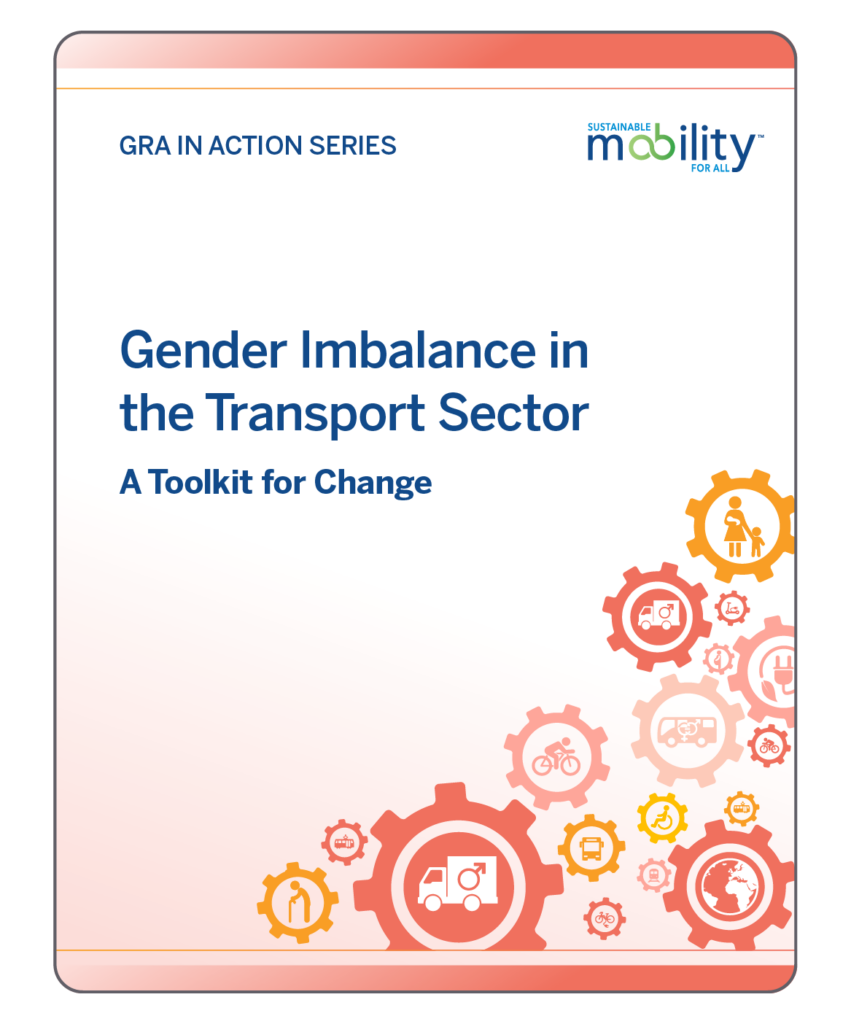
Gender Imbalance in the Transport Sector: A Toolkit for Change
This study builds upon findings from the SuM4All Global Roadmap for Action, which called for the transport sector to address key barriers inhibiting women from accessing decent work in the industry. It delivers a clear overview of the existing employment landscape in transport and recommends and guides positive action for practitioners across the sector. Informed by desk-based research, surveys, interviews, and case studies, the study examines the primary challenges for women entering, remaining in, and progressing in the transport sector worldwide, before presenting a toolkit, which lays out key recommendations for action.
Sustainable Mobility for All
May 2023
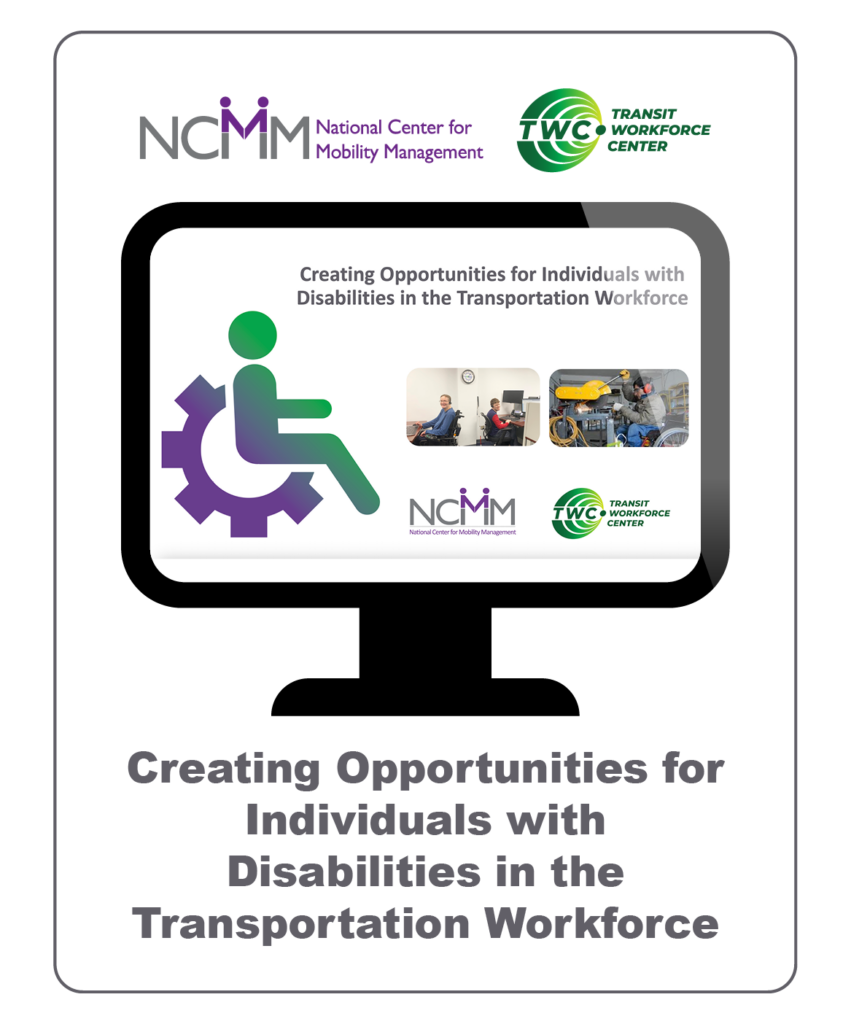
Creating Opportunities for Individuals with Disabilities in the Transportation Workforce
When transportation professionals are equipped with knowledge and skills about disability topics, they can help create welcoming and engaging employment settings for individuals with disabilities. This new NCMM/TWC learning module offers hiring professionals strategies to recruit and retain individuals with disabilities in the transportation workforce. Learn about partnerships, inclusive hiring, and accommodations to attract and retain employees with disabilities.
National Center for Mobility Management; Transit Workforce Center
May 2023
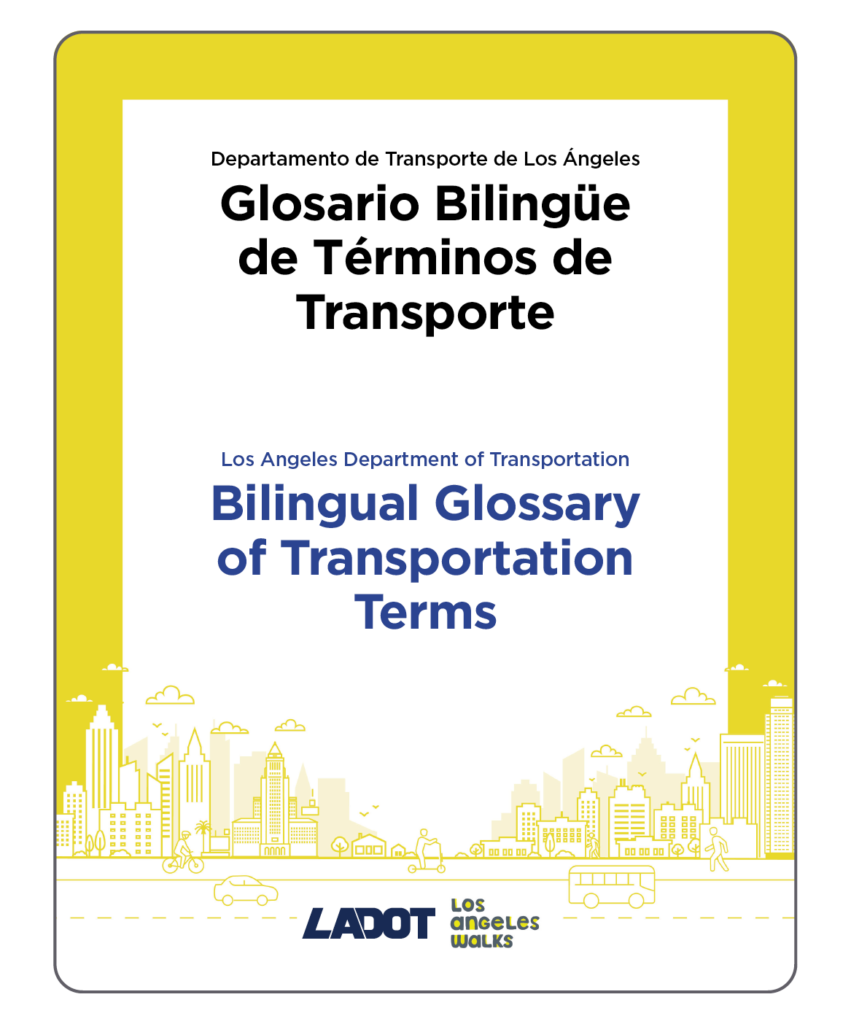
LADOT Bilingual Glossary of Transportation Terms
Los Angeles Department of Transportation
May 2023
In 2020-2022, LADOT collaborated with LA Walks, community members, transportation and planning practitioners, advocates and others to develop LADOT’s first Spanish glossary. The project includes over 100 transportation planning and community engagement terms to improve and standardize LADOT’s Spanish language communication, as well as empower Spanish speaking communities to advocate for transportation improvements.
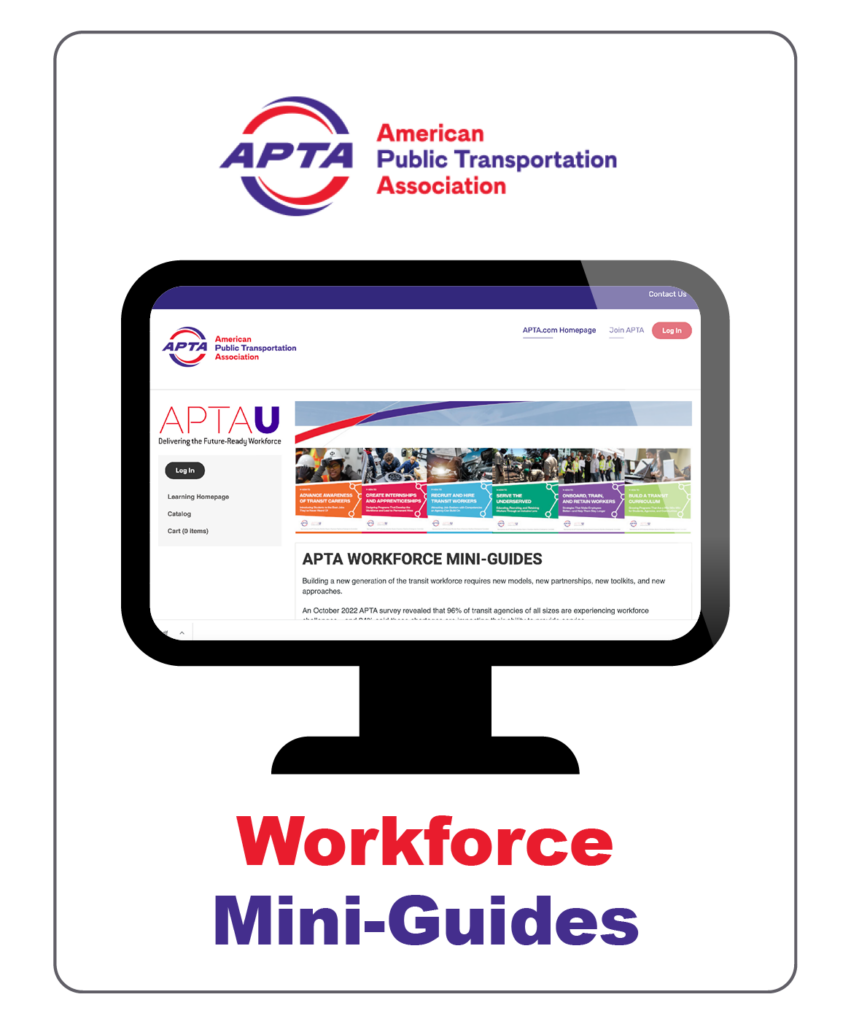
Workforce Mini-Guides
These six workforce development mini-guides are designed to help develop and implement successful strategies to address the critical workforce shortages seen across the public transportation industry. They cover these topics: advancing awareness of transit careers; creating internships and apprenticeships; recruiting and hiring transit workers; serving the underserved in the workforce; onboarding, training, and retaining workers; and building a transit curriculum.
American Public Transportation Association
April 2023
An October 2022 survey conducted by APTA revealed that 96 percent of transit agencies of all sizes are experiencing workforce challenges, and 84 percent said these shortages are impacting their ability to provide service. APTA developed these mini-guides building on their 2021 Transit Workforce Readiness Guide and combining industry insights and stories, case studies, lessons learned, and best practices.
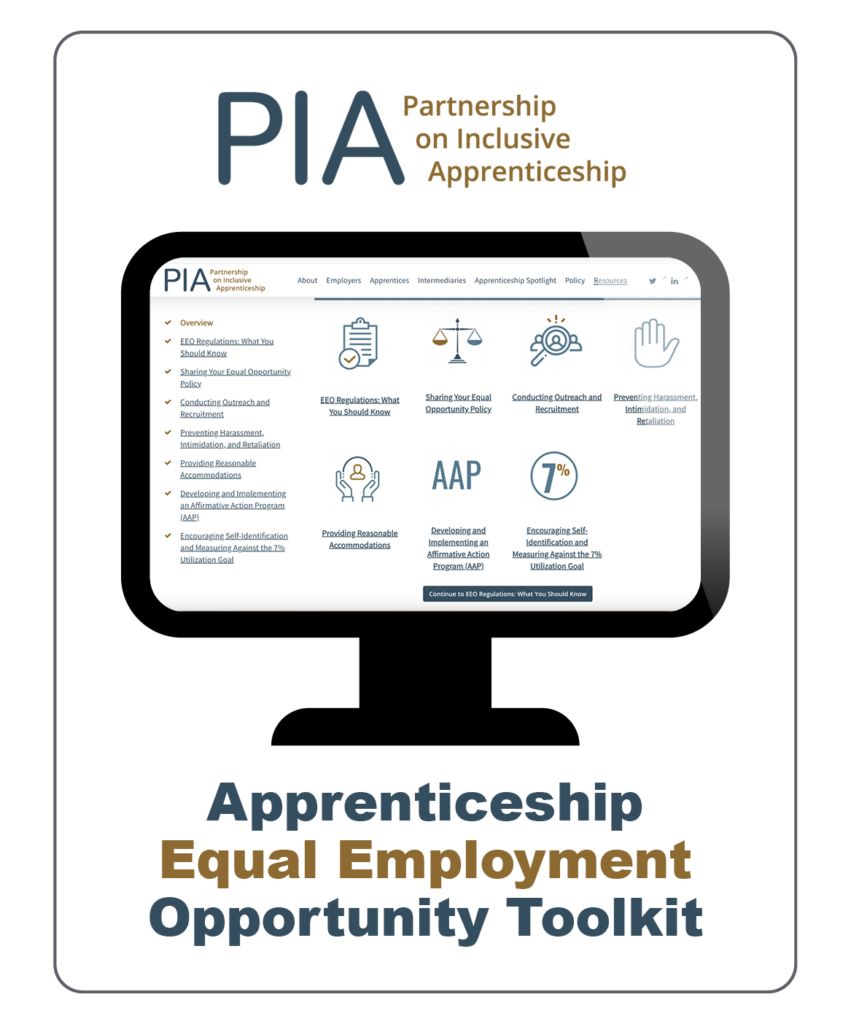
Apprenticeship Equal Employment Opportunity Toolkit
This toolkit provides advice on how to reach the Department of Labor utilization goal for sponsors of Registered Apprenticeship Programs to have individuals with disabilities make up at least 7% of people enrolled. It includes information about outreach and recruitment; preventing harassment, intimidation, and retaliation; providing reasonable accommodations; developing and implementing an affirmative action program, and encouraging self-identification.
Partnership on Inclusive Apprenticeship
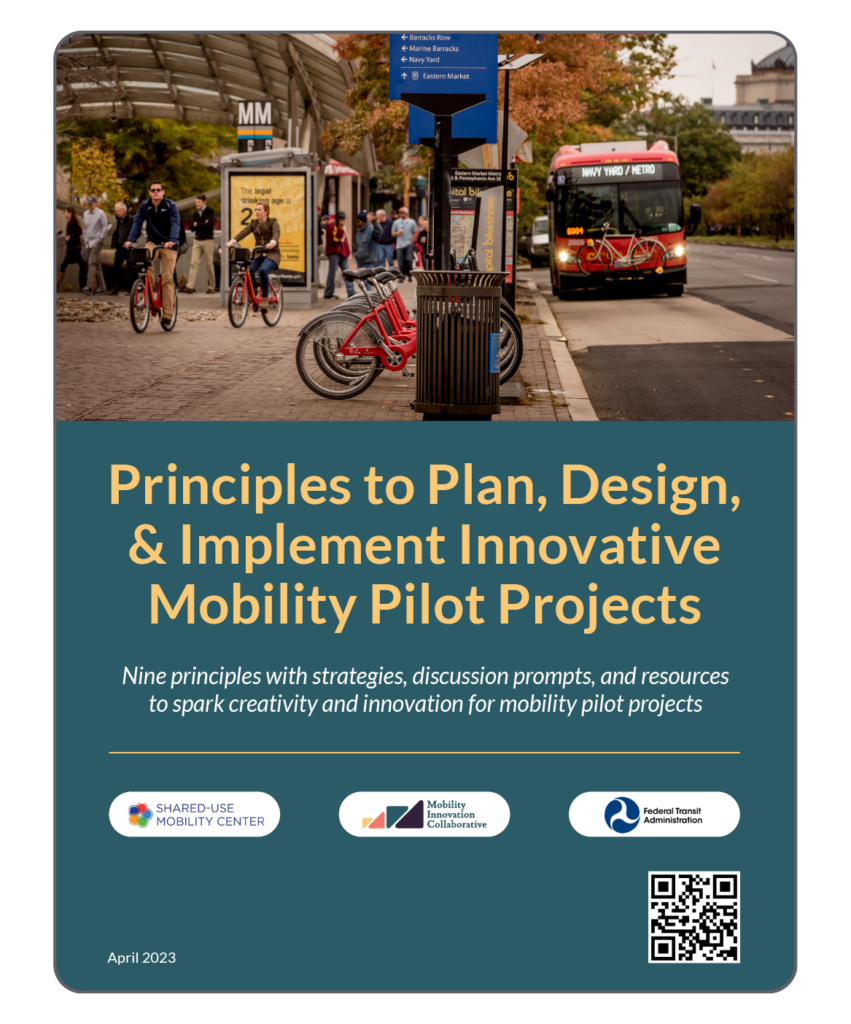
Guidebook for Mobility Innovation: Principles to Plan, Design, & Implement Innovative Mobility Projects
Shared-Use Mobility Center
April 2023
TOPICS: Policy and Planning , Training
This guidebook is designed to help mobility innovators in the transportation sector while developing and implementing a pilot project. It provides a series of principles to better plan, design, and implement innovative mobility pilot projects. These principles have supporting information about strategies to execute this principle, examples of this principle in action, resources about this principle, and questions to prompt team discussions. The guidebook includes advice and support for training transit workers during a pilot project.
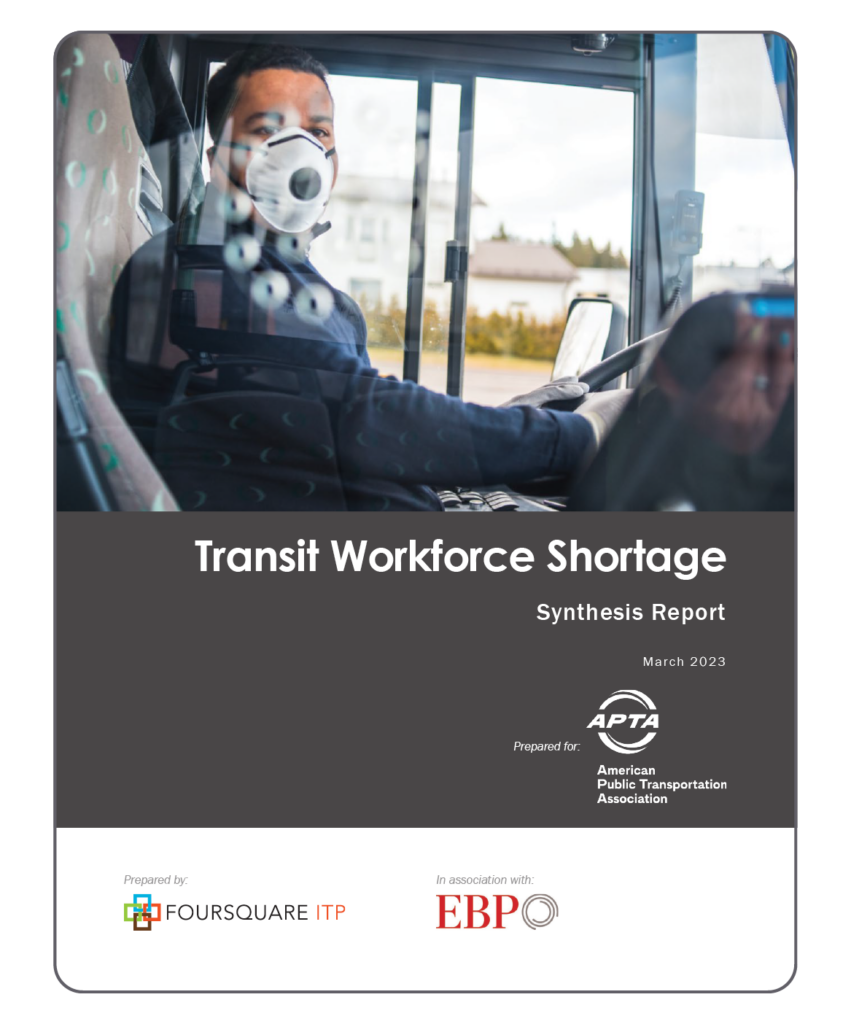
Transit Workforce Shortage: Synthesis Report and Toolkit
The Transit Workforce Shortage Study builds a framework for APTA, its members, and its partner organizations to better understand the workforce shortage’s causes and provides best practices for recruiting, hiring, and retaining transit operations workers.
American Public Transportation Association
March 2023
TOPICS: Hiring and Recruitment , Policy and Planning , Retention , Workforce Shortage
APTA’s Transit Workforce Shortage Study combines information from a survey of public transit workers and interviews with public transportation agencies to provide insight into ways to address the national shortage of transit workers. The report provides information on actions agencies have taken to address the workforce shortage, and the toolkit provides step-by-step answers to workforce shortage scenarios agencies are facing every day.
This report builds on findings from the first interim report.
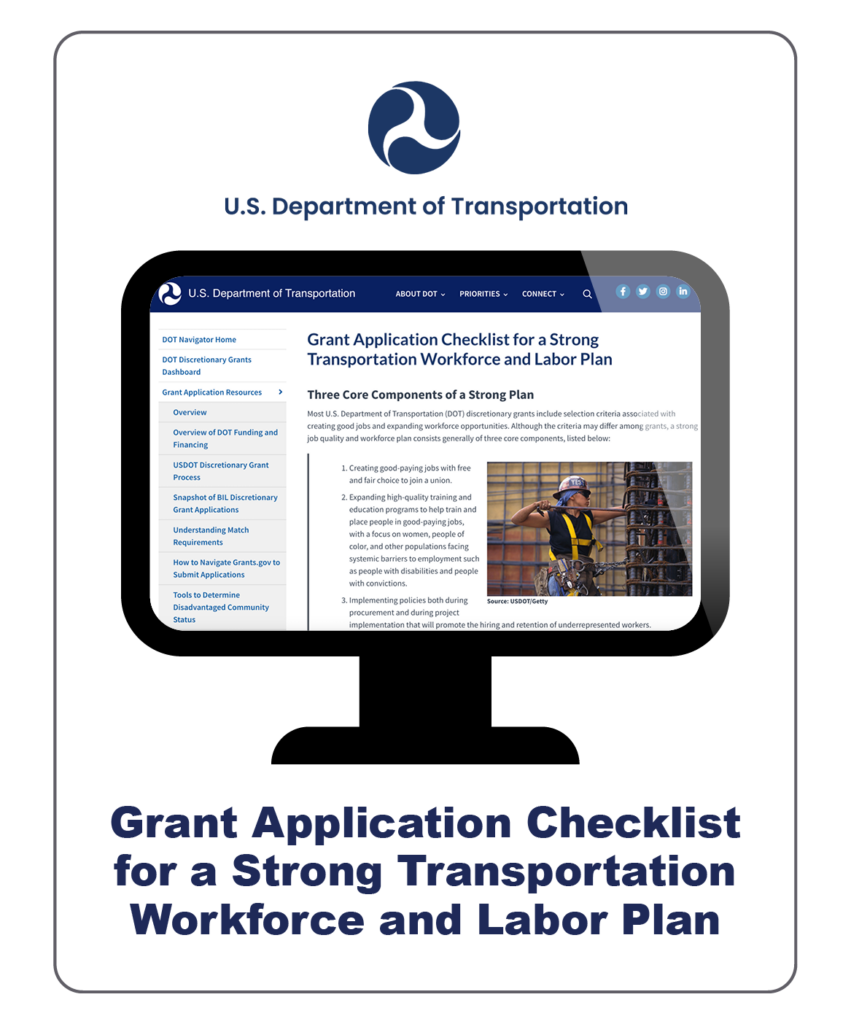
Grant Application Checklist for a Strong Transportation Workforce and Labor Plan
This checklist provides information on the components of an ideal labor plan when applying to DOT discretionary grants in order to best meet the criteria for a strong workforce. The checklist prompts grant applicants to consider their labor-management partnerships, workforce training and education, and hiring and retaining underrepresented workers.
US Department of Transportation
February 2023
TOPICS: Funding Opportunities , Policy and Planning
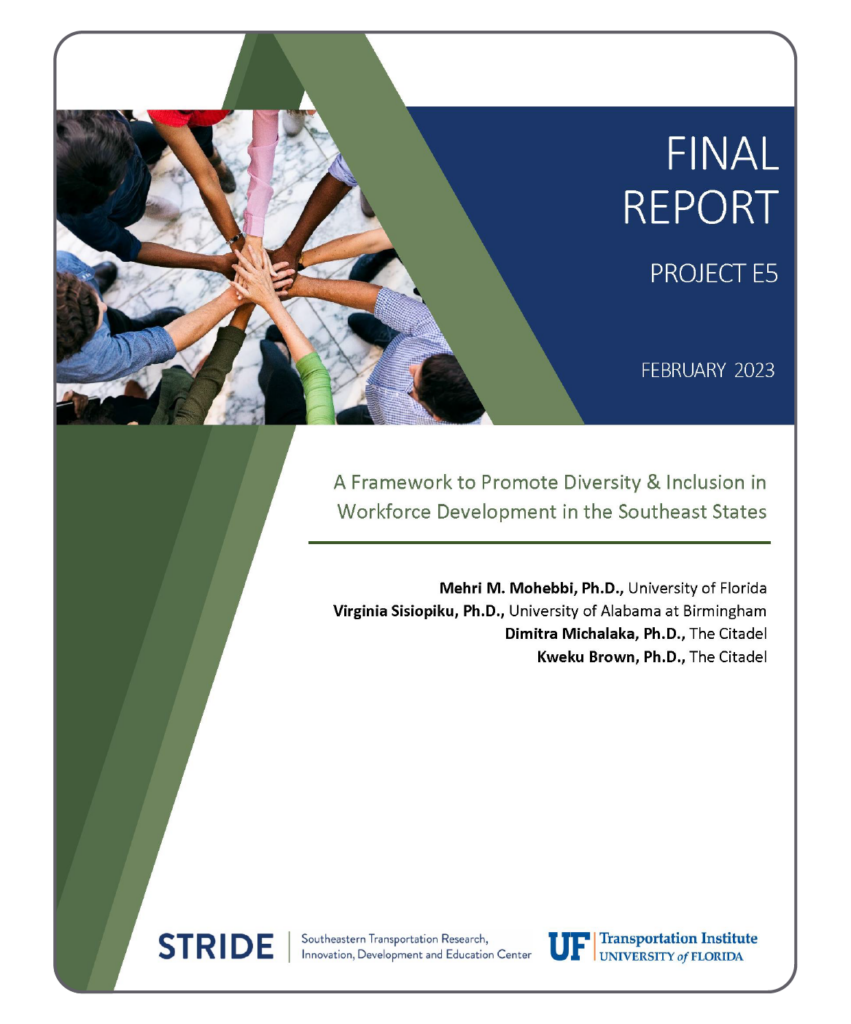
A Framework to Promote Diversity and Inclusion in Workforce Development in the Southeast States
This project developed a framework for creating an inclusive and functional workforce environment for transportation agencies in the southeast region. The project identifies existing gaps, predicts future needs, and captures the role transportation agencies, research centers, DOTs, and professional organizations can play to recruit, train, and maintain a diverse and inclusive workforce.
Southeastern Transportation Research, Innovation, Development and Education Center
February 2023
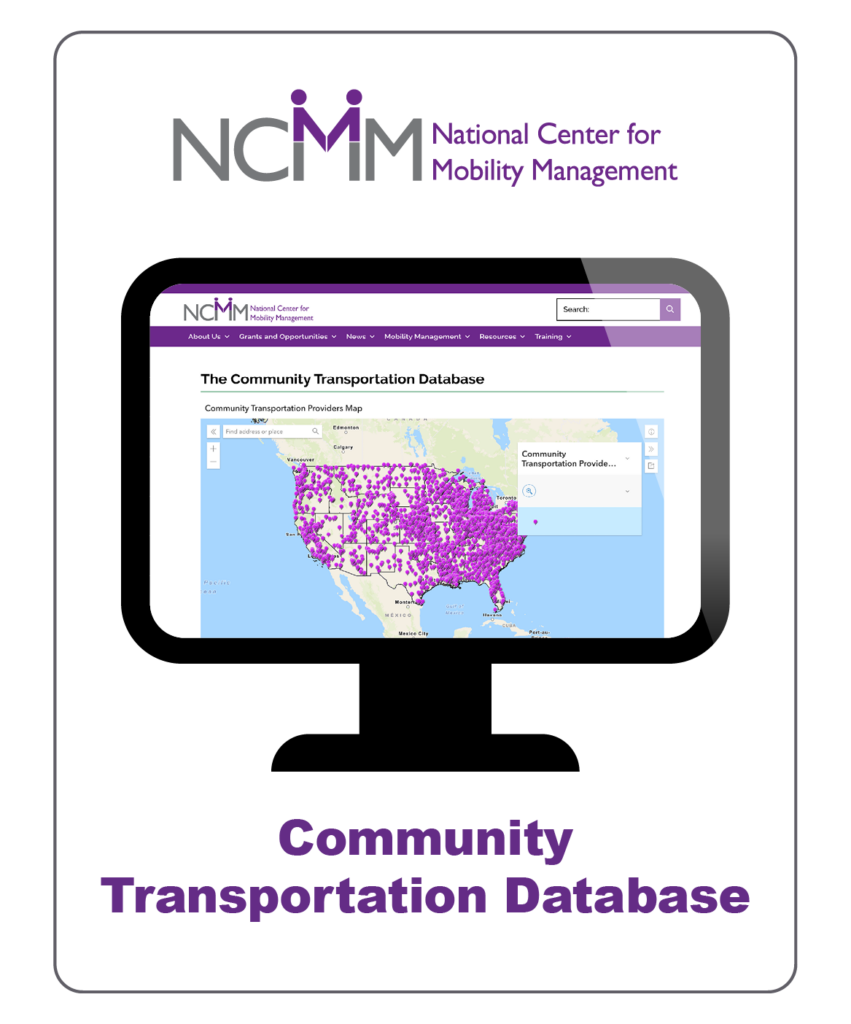
Community Transportation Map and Database
The National Center for Mobility Management developed a national transit database depicting the approximate location of transit agencies and organizations across the United States. The database combines existing datasets with new research to create an exhaustive list of organizations that provide transportation services to communities across the country. It contains public transit providers, community action agencies, senior centers, and others that provide transportation.
National Center for Mobility Management
January 2023
TOPICS: Policy and Planning
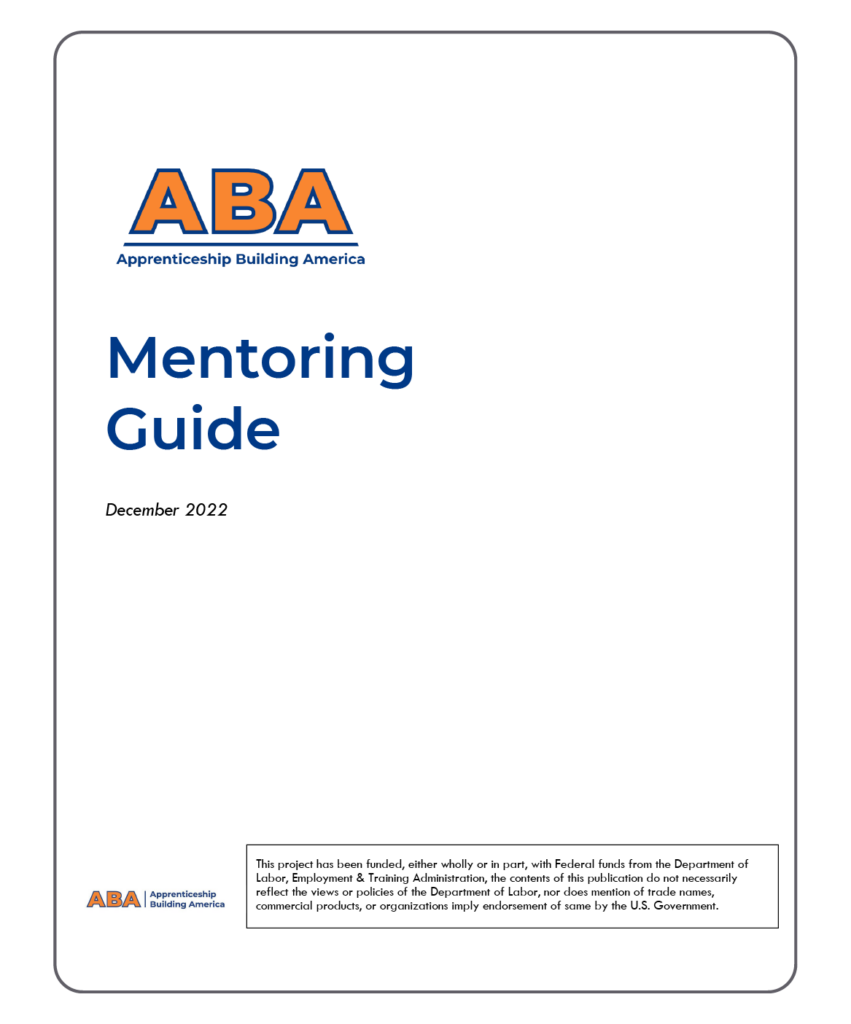
Apprenticeship Building America: Mentoring Guide
Mentoring is a key staple of a successful apprenticeship program. This guide provides an overview of the qualities of a good mentor, the activities a mentor undertakes, tips for mentoring youth apprentices, and more.
U.S. Dept of Labor, Apprenticeship Building America Grant Program
December 2022
TOPICS: Apprenticeship , Mentorship , Trainer and Mentor Development
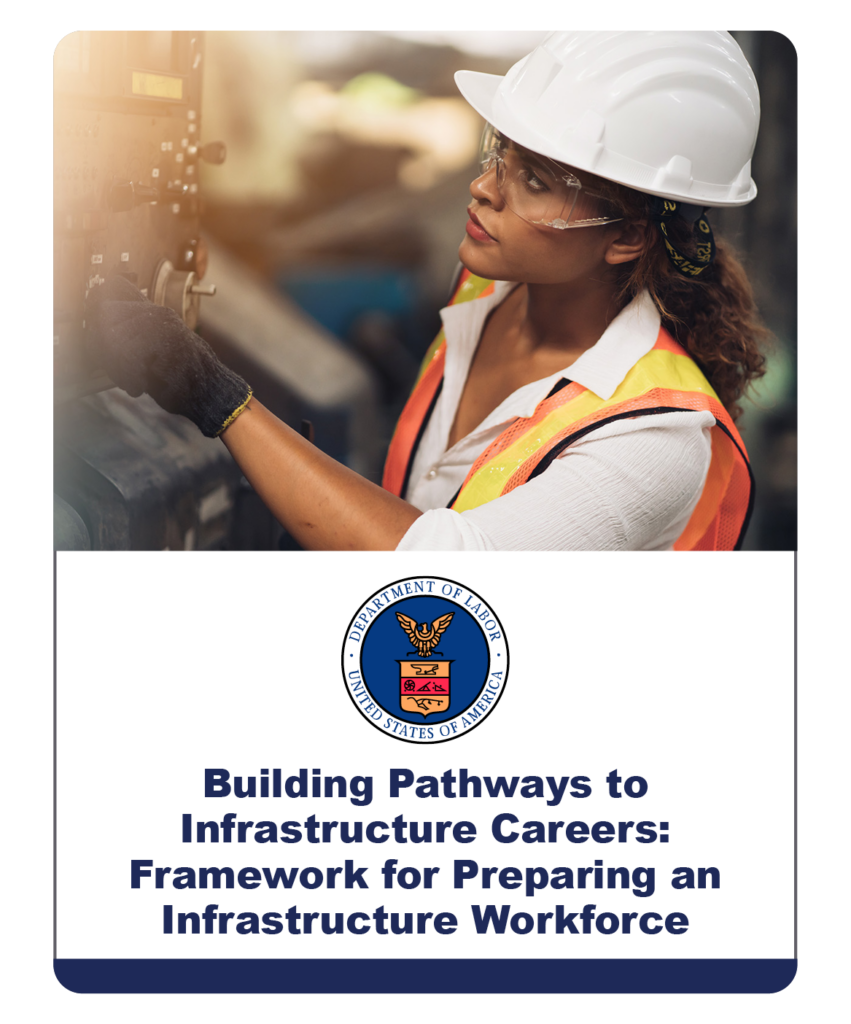
Building Pathways to Infrastructure Careers: Framework for Preparing an Infrastructure Workforce
This resource provides a framework for all workforce stakeholders, including infrastructure project leads, to engage the public workforce system in implementing the Bipartisan Infrastructure Law with strong workforce commitments and proven strategies that produce high-quality education, training, and employment opportunities for all workers.
U.S. Department of Labor, Employment and Training Administration
October 2022
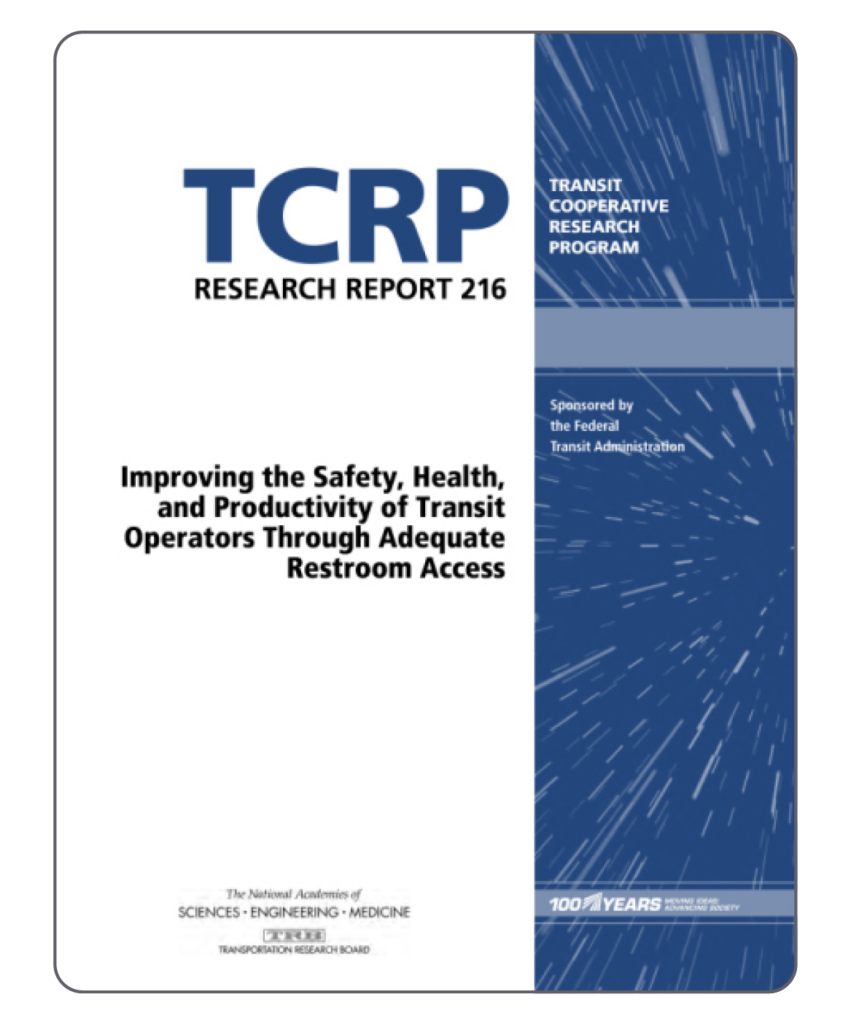
Improving the Safety, Health, and Productivity of Transit Operators Through Adequate Restroom Access
This report presents a catalog of good practices, tools, and resources that provide a foundation for implementable strategies to improve restroom access, primarily for transit vehicle operators. The report compiles research from 100 transit agencies on current and best practices; the impact of restroom access on health, safety, and operations, and lessons learned.
Transit Cooperative Research Program
October 2022
TOPICS: Policy and Planning , Safety and Health
A toolbox accompanying the report includes helpful resources such as restroom inventory, planning, and cost estimation tools, as well as templates for restroom access policies and contract language.
Contributor(s): National Academies of Sciences, Engineering, and Medicine; Transportation Research Board; Transit Cooperative Research Program; Robin Mary Gillespie, City University of New York; RLS & Associates Robbie Sarles
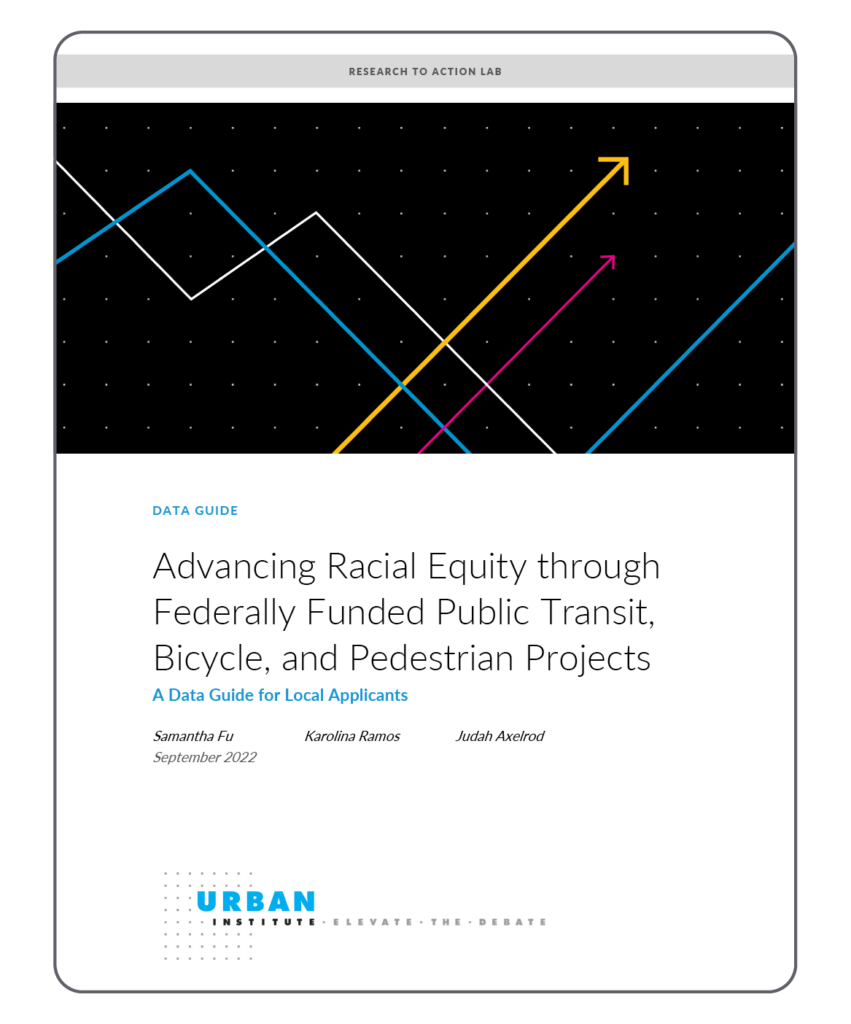
Advancing Racial Equity through Federally Funded Public Transit, Bicycle, and Pedestrian Projects
This report provides data sources and tools to quantify racial equity and environmental justice in transportation-related projects. It also describes how the data can be used to speak to the equity priorities of grants available through the Infrastructure and Investment Jobs Act.
Urban Institute
September 2022
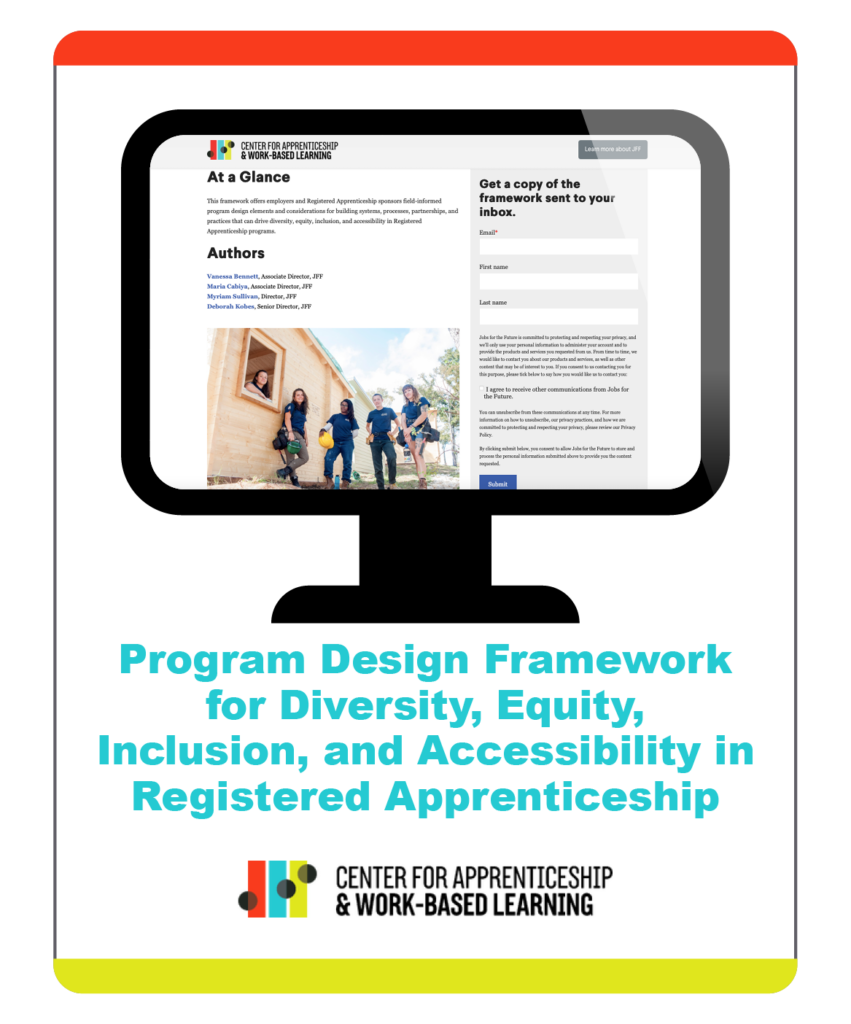
Program Design Framework for Diversity, Equity, Inclusion, and Accessibility in Registered Apprenticeship
This framework offers employers and Registered Apprenticeship sponsors field-informed program design elements and considerations for building systems, processes, partnerships, and practices that can drive diversity, equity, inclusion, and accessibility in Registered Apprenticeship programs.
Jobs for the Future Center for Apprenticeship & Work-Based Learning
September 2022
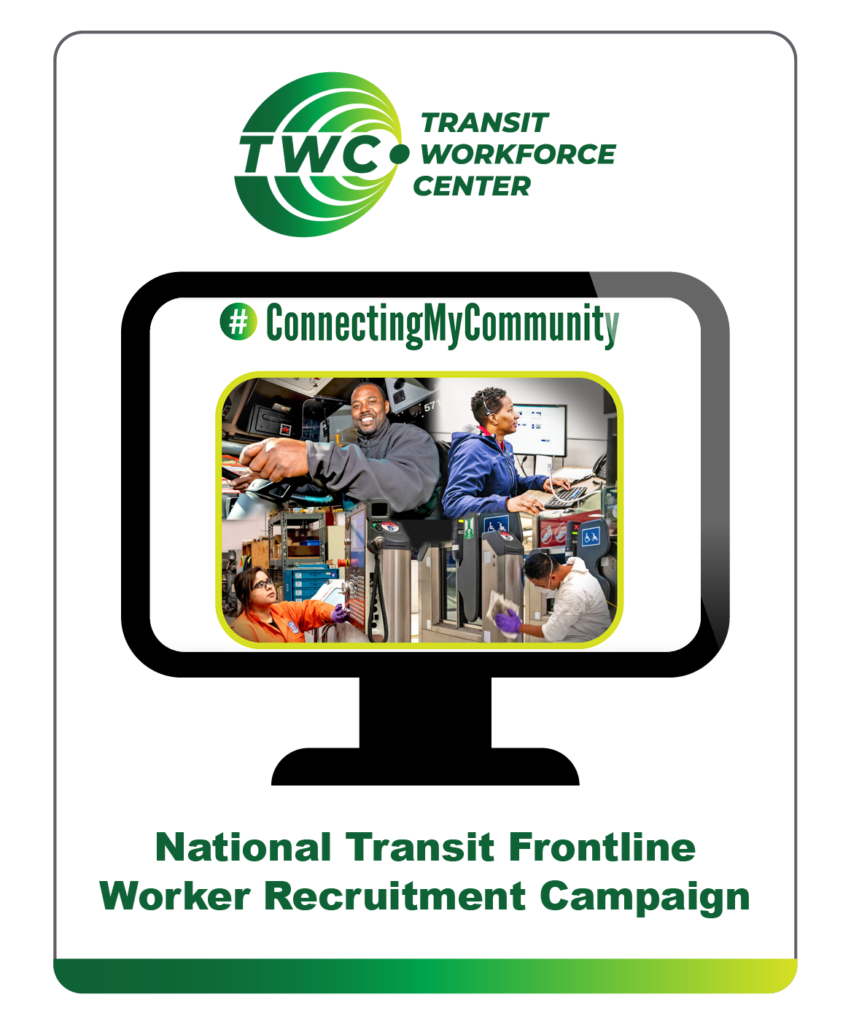
National Transit Frontline Worker Recruitment Campaign
Across the United States, whether large, small, urban, rural, or tribal, transit agencies are facing the challenge of recruiting and retaining drivers, mechanics, and technicians who can operate and maintain the buses of our public transit systems. To help support local transit efforts, TWC is developing the #ConnectingMyCommunity national frontline worker recruitment campaign, coordinated with the Federal Transit Administration (FTA) and industry, labor, and community partners from around the country.
Transit Workforce Center
July 2022
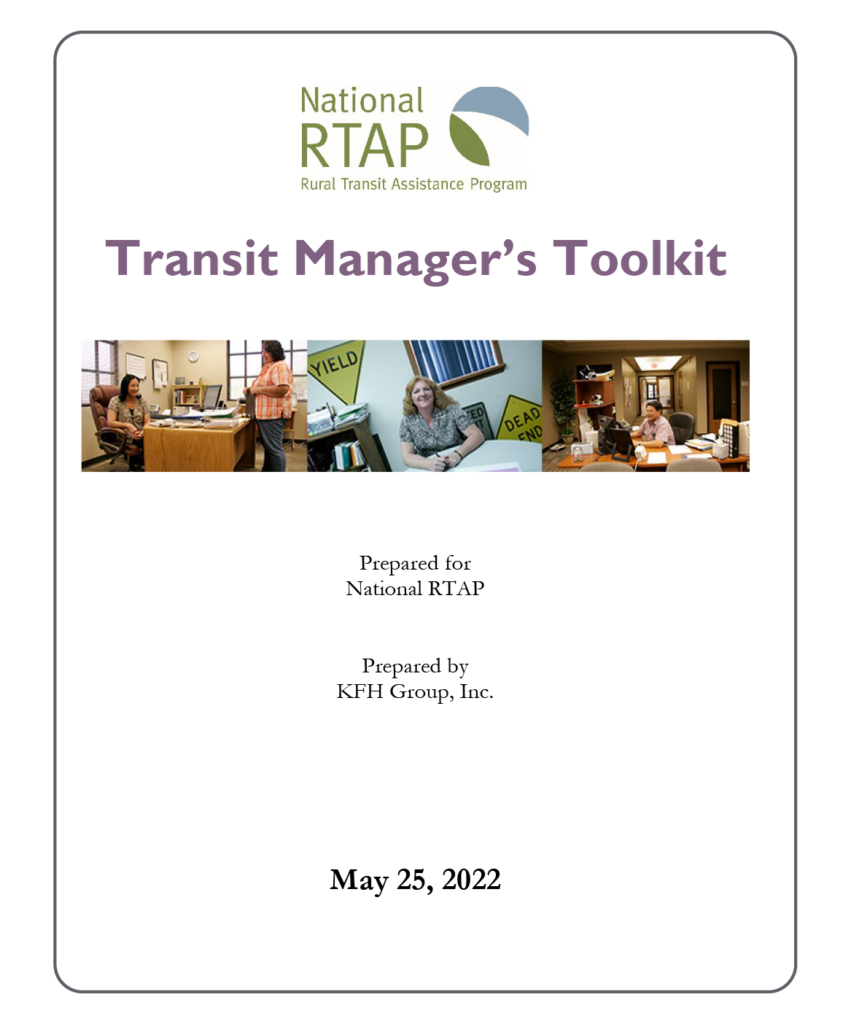
Transit Manager’s Toolkit: Driver Recruitment, Training, and Retention
This toolkit from National RTAP introduces both requirements and suggested practices in driver recruiting/hiring, retention/motivation, and training. It includes information about federal requirements, how to create a positive work environment, and training standards.
National Rural Transit Assistance Program
May 2022
TOPICS: Hiring and Recruitment , Retention , Training
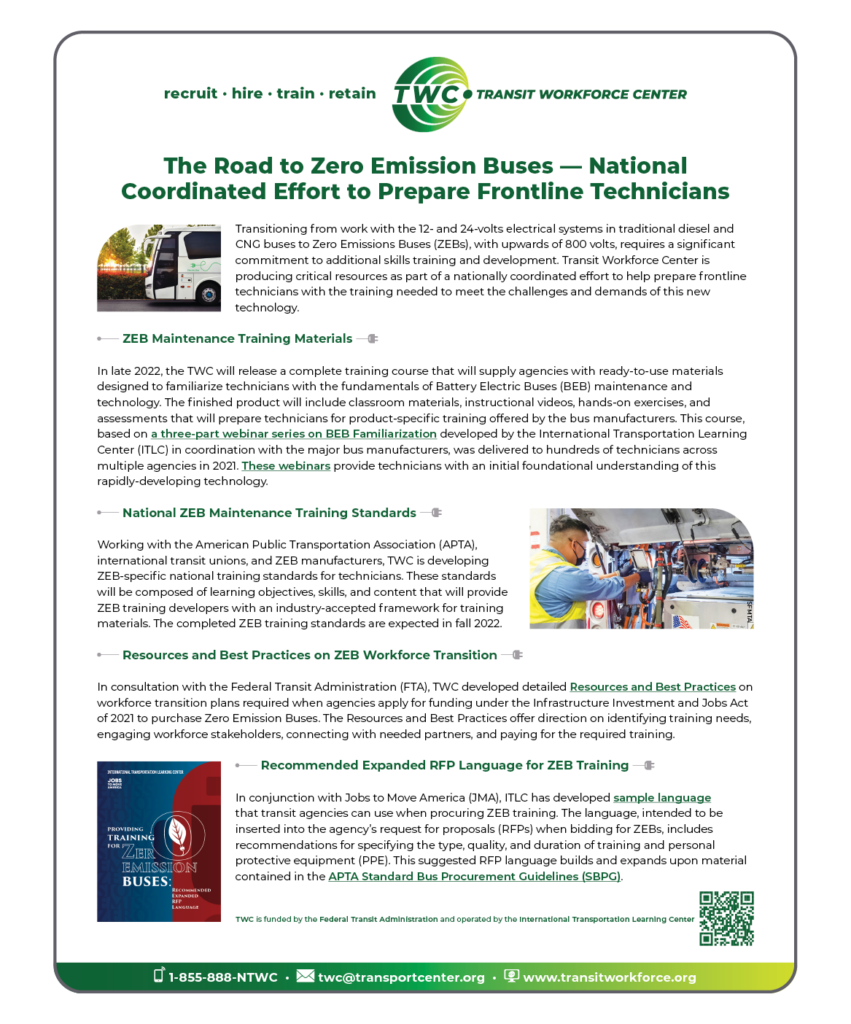
The Road to Zero Emission Buses — National Coordinated Effort to Prepare Frontline Technicians
Transit Workforce Center
March 2022
TOPICS: Hiring and Recruitment , Policy and Planning , Procurement , Training , Zero Emission Buses
Transitioning from work with the 12- and 24-volts electrical systems in traditional diesel and CNG buses to Zero Emissions Buses (ZEBs), with upwards of 800 volts, requires a significant commitment to additional skills training and development. The Transit Workforce Center is producing critical resources as part of a nationally coordinated effort to help prepare frontline technicians with the training needed to meet the challenges and demands of this new technology. This document summarizes our ZEB resources.
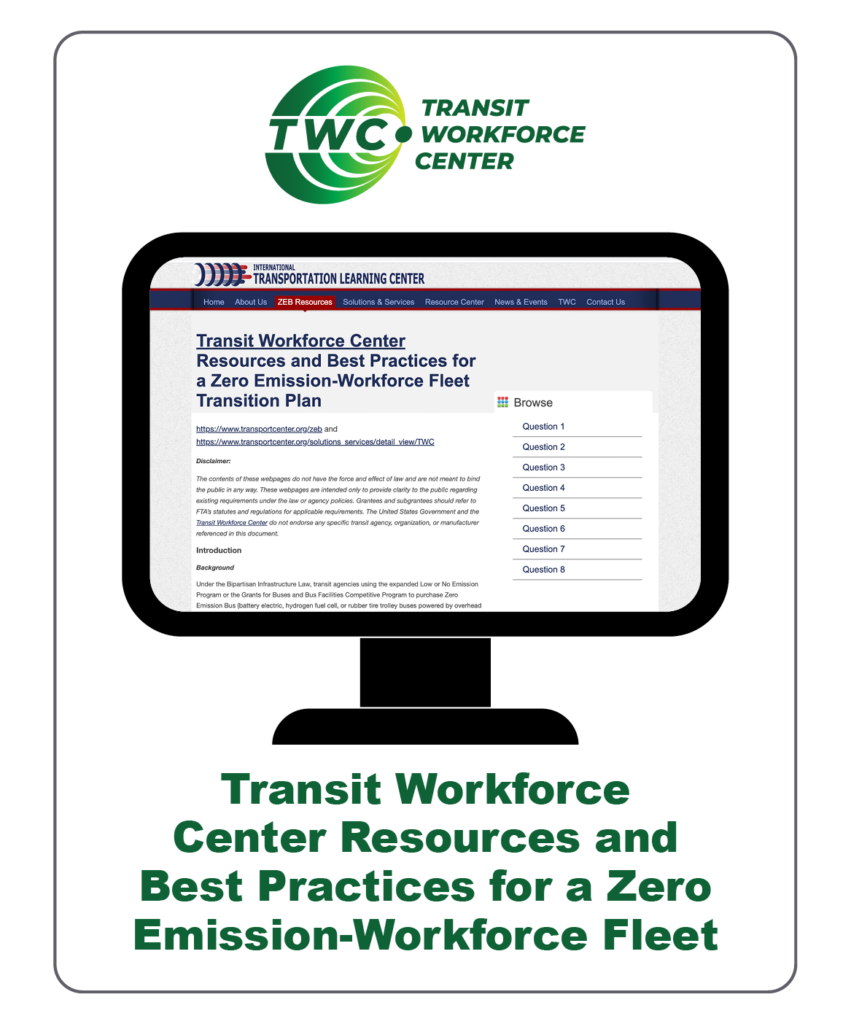
Transit Workforce Center Resources and Best Practices for a Zero Emission-Workforce Fleet Transition Plan
A supplemental resource to aid agencies seeking to develop and implement a carefully planned joint labor-management workforce strategy for the transition to a zero-emission fleet in partnership with its workforce. Examples of best practices, lessons learned, and other resources are provided to help transit agencies examine and address their workforce needs and are not intended to be all-inclusive given the unique circumstances of that transit agencies face.
Transit Workforce Center
March 2022
TOPICS: Policy and Planning , Procurement , Zero Emission Buses
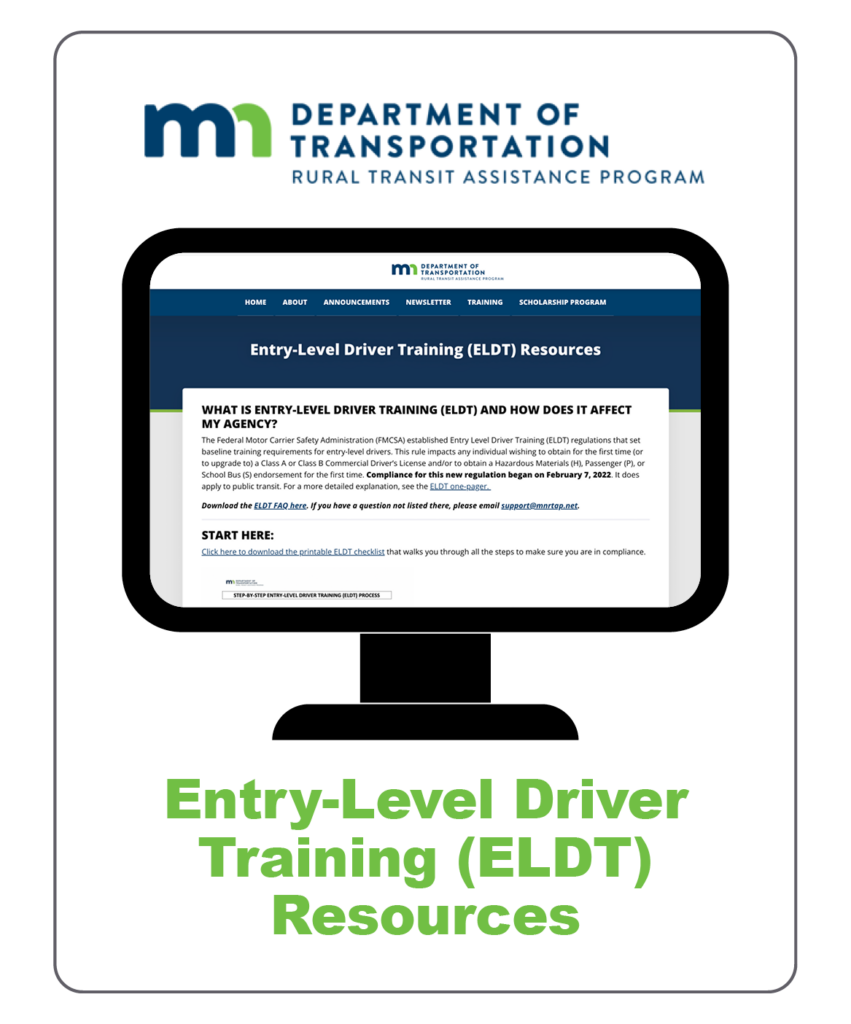
Entry-Level Driver Training (ELDT) Resources
The Federal Motor Carrier Safety Administration (FMCSA) established Entry Level Driver Training (ELDT) regulations that set baseline training requirements for entry-level drivers. This rule impacts any individual wishing to obtain for the first time (or to upgrade to) a Class A or Class B Commercial Driver’s License. These resources from the Minnesota Rural Transit Assistance Program (RTAP) provide information about the regulations, training materials, training providers, checklists, etc. to assist transit agencies in complying with regulations.
Minnesota Rural Transit Assistance Program
February 2022
TOPICS: Career Pathways , Hiring and Recruitment , Training
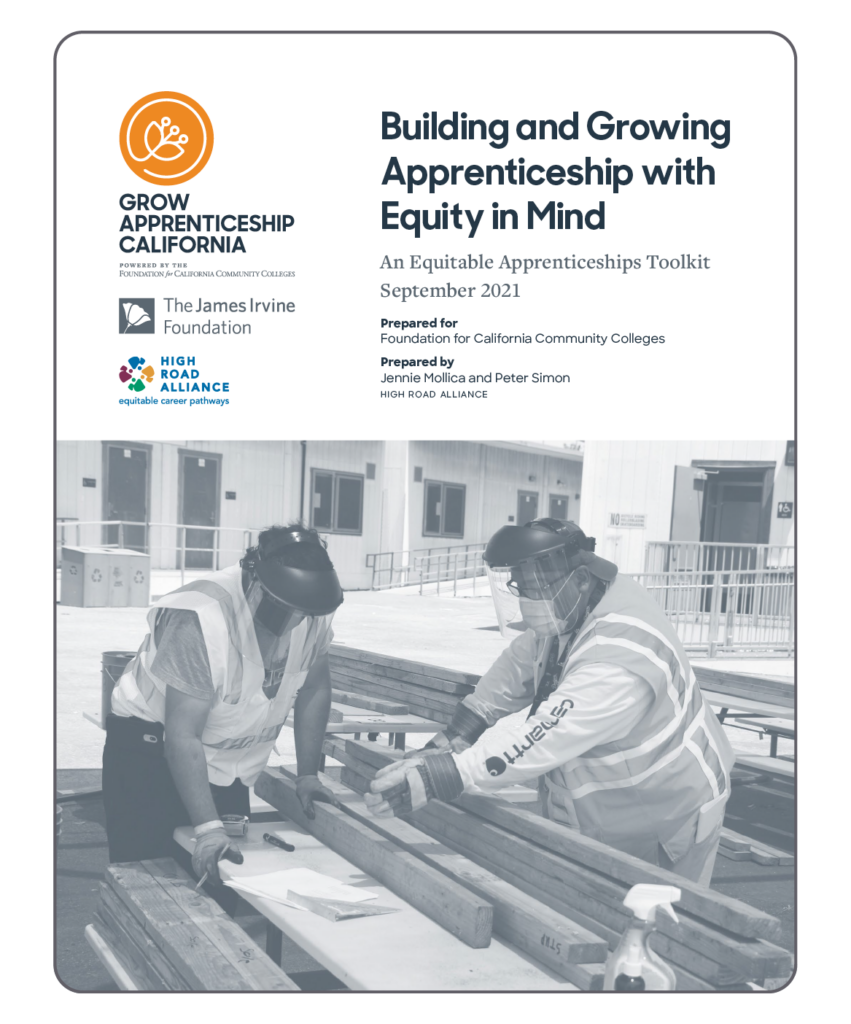
Building and Growing Apprenticeship with Equity in Mind
This toolkit was created to help those whose work involves designing and running pre-apprenticeship and apprenticeship programs to intentionally encourage and support the inclusion of apprentices who reflect the full
diversity of our communities — in terms of race, ethnicity, gender, primary language, disability, age, sexual orientation, and other factors.
High Road Alliance
September 2021
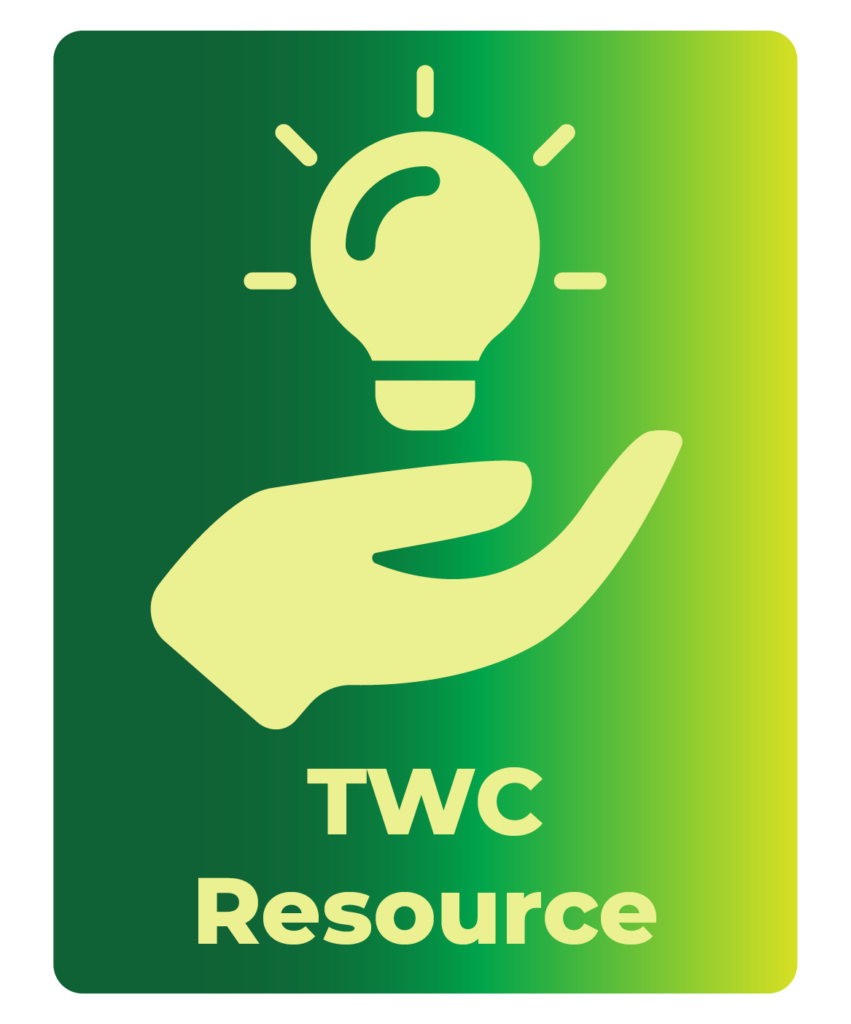
ATTAIN One-page Handout
The American Transit Training and Apprenticeship Innovators Network (ATTAIN) provides public transit agencies and their frontline workers opportunities to engage in peer exchanges about transit apprenticeships,
including their creation, structure, operation, and benefits. ATTAIN coordinates various forums that allow transit agencies with existing apprenticeship programs to share experiences in developing, strengthening, and expanding their programs. It also offers peer support and expertise to transit agencies interested in exploring the creation of new apprenticeship programs.
Check out the one-pager for quick info about ATTAIN!
Transit Workforce Center
September 2021
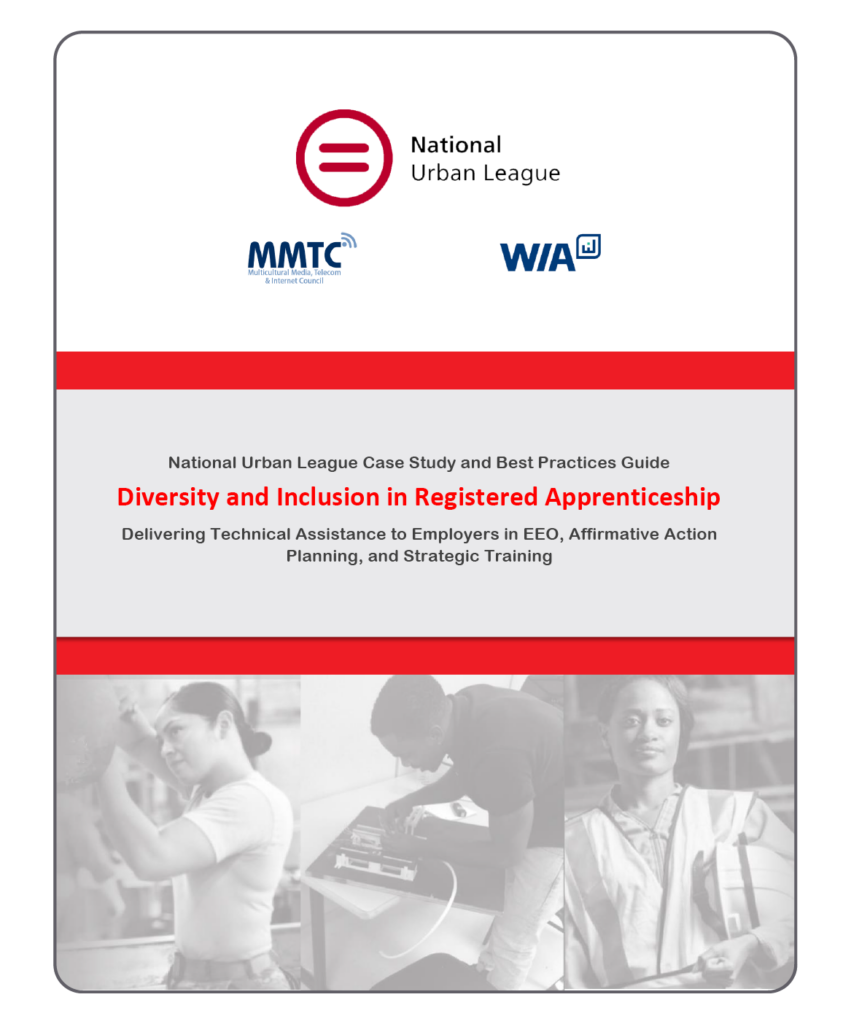
Diversity and Inclusion in Registered Apprenticeship
This case study examines the NUL Consortium’s strategies for providing technical assistance to employers as they seek to promote and diversify their Registered Apprenticeship programs. It includes a best practices toolkit detailing EEO compliance, affirmative action planning, and NUL’s employer DEIA training. It seeks to serve as a replicable guide for industry, equity, and opportunity partners, community-based organizations, and other groups or individuals with similar goals.
National Urban League
July 2021
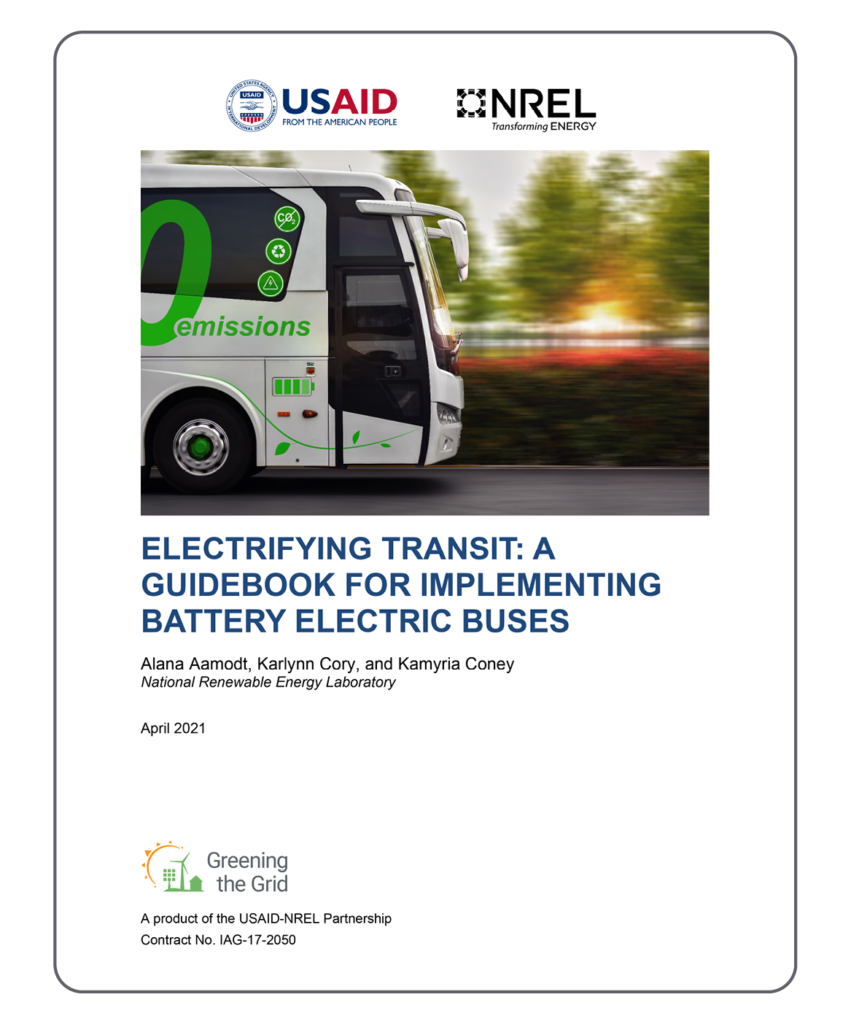
Electrifying Transit: A Guidebook for Implementing Battery Electric Buses
This guidebook assists stakeholders with interest in deploying battery-electric buses by describing decisions and considerations required for successful BEB implementation. It includes information about the benefits and barriers of BEBs, BEB basics, charging infrastructure, operation and maintenance, and costs.
United States Agency for International Development; National Renewable Energy Laboratory
April 2021
TOPICS: Procurement , Zero Emission Buses
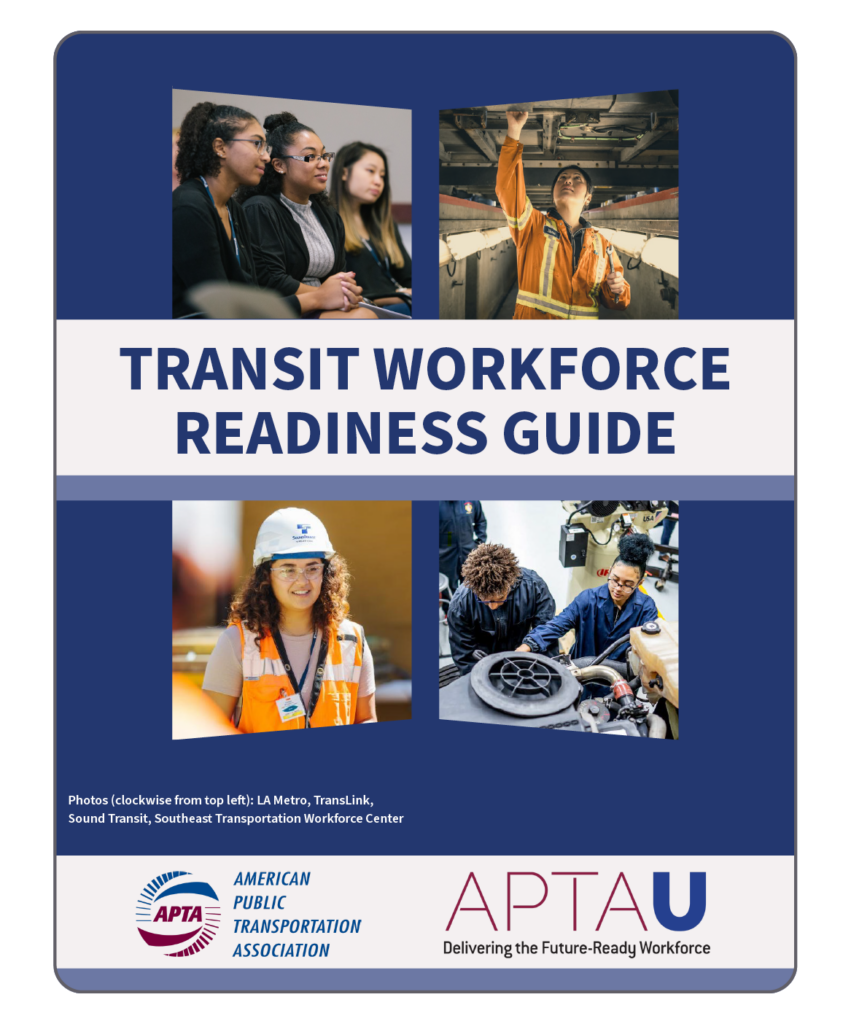
APTA Transit Workforce Readiness Guide
APTA’s Transit Workforce Readiness Guide is a highly interactive and easy-to-use online resource for executives and their staff to assist organizations in building a more diverse talent pipeline by attracting high school students, especially those coming from underserved communities, into entry-level transit positions.
American Public Transportation Association
March 2021
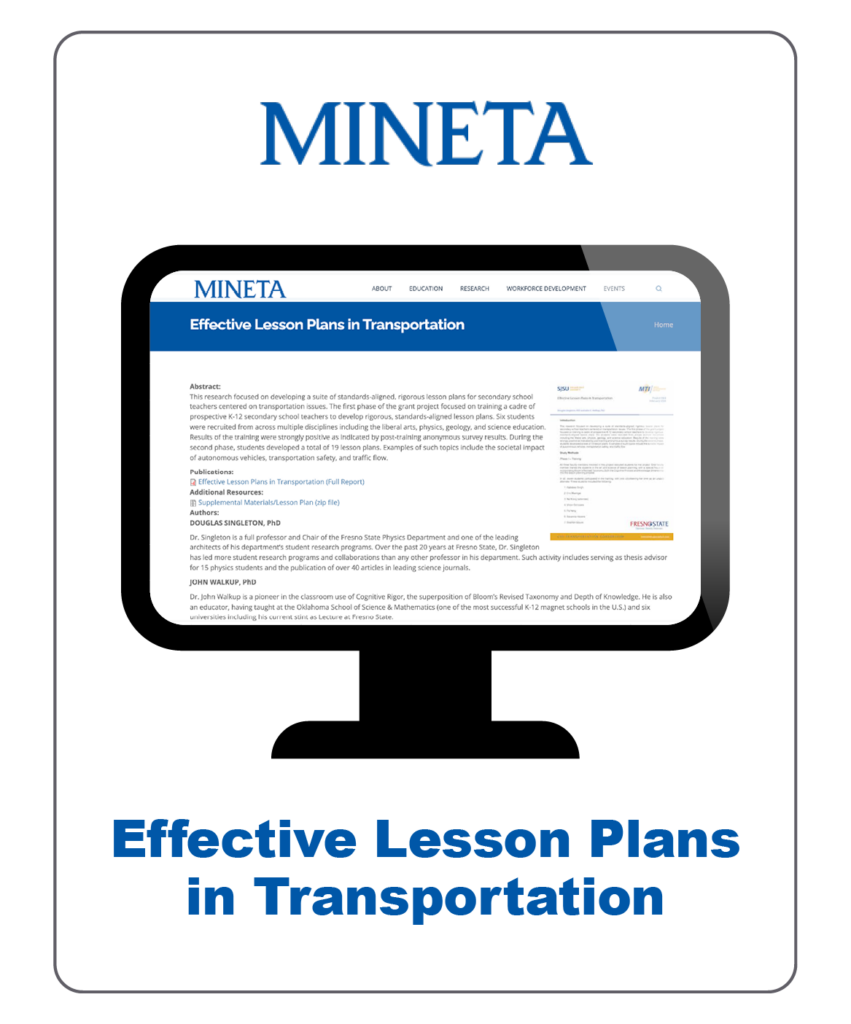
Effective Lesson Plans in Transportation
This research focuses on developing a suite of standards-aligned, rigorous lesson plans for secondary school teachers centered on transportation issues, such as the societal impact of autonomous vehicles, transportation safety, and traffic flow. It includes a report and lesson plans.
Mineta Transportation Institute
February 2021
TOPICS: Career Pathways , Policy and Planning
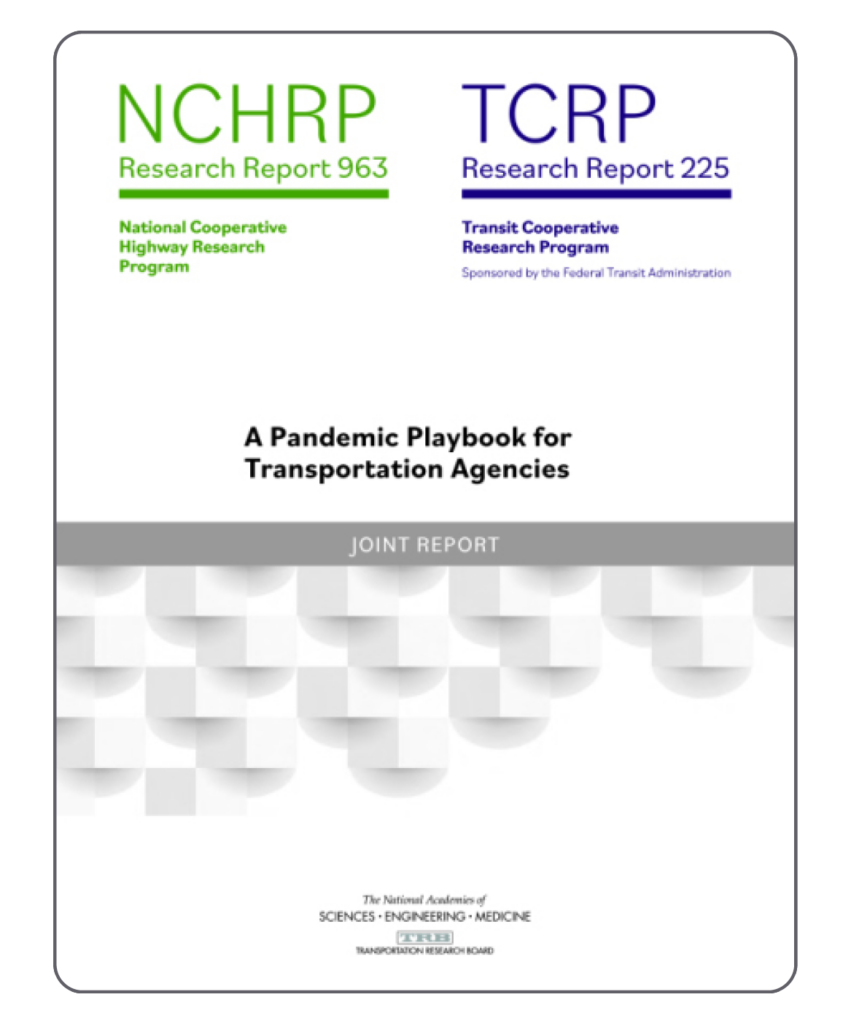
A Pandemic Playbook for Transportation Agencies
TRB’s National Cooperative Highway Research Program and Transit Cooperative Research Program have jointly issued NCHRP Research Report 963/TCRP Research Report 225: A Pandemic Playbook for Transportation Agencies, which was created to improve transportation agency responses to a pandemic.
The Playbook concentrates on what needs to be done, when and by whom. It briefly addresses planning for a pandemic, a topic addressed in greater depth in NCHRP Report 769: A Guide for Public Transportation Pandemic Planning and Response. It summarizes effective practices currently used by transportation agencies based on interviews with state departments of transportation and transit agency leaders and operational personnel, supplemented with national and international research results.
National Cooperative Highway Research Program and Transit Cooperative Research Program
January 2021
TOPICS: Policy and Planning , Safety and Health , Training
Contributor(s): National Academies of Sciences, Engineering, and Medicine; Transportation Research Board; National Cooperative Highway Research Program; Transit Cooperative Research Program; WSP USA Solutions – Deborah Matherly; Patricia Bye; Janet Benini
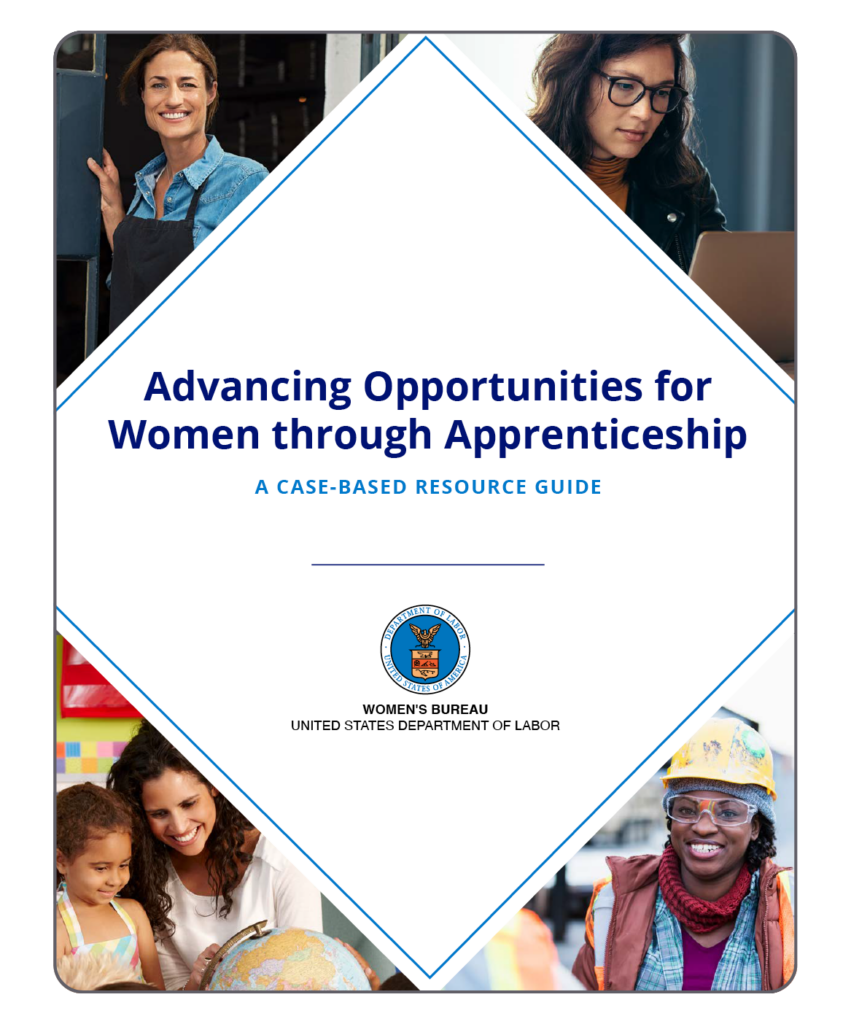
Advancing Opportunities for Women through Apprenticeship: A Case-Based Resource Guide
The Advancing Opportunities for Women through Apprenticeship case-based resource guide provides a framework for meaningful expansion of apprenticeship programs for women. The guide includes case studies on four high-quality, women-inclusive pre-apprenticeship and apprenticeship programs in a range of industry sectors.
Department of Labor
The case studies were developed through on-site visits to the program locations; interviews with program staff, partners, and current and former participants; and a review of program materials and data. They provide information and insights related to partnership development, program design, and outcomes that outline how pre-apprenticeship and apprenticeship programs can help women access family-sustaining jobs and quality career pathways. The guide identifies common strategies across the four programs to help others learn how to create programs that successfully open pathways to in-demand jobs for women through apprenticeships.
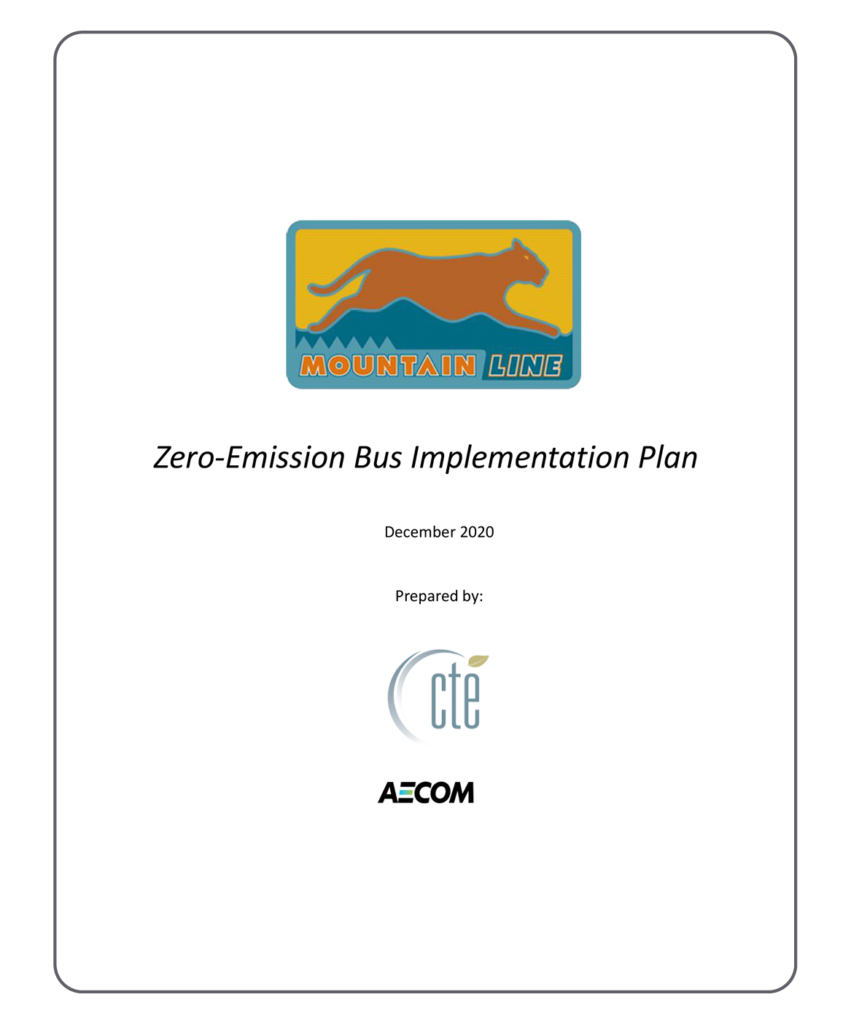
Mountain Line Zero-Emission Bus Implementation Plan
This is the Zero Emission Bus (ZEB) Implementation Plan prepared by the Northern Arizona intergovernmental Public Transportation Authority (referred to as Mountain Line) in contract with the Center for Transportation and the Environment (CTE) with the aim of identifying a zero-emission roadmap for full-scale deployment.
Center for Transportation and the Environment; AECOM
December 2020
TOPICS: Procurement , Safety and Health , Training , Zero Emission Buses
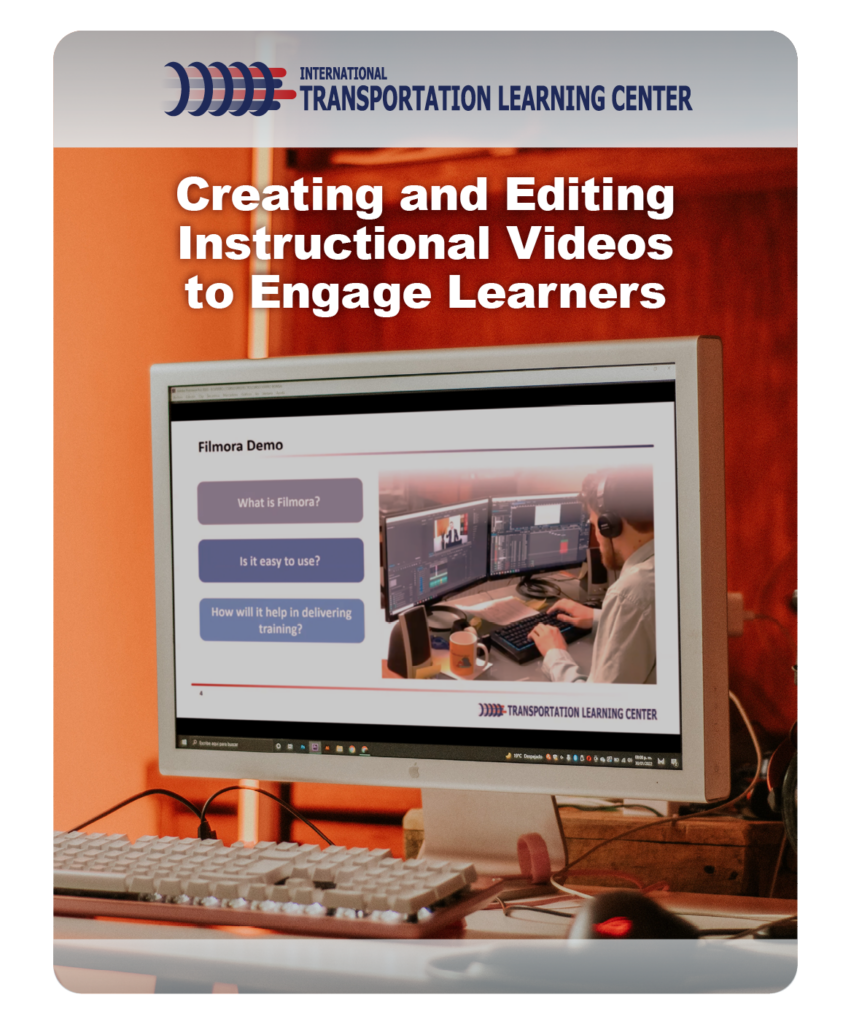
Creating and Editing Instructional Videos to Engage Learners
Beyond the traditional classroom environment, one way transit trainers can enhance delivery is through video instruction. This recorded webinar demonstrates Filmora™, an affordable and easy-to-use platform that helps you create video instruction modules.
This is one of several skill booster events held by the International Transportation Learning Center (ITLC).
International Transportation Learning Center
November 2020
TOPICS: Trainer and Mentor Development , Training
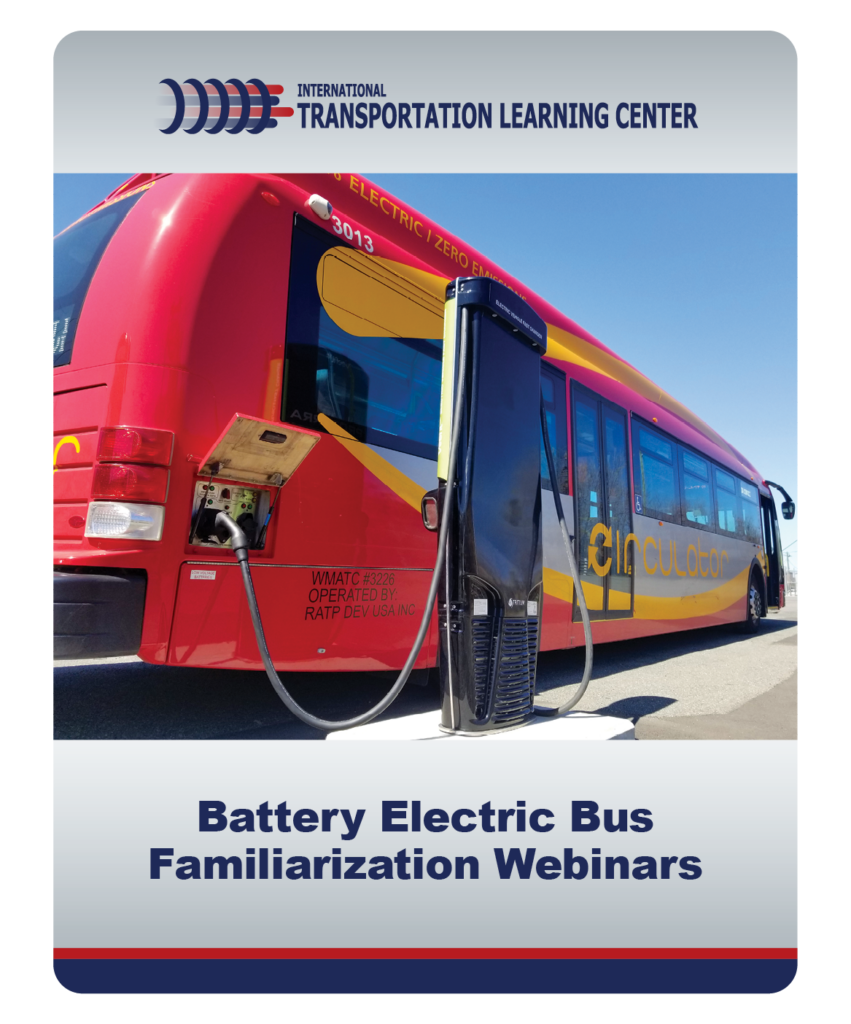
Battery Electric Bus Familiarization Webinars
The International Transportation Learning Center presents three distance-based courses to help transit bus technicians gain fundamental understanding of battery electric bus (BEB) technology. These courses are recorded from live online sessions.
International Transportation Learning Center
June 2020
TOPICS: Safety and Health , Training , Zero Emission Buses
In each session, experts from various BEB manufacturers presented on specific topics, with over 400 participants attending. Each session is introduced by John Schiavone, who moderated many questions from participants. Please click through the drop-down options below to view the recorded sessions, slides and presenters’ notes, and sample tests and test answers.
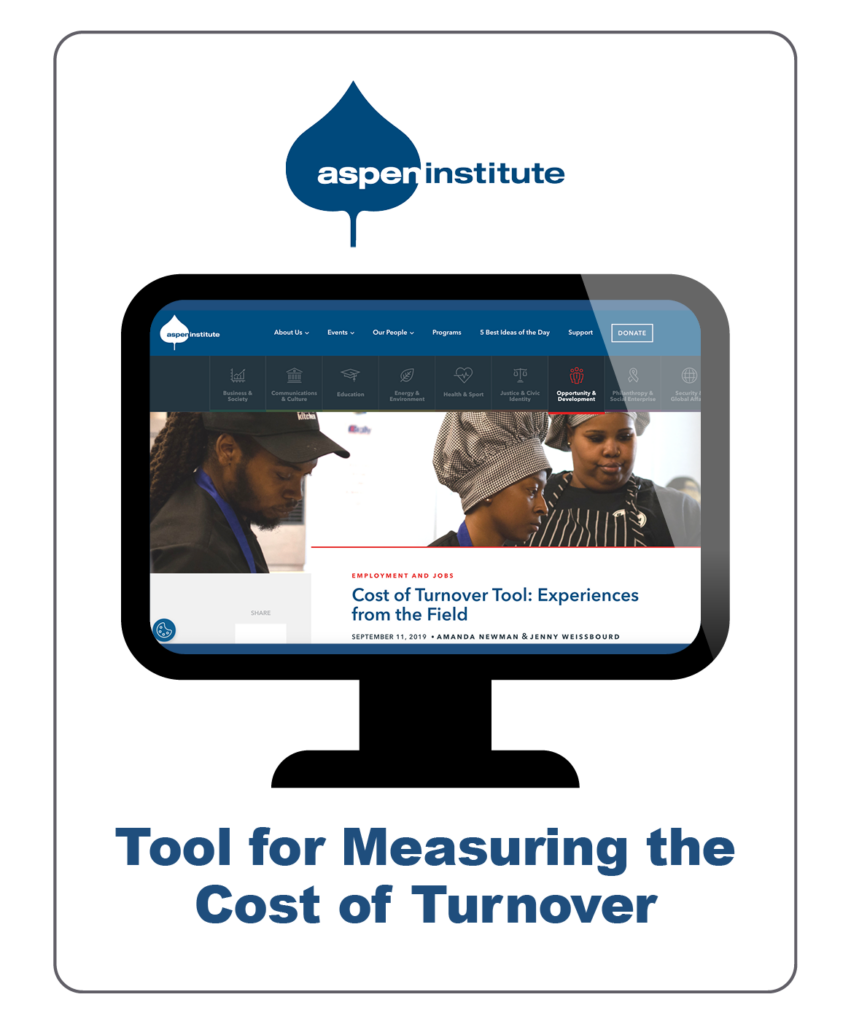
Tool for Measuring the Cost of Turnover
This Cost of Turnover Tool is a simple, “back of the envelope” calculator to help estimate how much it costs to replace staff. The tool can be useful for transit agencies looking to understand the costs of a low retention rate, or those looking to calculate the return-on-investment of mentoring or apprenticeship programs.
Aspen Institute
March 2019
TOPICS: Apprenticeship , Mentorship , Policy and Planning , Program Evaluation and ROI , Retention
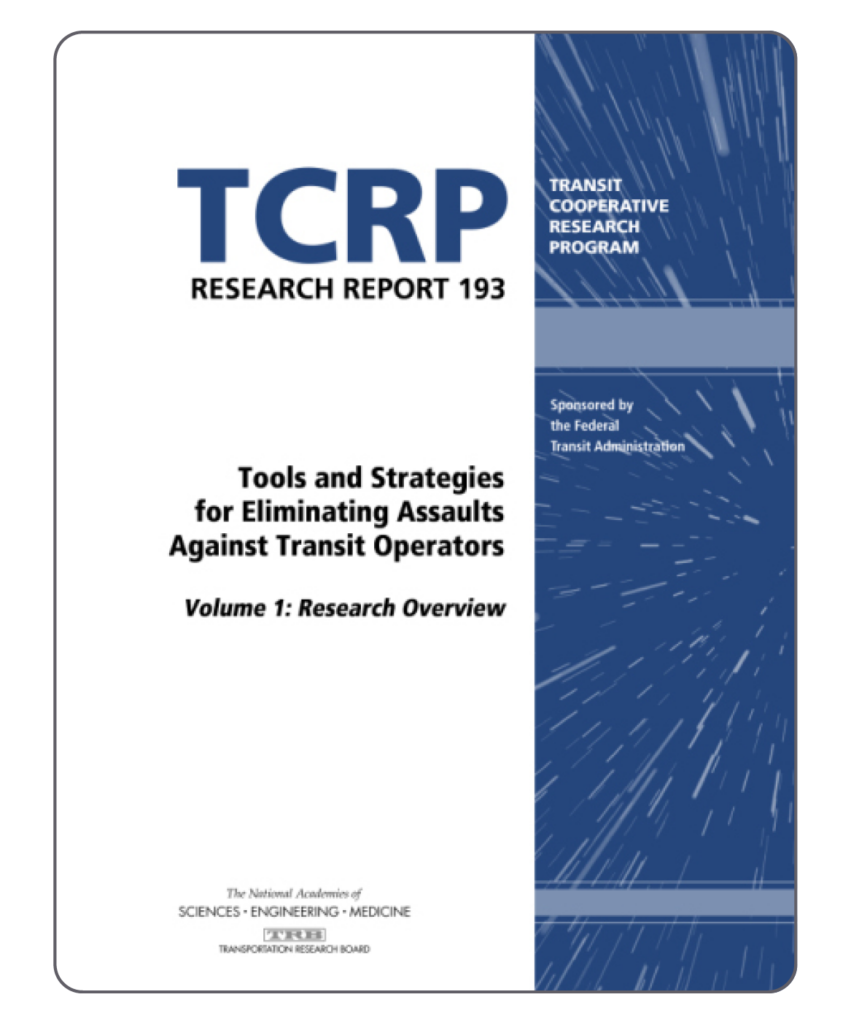
Tools and Strategies for Eliminating Assaults Against Transit Operators
This TCRP report documents policies, practices, and operating procedures related to preventing, mitigating, and responding to operator assaults. The varied format, scale, and implementation of policies and procedures set by transit agencies can shape mitigation approaches. Relevant skills and training required by transit operators to address this issue vary as well.
Transit Cooperative Research Program
May 2018
TOPICS: Policy and Planning , Safety and Health
Volume 1 documents the materials used to develop the report and Volume 2, the user guide, provides potential countermeasures and strategies to prevent or mitigate assaults against transit operators, including an operator assault risk management toolbox, vulnerability self-assessment tool, route-based risk calculator, as well as supportive checklists, guidelines, and methodologies.
Contributor(s): National Academies of Sciences, Engineering, and Medicine; Transportation Research Board; Transit Cooperative Research Program; Countermeasures Assessment and Security Experts, LLC and Transportation Resource Associates, Inc.
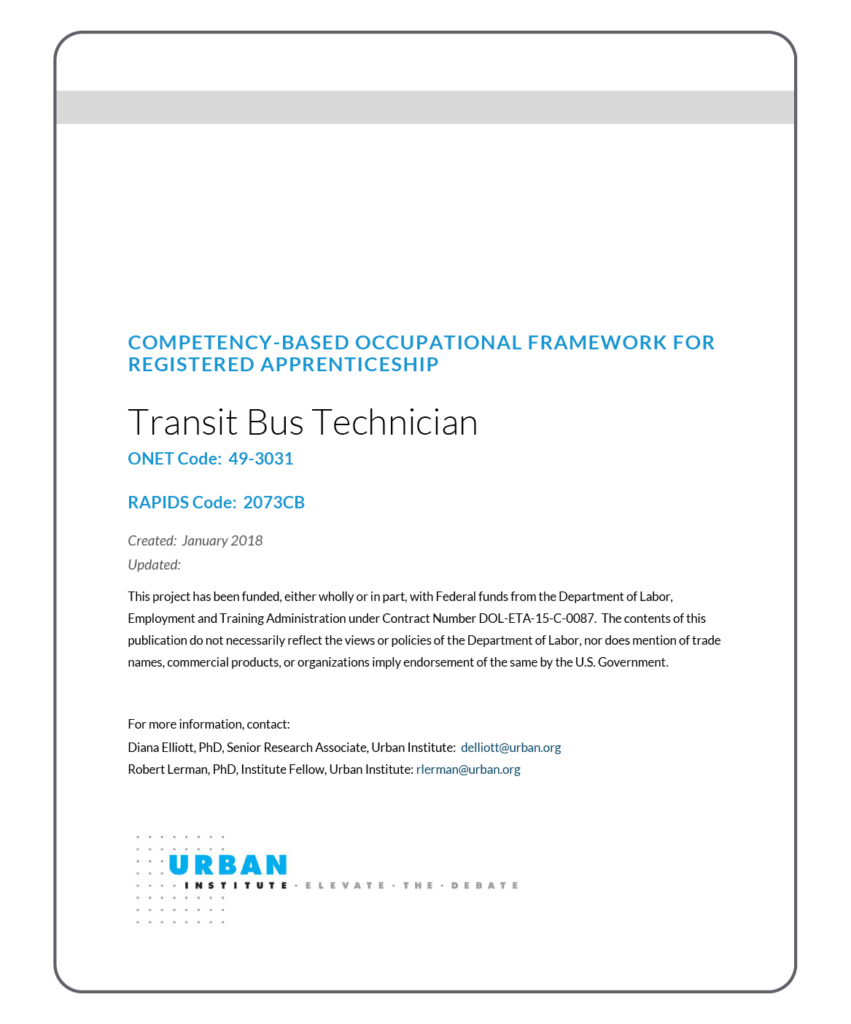
Bus Maintenance Apprenticeship Framework
The Bus Maintenance Apprenticeship Framework was developed by the National Bus Maintenance Apprenticeship Committee and approved by the U.S. DOL. It is a competency based framework that includes all of the tasks an apprentice should be able to demonstrate as a result of the training. Tasks are based on the ASE task list and APTA training standards. It is only a guide, locations can add or remove tasks to suit their individual operations.
The framework spreadsheet was developed by ITLC as a more in-depth and customizable version of the Bus Maintenance Apprenticeship Framework. Note the various tabs at the bottom for each Job Function.
International Transportation Learning Center; The Urban Institute
January 2018
TOPICS: Apprenticeship , Training , Zero Emission Buses
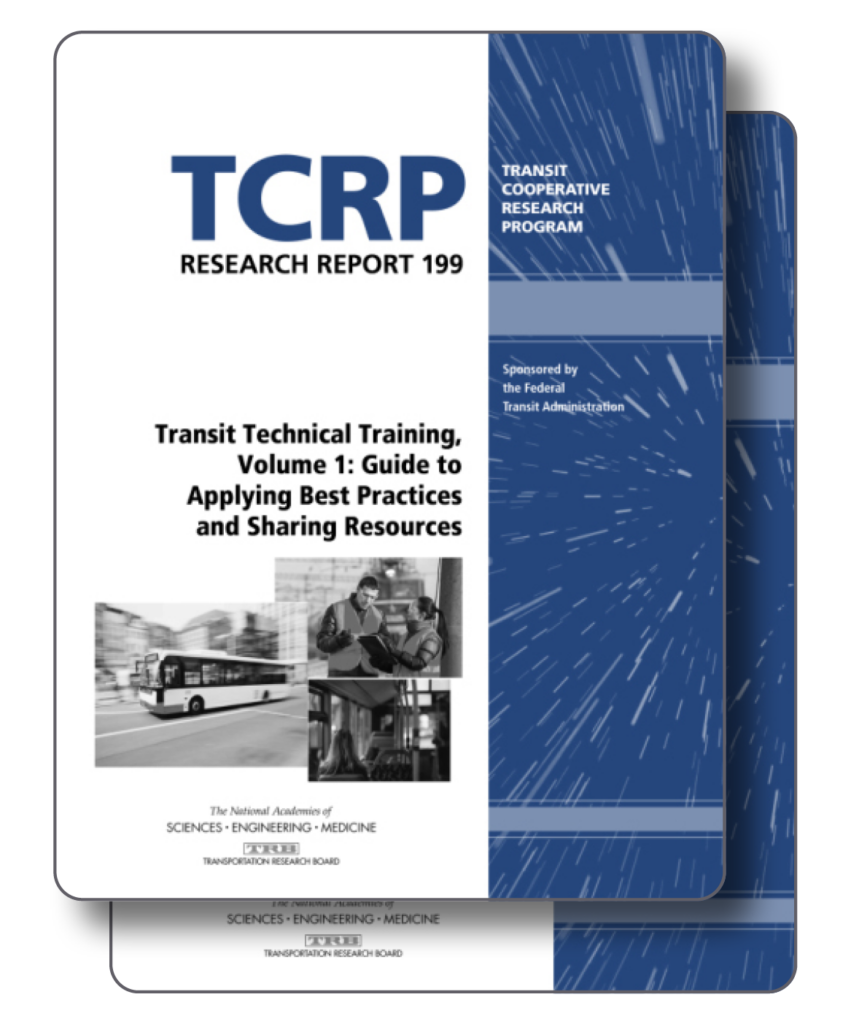
TCRP Research Report 199: Transit Technical Training (Volumes 1 & 2)
TCRP Research Report 199: Transit Technical Training is a two-volume set that presents guidance on technical training programs and the implementation of those for transportation agencies.
The report’s first volume, Guide to Applying Best Practices and Sharing Resources, documents the best models of technical training programs serving U.S. and international transportation agencies and related industries.
The second volume, Guide to Overcoming Barriers to Implementing Best and Innovative Training, provides public transportation agencies with best practices, strategies, and resources to assist with the implementation of effective and innovative training programs and techniques for frontline employees.
Transit Cooperative Research Program (TCRP)
January 2018
TOPICS: Apprenticeship , Safety and Health , Training
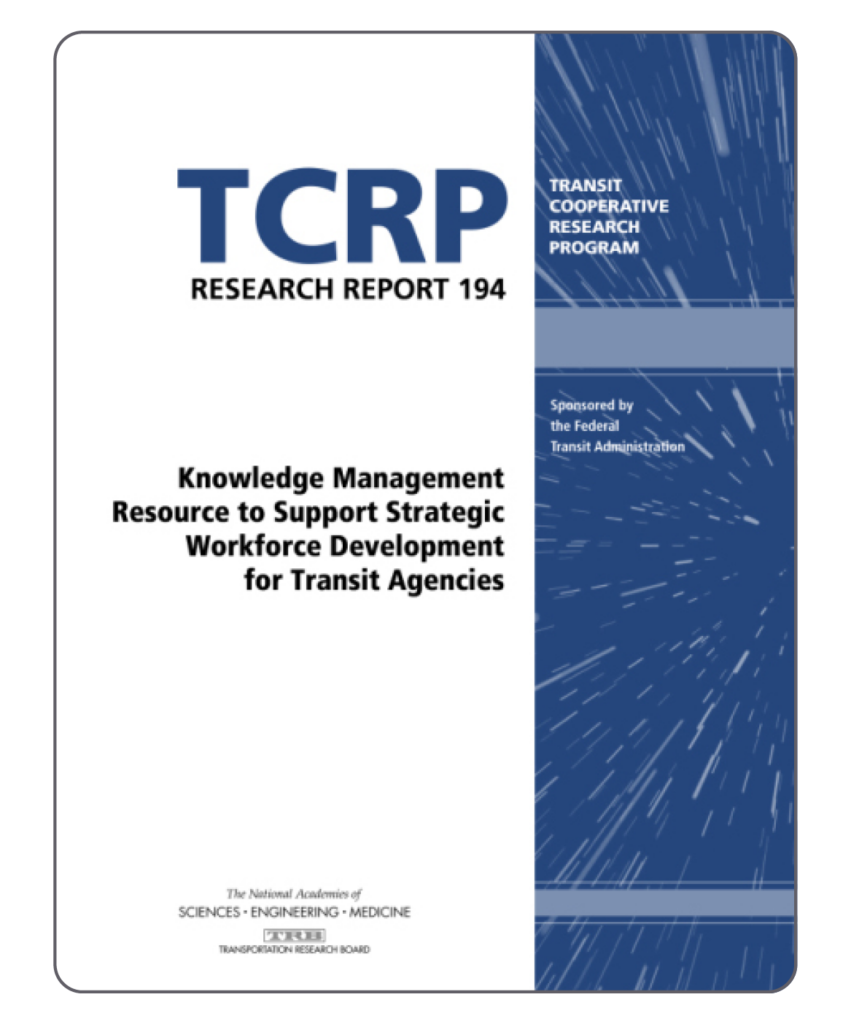
Knowledge Management Resource to Support Strategic Workforce Development for Transit Agencies
TRB’s Transit Cooperative Research Program (TCRP) Research Report 194: Knowledge Management Resource to Support Strategic Workforce Development for Transit Agencies explores the importance of knowledge management (KM), which is an organization’s process for collecting, storing, and sharing organizational information and knowledge, and provides guidance on implementing KM strategies in transit agencies. In addition, the guidance includes action plans for developing particular aspects of KM, analysis of KM strategies at several transit agencies, and a catalog of KM technology tools and resources.
Transit Cooperative Research Program (TCRP)
January 2018
TOPICS: Policy and Planning , Program Evaluation and ROI , Retention
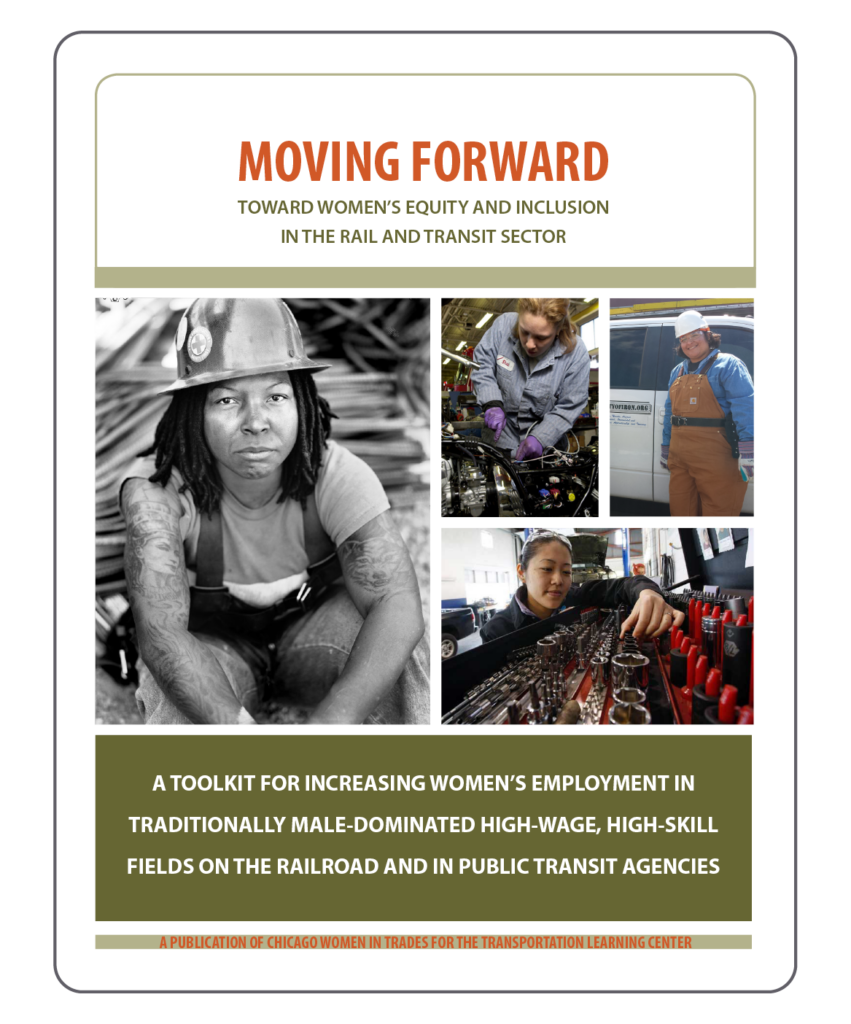
Moving Forward: Toward Women’s Equity and Inclusion in the Rail and Transit Sector
International Transportation Learning Center; Chicago Women in the Trades
July 2017
This toolkit is premised on the understanding that transit agencies have little knowledge of and tools for recruiting and assessing new female entrants to the workforce and promoting incumbent workers for skilled trade jobs in rail and transit. It also recognizes that women themselves have little information about the entry routes, requirements and benefits of jobs in these fields and without targeted and concerted effort from either the companies, agencies, unions, workforce development system, and educational institutions, most women will continue to be steered towards traditional female careers.
The resources in this toolkit will support the recruitment, training, and retention of women in nontraditional apprenticeship and jobs in the rail and transit sector. The toolkit can be used by program planners, managers, and frontline staff conducting outreach and assessment and training, to ensure that each stage of the employment process—from recruitment through retention—looks at how the workplace environment can be responsive to women of many backgrounds and how systems can be created or improved to address the barriers women face.
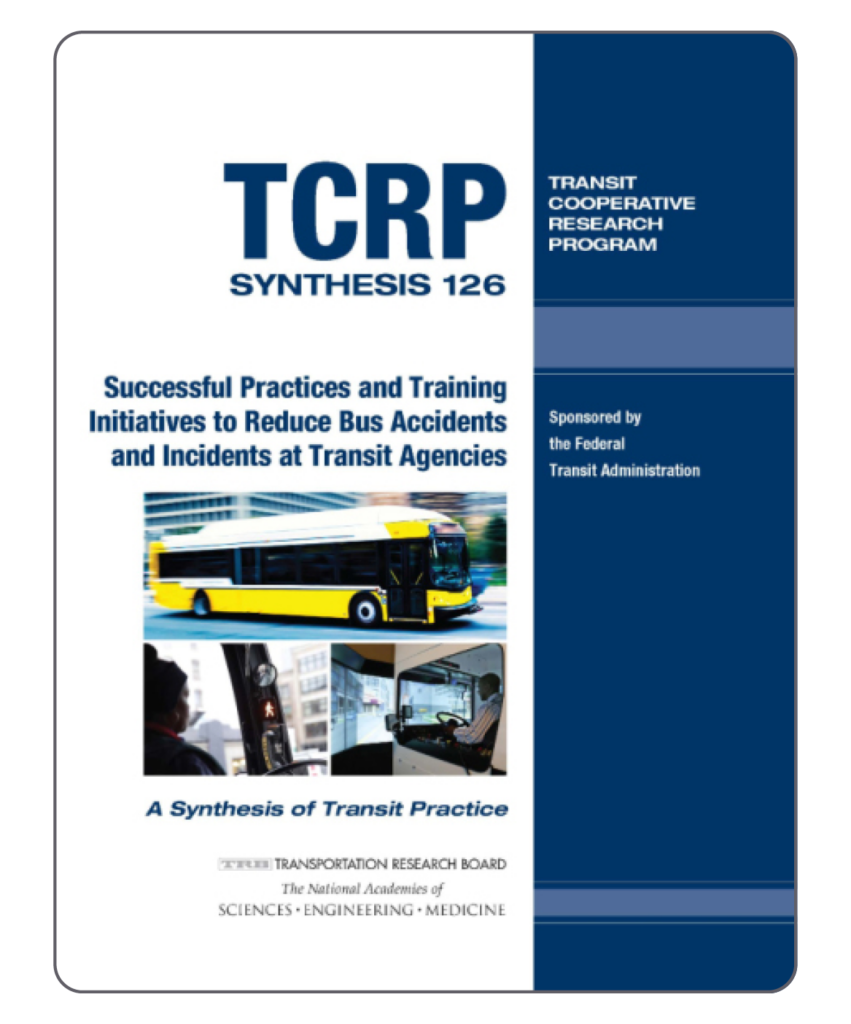
Successful Practices and Training Initiatives to Reduce Accidents and Incidents at Transit Agencies
TRB’s Transit Cooperative Research Program (TCRP) Synthesis 126: Successful Practices and Training Initiatives to Reduce Accidents and Incidents at Transit Agencies documents current practices and training initiatives, including bus operator training and retraining programs that have been effective in reducing accidents and incidents at transit agencies. The study also focuses on other system approaches that have been implemented to address safety hazards. These approaches include various technology applications, infrastructure modifications, and programs and initiatives such as driver incentive programs and close call/near miss reporting.
Transit Cooperative Research Program (TCRP) & CUTR
January 2017
TOPICS: Safety and Health , Training
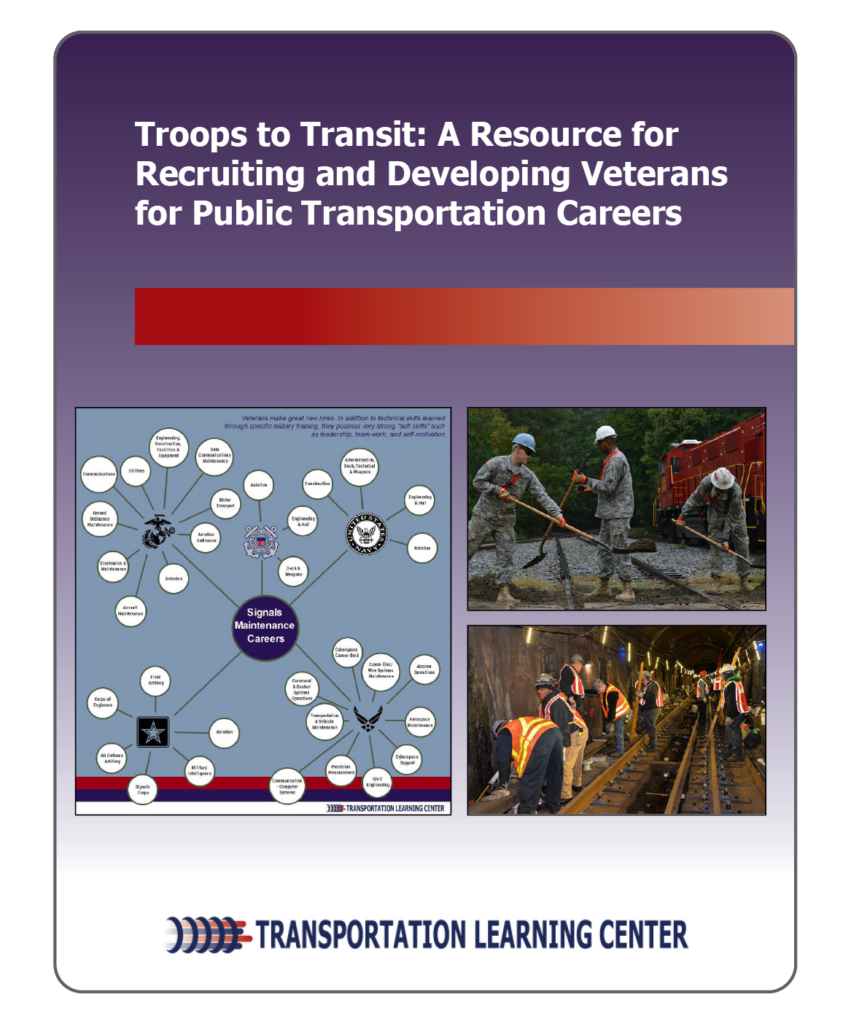
Troops to Transit: A Resource for Recruiting and Developing Veterans for Public Transportation Careers
The International Transportation Learning Center’s analysis of Bureau of Labor Statistics data has shown that the transportation industry in large will likely see a massive front-line labor shortage in the next ten years unless it is able to find and hire skilled workers. In fact, it is estimated that 126 percent of today’s transit workforce will have to be hired and trained in the next ten years.
In order to help fill this need, the center has produced a Veterans Crosswalk tool (see Excel document below) which matches skill-sets learned during military service with the kinds of skills that public transportation agencies look for when hiring signals maintainers. This product was produced in cooperation with a Veterans Taskforce made up of veterans who are also Subject Matter Experts in the field of Signals Maintenance. This detailed matrix has been distilled down into a user-friendly Veteran’s Factsheet (see PDF below) which provides at-a-glance information for both veterans interested in a signals career and for agencies looking to hire skilled veterans.
The tool is accompanied by a summary report.
International Transportation Learning Center
November 2016
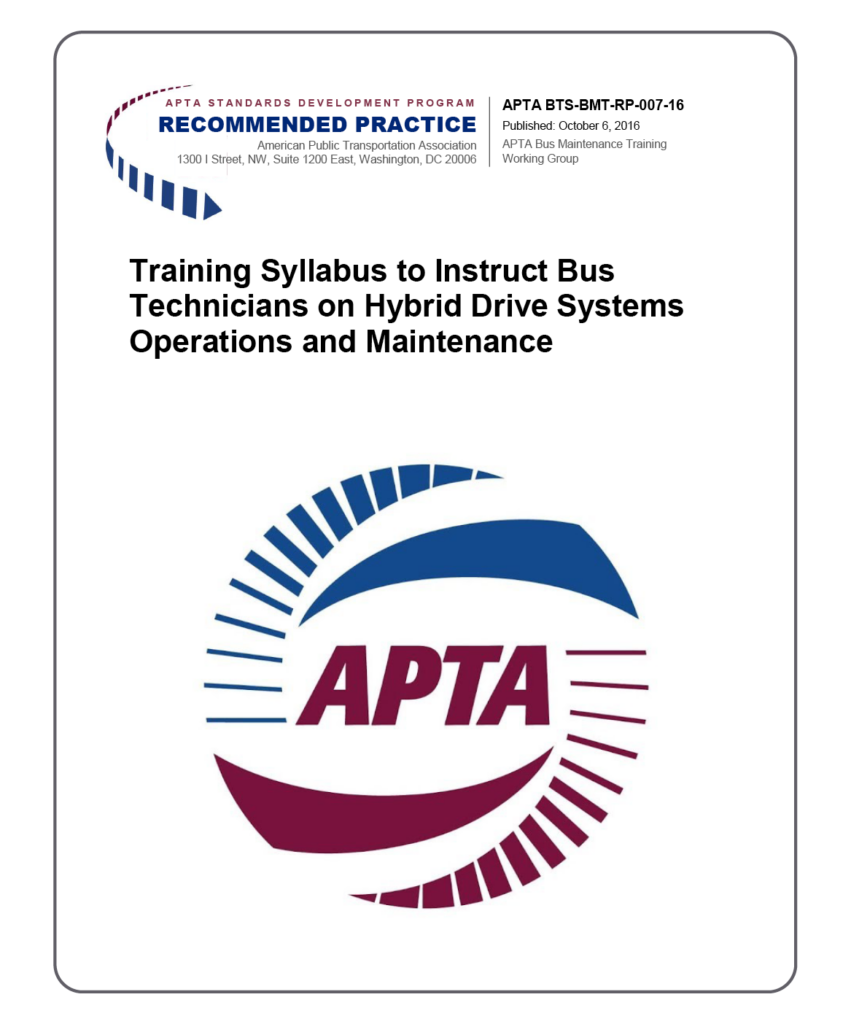
Training Syllabus to Instruct Bus Technicians on Hybrid Drive Systems Operations and Maintenance
This Recommended Practice provides guidelines for establishing a standardized bus maintenance training program related to the theory of operation, maintenance and troubleshooting of bus hybrid drive transmissions and related equipment.
American Public Transportation Association
October 2016
TOPICS: Training
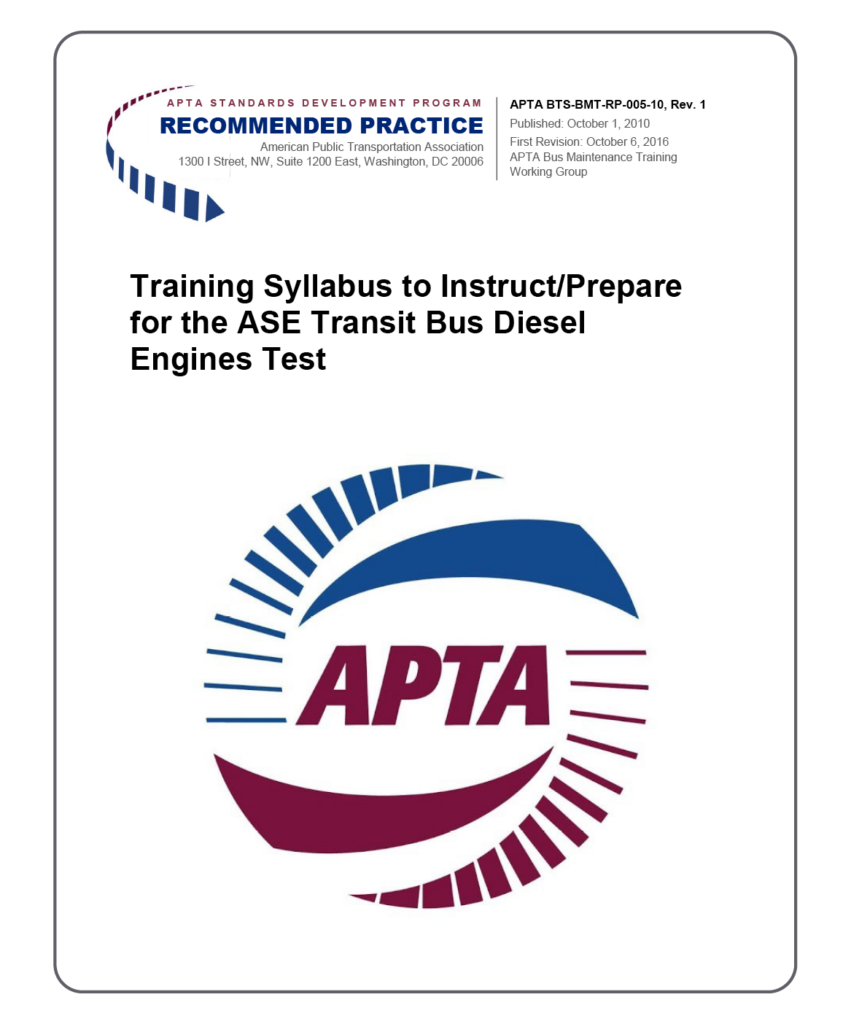
Training Syllabus to Instruct/Prepare for the ASE Transit Bus Diesel Engines Test
This Recommended Practice provides guidelines for establishing a standardized bus maintenance training program related to the Automotive Service Excellence (ASE) certification program syllabus for the diesel engines used in transit buses and coaches.
American Public Transportation Association
October 2016
TOPICS: Training
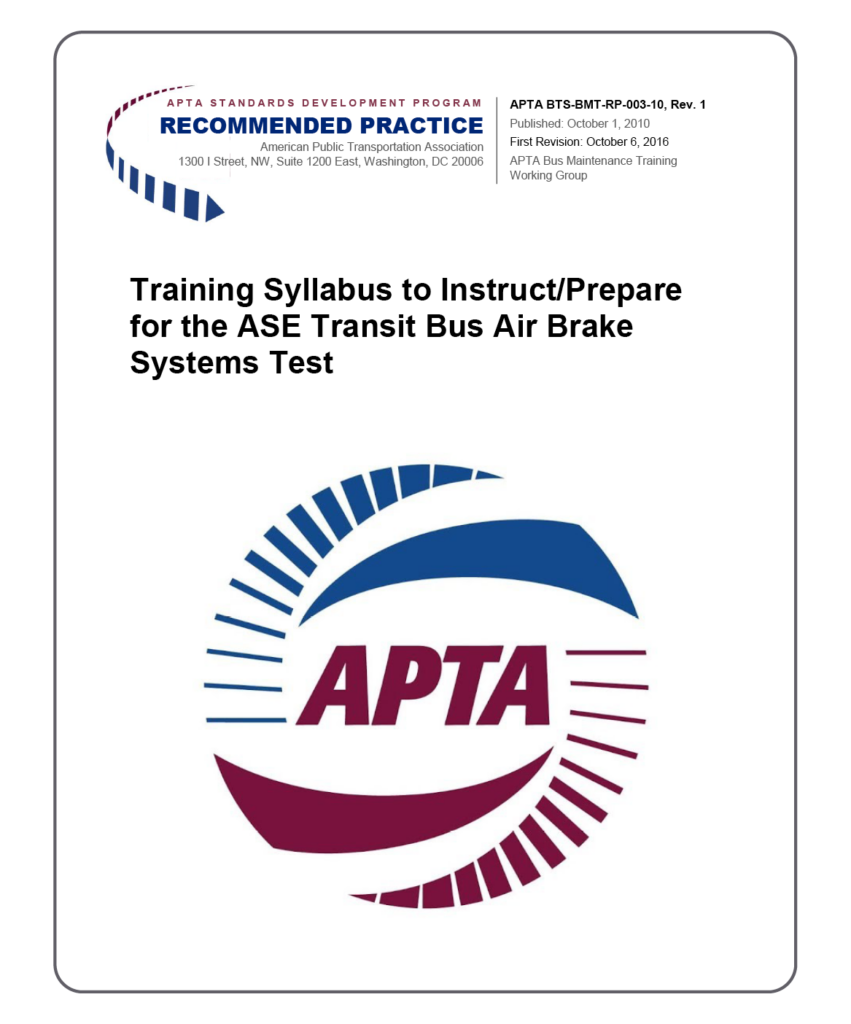
Training Syllabus to Instruct/Prepare for the ASE Transit Bus Air Brake Systems Test
This Recommended Practice provides guidelines for establishing a standardized bus maintenance training program related to the Automotive Service Excellence (ASE) certification syllabus for transit bus and coach air brake systems.
American Public Transportation Association
October 2016
TOPICS: Training
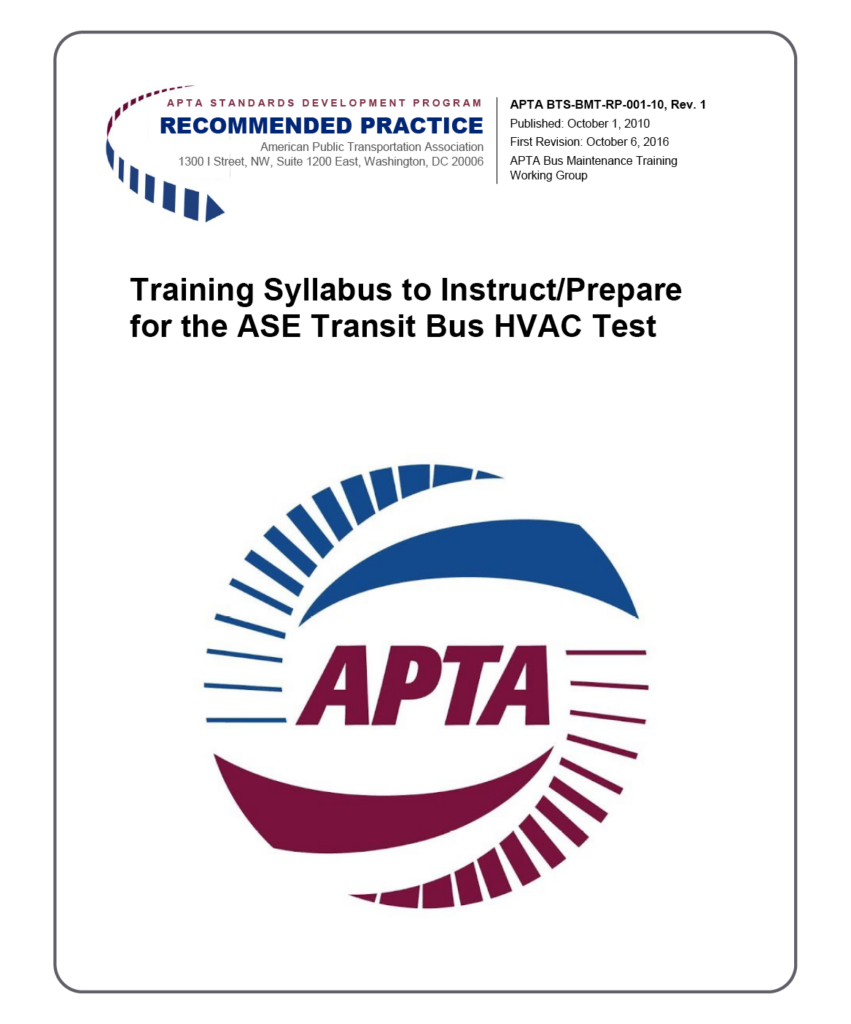
Training Syllabus to Instruct/Prepare for the ASE Transit Bus HVAC Test
This Recommended Practice provides guidelines for establishing a standardized bus maintenance training related to the Automotive Service Excellence (ASE) certification program syllabus for heating, ventilation, and air conditioning (HVAC) systems used in transit buses and coaches.
American Public Transportation Association
October 2016
TOPICS: Training
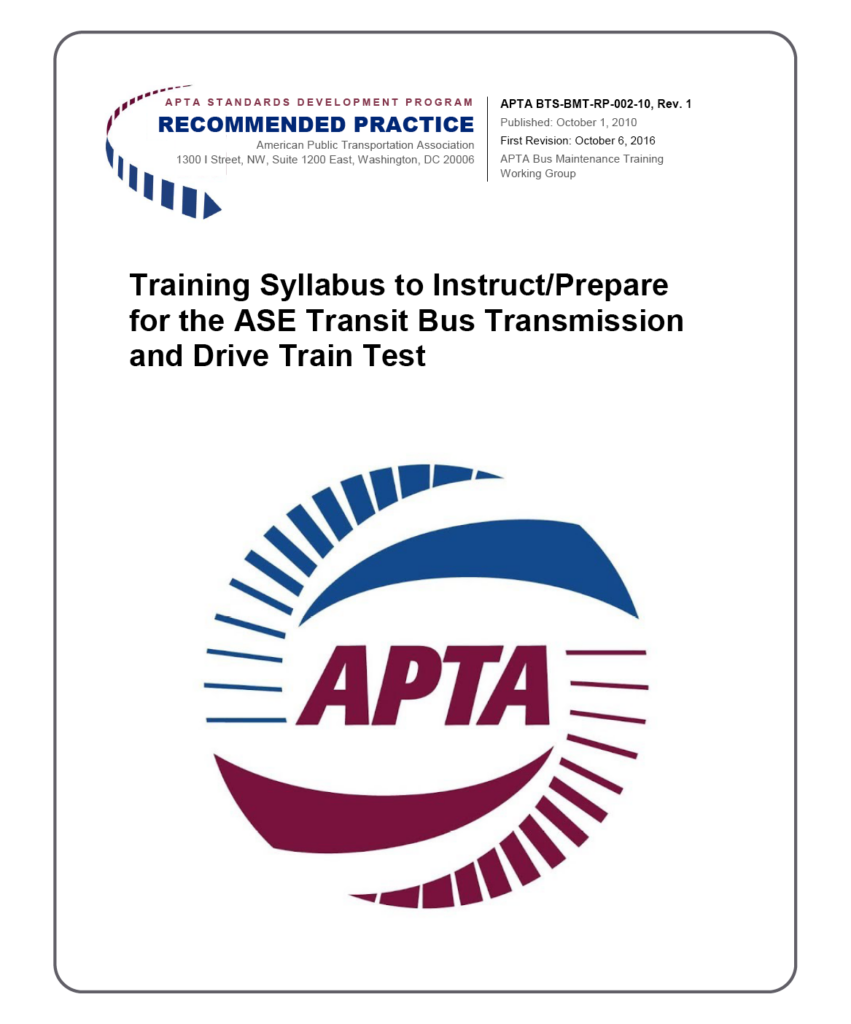
Training Syllabus to Instruct/Prepare for the ASE Transit Bus Transmission and Drivetrain Test
This Recommended Practice provides guidelines for establishing a standardized bus maintenance training related to the Automotive Service Excellence (ASE) certification program syllabus for transmissions and drivetrains used in transit buses and coaches.
American Public Transportation Association
October 2016
TOPICS: Training
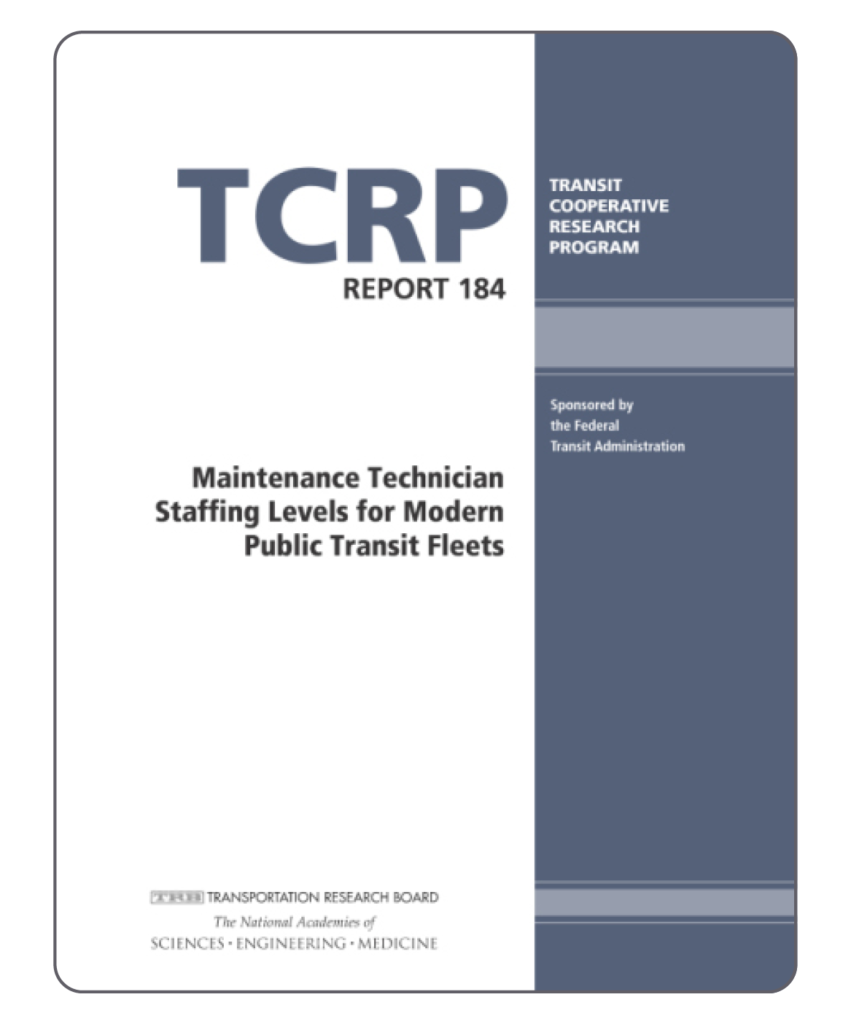
Maintenance Technician Staffing Levels for Modern Public Transit Fleets
This report identifies existing tools and practices used to determine optimum maintenance technician staffing levels and provides an analysis of variables that influence maintenance technician staffing needs. A Microsoft Excel maintenance staffing calculator and user guide is available.
Transit Cooperative Research Program
August 2016
Contributor(s): National Academies of Sciences, Engineering, and Medicine; Transportation Research Board; Transit Cooperative Research Program; Ken Mall; June Sekera; the Transportation Learning Center and Transit Resource Center
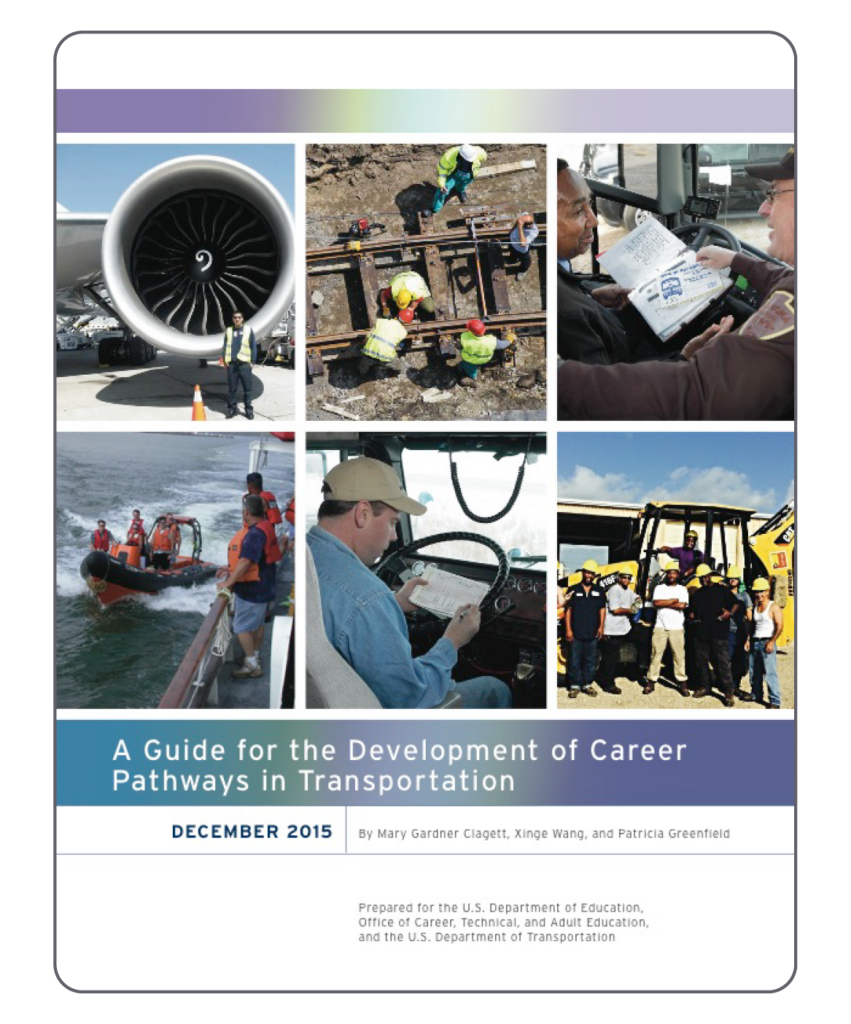
A Guide for the Development of Career Pathways in Transportation
This guide outlines the steps that transportation industry stakeholders can take to develop or expand Career Pathways to focus on the skills, competencies, and credentials needed for high-demand jobs in the transportation industry and its subsectors.
U.S. Department of Education; Jobs for the Future; International Transportation Learning Center
December 2015
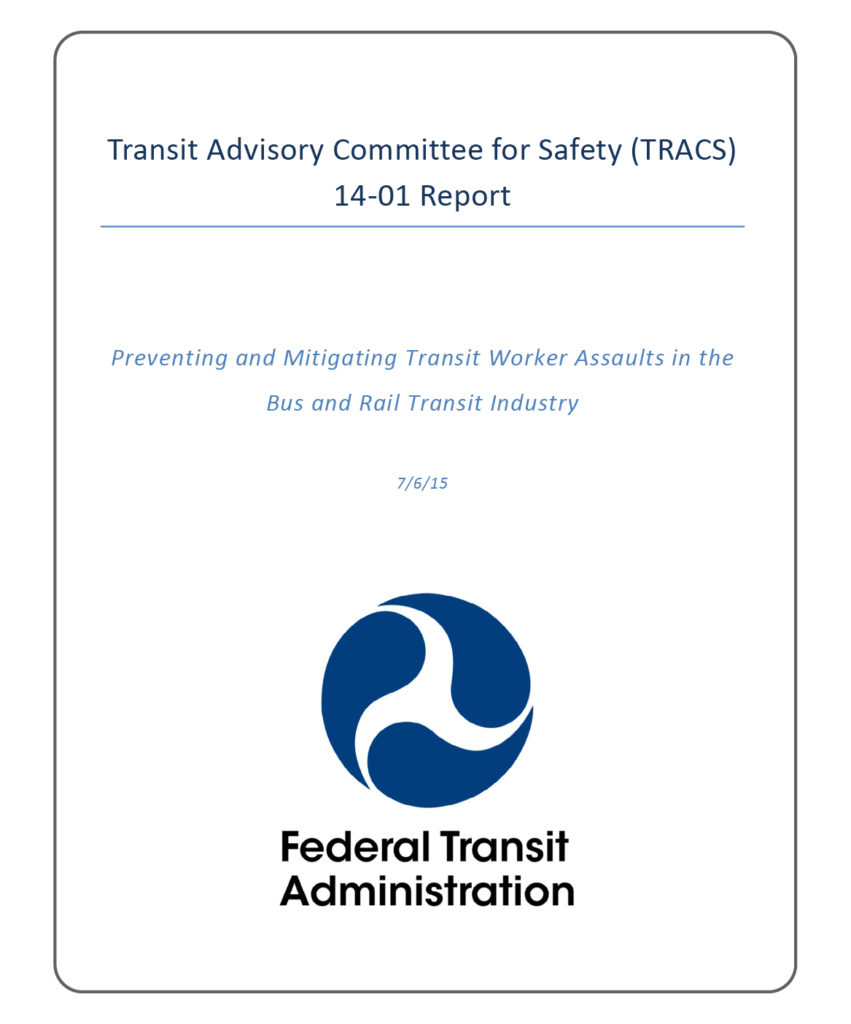
Preventing and Mitigating Transit Worker Assaults in the Bus and Rail Transit Industry
This report provides recommendations from state and local transportation agencies, labor unions, research organizations, and national transportation associations to address the elements of a safety management system (SMS) approach to preventing and mitigating transit worker assaults, including policy, risk management, safety promotion, and safety assurance.
Transit Advisory Committee for Safety
July 2015
TOPICS: Retention , Safety and Health
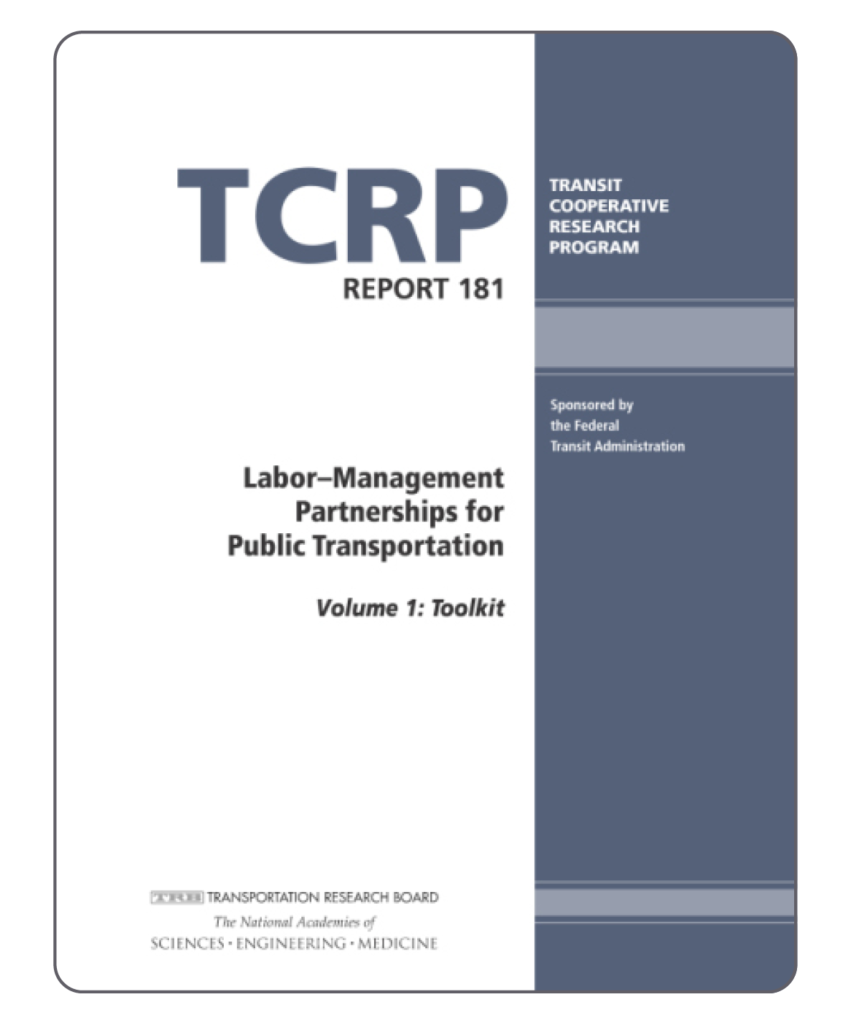
Labor-Management Partnerships for Public Transportation, Volume 1: Toolkit
This toolkit provides resources for public transportation management and labor union leaders to establish, manage, and improve labor-management partnerships. It includes a description of the development of a labor-management partnership charter, recommended actions for both management and labor union leaders, and a workshop framework to prepare management and union representatives with essential skills for establishing and managing labor-management partnerships.
Transit Cooperative Research Program
January 2015
TOPICS: Apprenticeship , Labor-Management Partnerships , Training
Volume 2 of this report provides background material that was used to develop this toolkit.
Contributor(s): National Academies of Sciences, Engineering, and Medicine; Transportation Research Board; Transit Cooperative Research Program; Scott Baker; Chuyuan (Viktor) Zhong; Douglas Taylor; William F. Scott; Richard Plante
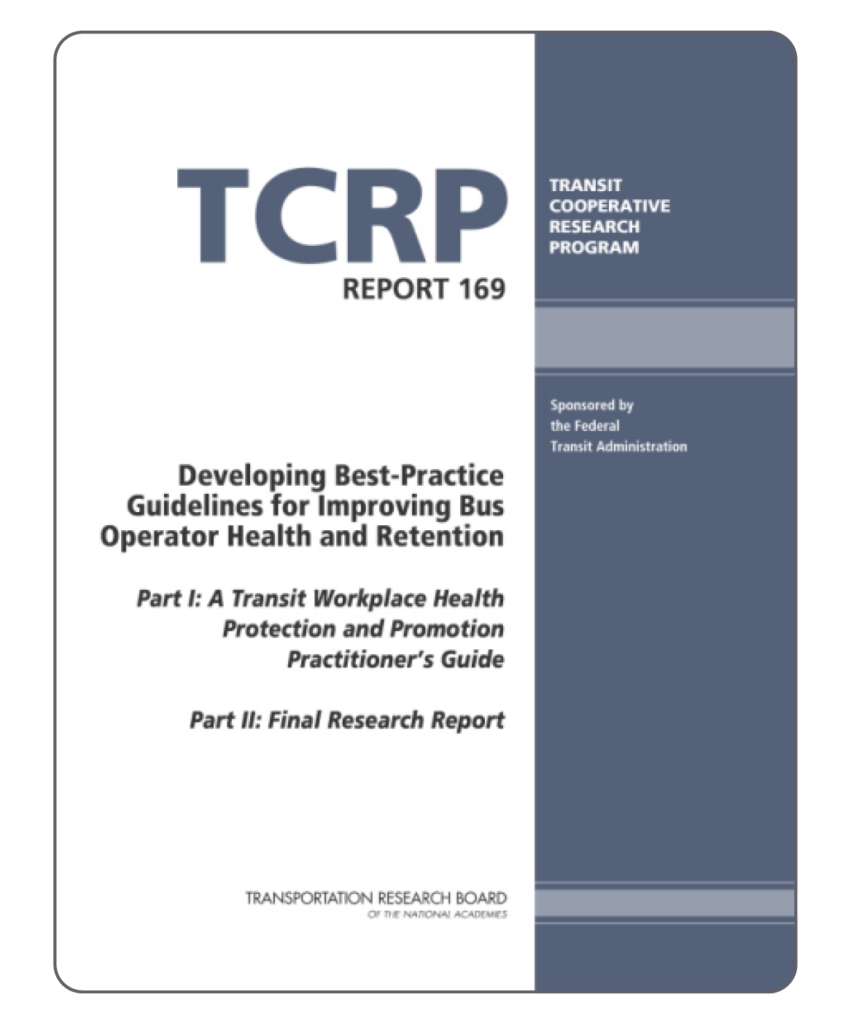
Developing Best-Practice Guidelines for Improving Bus Operator Health and Retention
This TCRP report addresses some of the health and safety issues common throughout the transit industry, and describes approaches that transit organizations in the United States and Canada have taken to address health problems faced by transit employees. The report is supplemented by a presentation, Making the Case for Transit Workplace Health Protection and Promotion, and an Excel worksheet, Transit Operator Workplace Health Protection and Promotion Planning, Evaluation, and ROI Template, that may assist transit agencies with implementing and carrying out transit-specific programs to protect the health of bus operators and other employees.
Transit Cooperative Research Program
August 2014
TOPICS: Policy and Planning , Retention , Safety and Health
Contributor(s): National Academies of Sciences, Engineering, and Medicine; Transportation Research Board; Transit Cooperative Research Program; Robin Mary Gillespie; Xinge Wang; Tia Brown
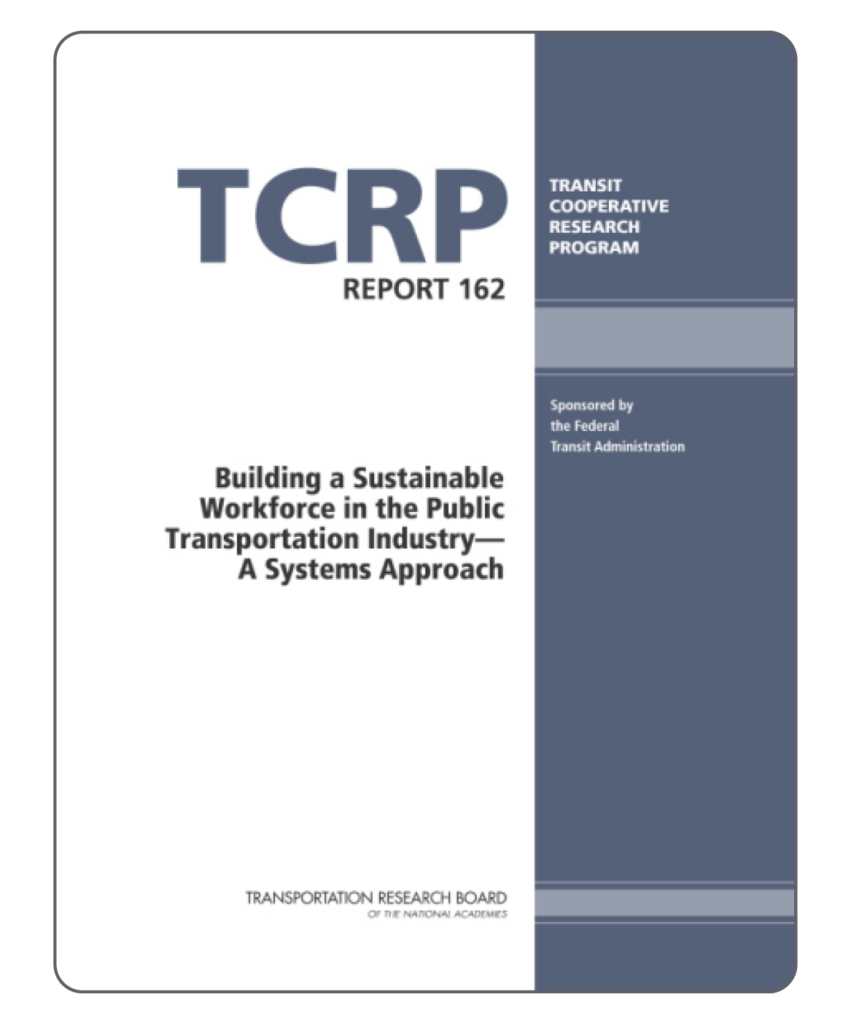
Building a Sustainable Workforce in the Public Transportation Industry—A Systems Approach
TRB’s Transit Cooperative Research Program (TCRP) Report 162: Building a Sustainable Workforce in the Public Transportation Industry—A Systems Approach provides a guidebook that addresses contemporary issues in workforce development, retention, and attraction, and public transportation image management.
The guidebook provides practical tools to transit agencies on a variety of workforce issues including workforce strategies that enhance organizational processes, performance metrics to evaluate the impact of workforce strategies, image management techniques that improve perceptions of the public transportation industry, and benchmarking processes that allow for continuous organizational improvement.
The guidebook is separated into modules that may be used independently or together in the form of the fully integrated guidebook.
Transit Cooperative Research Program (TCRP)
January 2013
TOPICS: Hiring and Recruitment , Policy and Planning , Retention , Training
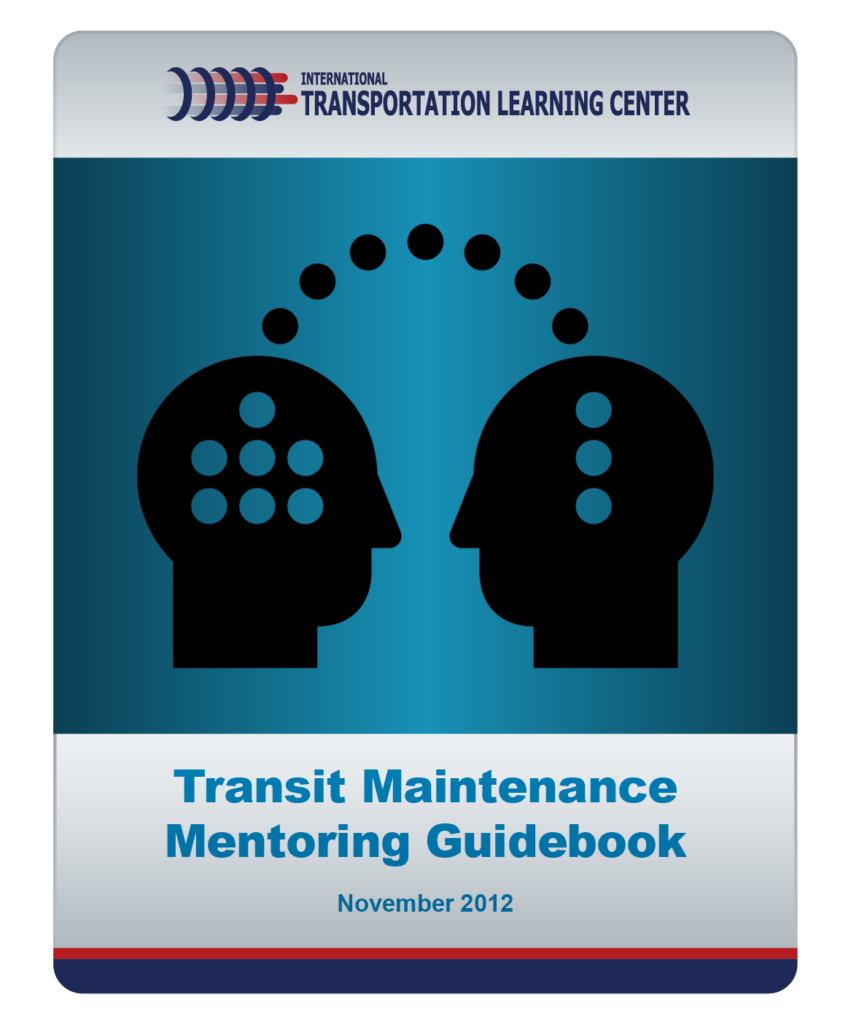
Transit Maintenance Mentoring Guidebook
The purpose of this report is to serve as a guidebook, offering information that transit agencies can use to establish mentoring as a training method with guidance, suggestions, and examples to implement or expand upon existing mentoring programs. It is based on a generic mentoring guidebook developed by the USDOT, modified and enhanced to reflect transit maintenance applications.
International Transportation Learning Center
November 2012
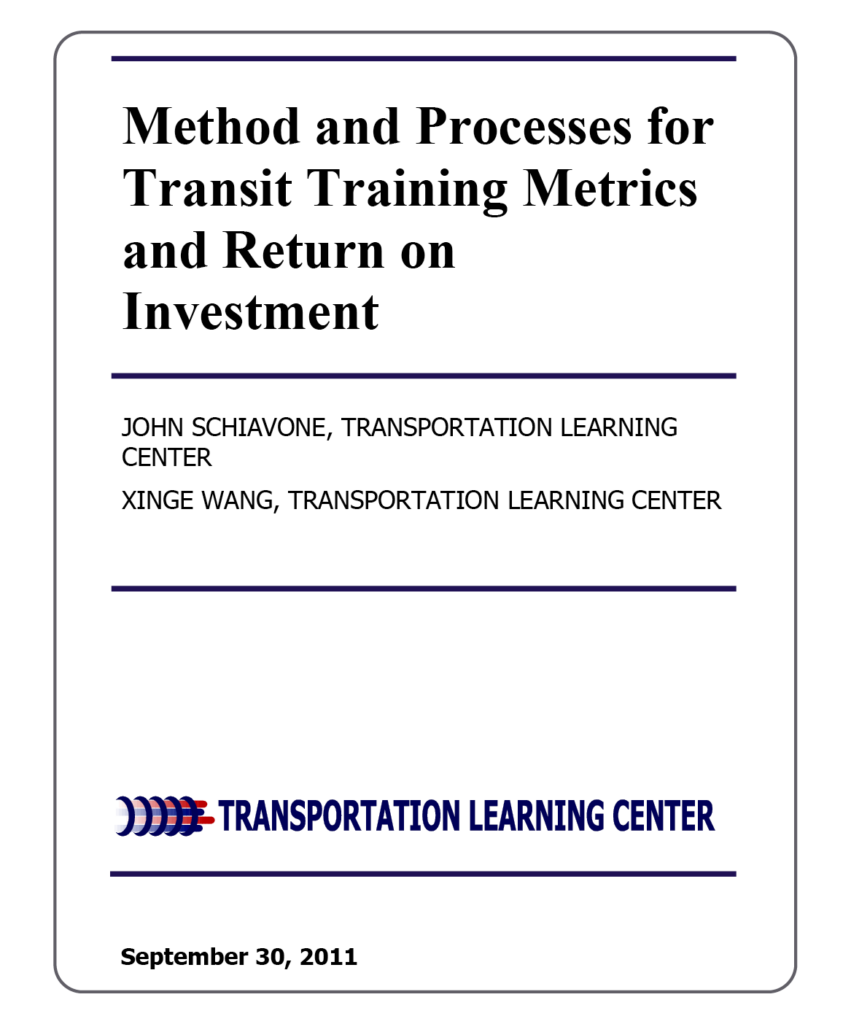
Method and Processes for Transit Training Metrics and Return on Investment
This guidebook was developed by the ITLC to help transit agencies determine benefits and return on investment (ROI) stemming from their training programs.
International Transportation Learning Center
September 2011
TOPICS: Program Evaluation and ROI
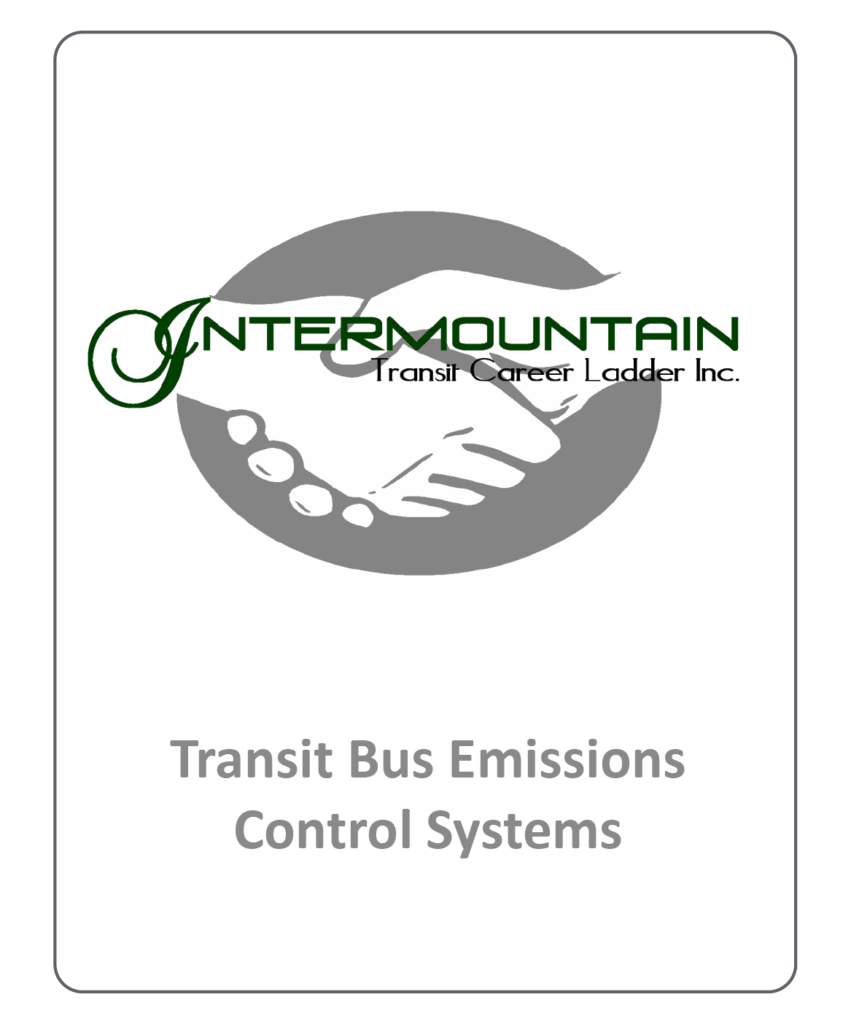
Training Course – Transit Bus Emissions Control Systems
A three-day course designed to deepen bus technicians’ understanding of the operation and maintenance of transit bus emission control systems.
Intermountain Transit Career Ladder, Inc.
January 2011
TOPICS: Training
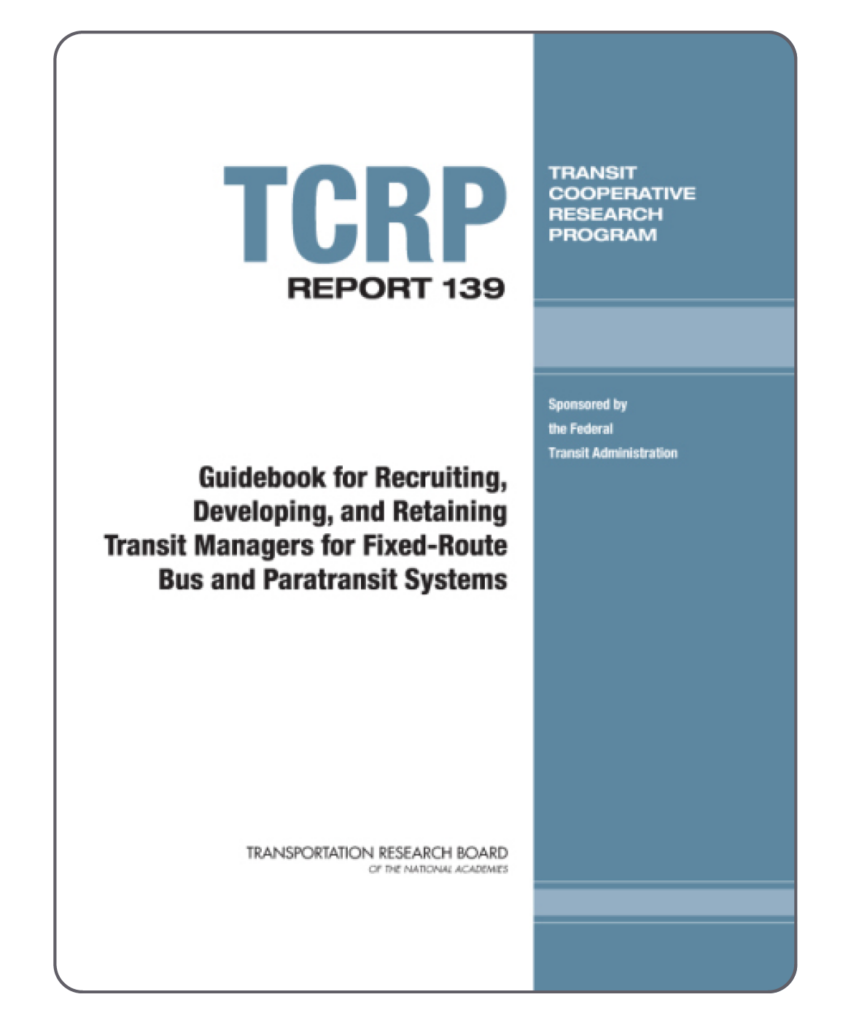
Guidebook for Recruiting, Developing, and Retaining Transit Managers for Fixed-Route Bus and Paratransit Systems
TRB’s Transit Cooperative Research Program (TCRP) Report 139: Guidebook for Recruiting, Developing, and Retaining Transit Managers for Fixed-Route Bus and Paratransit Systems explores resources for fixed-route bus, general public demand response, and Americans with Disabilities Act (ADA) paratransit systems resources to assist in the recruitment, development, and retention of managers.
Transit Cooperative Research Program
March 2010
TOPICS: Hiring and Recruitment , Policy and Planning , Retention , Workforce Shortage
Contributor(s): National Academies of Sciences, Engineering, and Medicine; Transportation Research Board; Transit Cooperative Research Program
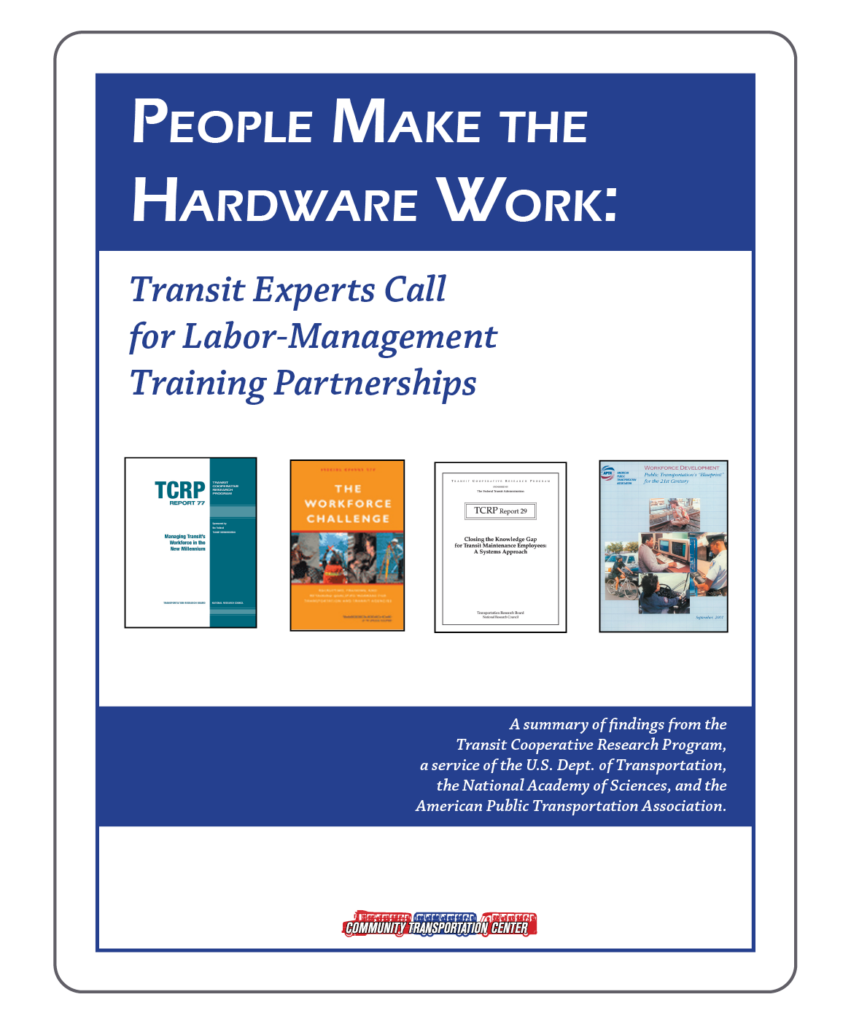
People Make the Hardware Work: Transit Experts Call for Labor-Management Training Partnerships
This short toolkit outlines five tools for success in labor-management training partnerships:
- Unions as Partners
- A Joint Training Strategy
- Empowering the Workforce
- Cultivating a Learning Organization
- Reaching High Performance
International Transportation Learning Center; Transit Cooperative Research Program
March 2007
TOPICS: Apprenticeship , Labor-Management Partnerships , Training
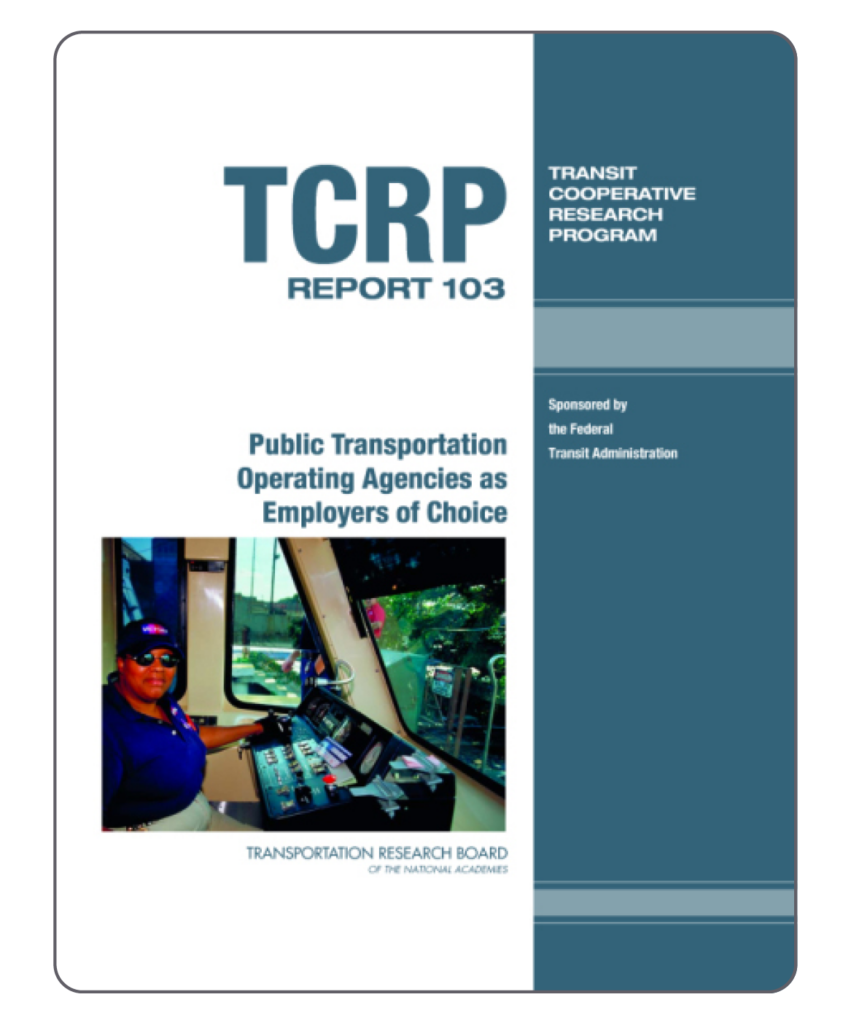
Public Transportation Operating Agencies as Employers of Choice
TRB’s Transit Cooperative Research Program (TCRP) Report 103 documents principles, techniques, and strategies that are used in workforce recruitment, development, and retention. The report includes a companion document, “Communications Strategy and Implementation Plan, Positioning the Public Transportation Operating Agency as an Employer of Choice” that describes strategies and solutions that offer the greatest potential for positioning public transportation operating agencies as an employer of choice.
Contributors: Watson Wyatt Worldwide and Focus Group Corporation
Transit Cooperative Research Program
January 2004
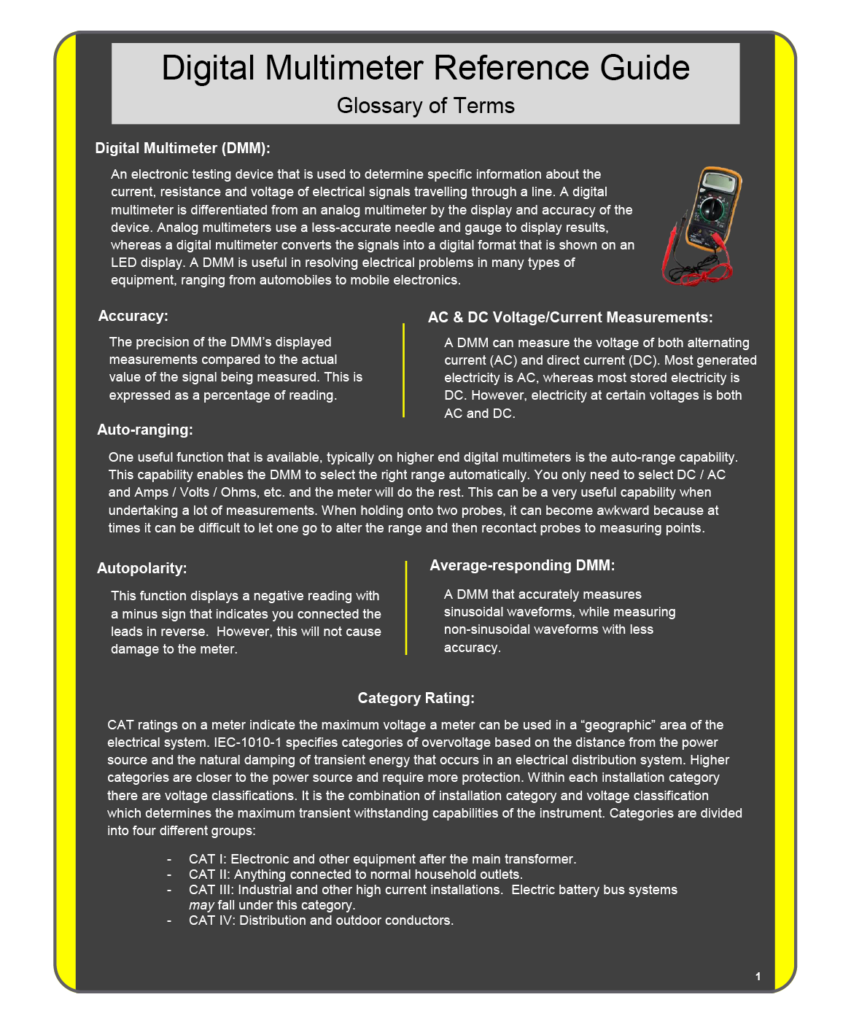
Digital Multimeter Reference Guide
This reference guide explains how to use a digital multimeter, including glossaries, safety precautions, and related resources.
International Transportation Learning Center
TOPICS: Training , Zero Emission Buses
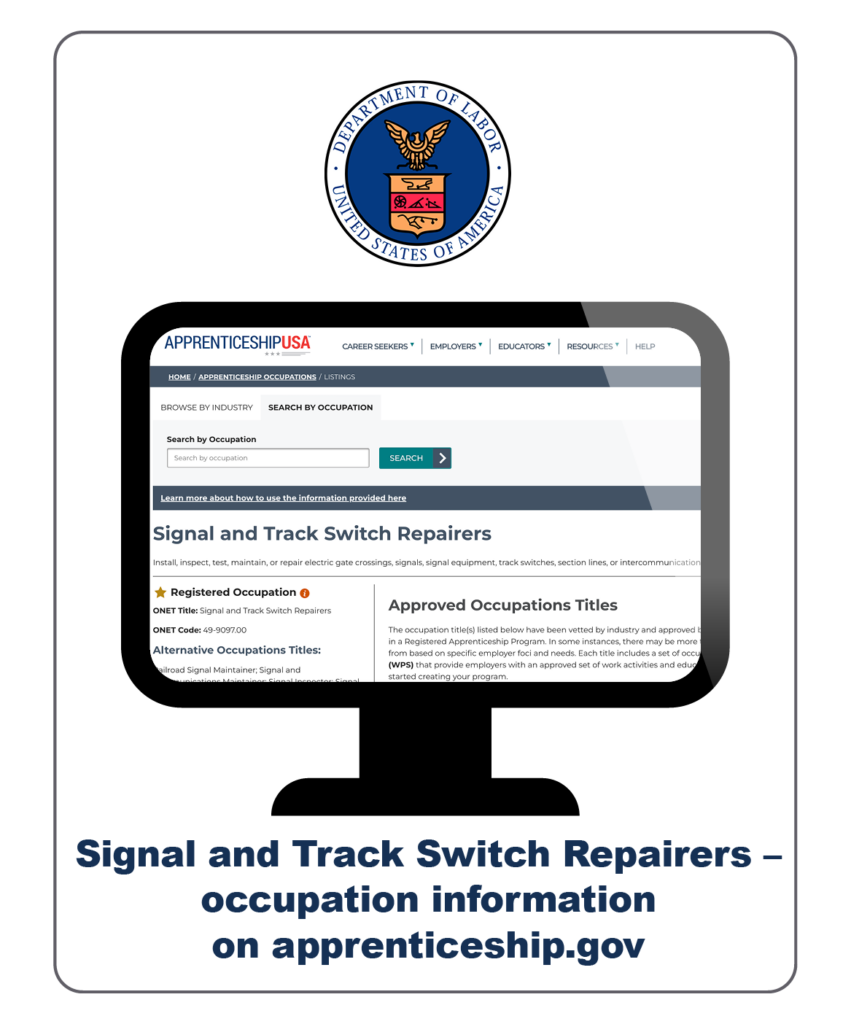
Signal and Track Switch Repairers
This search page on Apprenticeship.gov provides results for approved occupation titles under Signal and Track Switch Repairers, as well as work activities, education, and related occupations.
US Department of Labor
TOPICS: Apprenticeship , Career Pathways







